MOVIE TREATMENT BASED ON “BAUDOLINO” BY UMBERTO ECO
Historical Context
Religion and mysticism prevail in the 12th century; wars are carried out in the name of the first, and imagination is inflamed by the second. It is hard to tell reality from fiction in the stories of those times. Finding the realm of the Universal Religion is alluring to the adventurous minds of regular people and to monarchs eager to dominate spiritually and philander economically.
Synopsis
Adopted by Frederick Barbarossa and growing up at his court, Baudolino learns about the existence of an elusive Universal Religion Realm governed by a powerful king, Prester Johannes. He engages in an arduous pilgrimage to find him and foster an alliance that could strengthen the religious and administrative supremacy of his adoptive father. The pilgrimage to the Realm exposes him to various mono- and pluri-theistic religious dogmas. At the border with the Realm, Baudolino describes strange creatures, falls in love with one and fights the apocalyptic the Magogs.
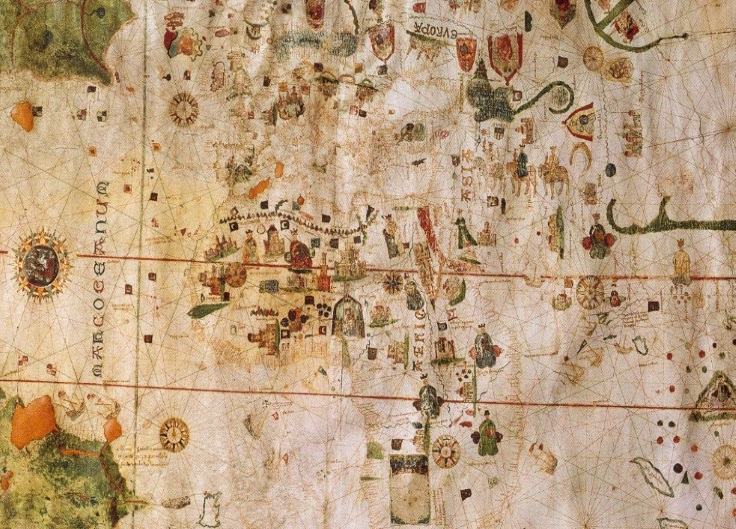
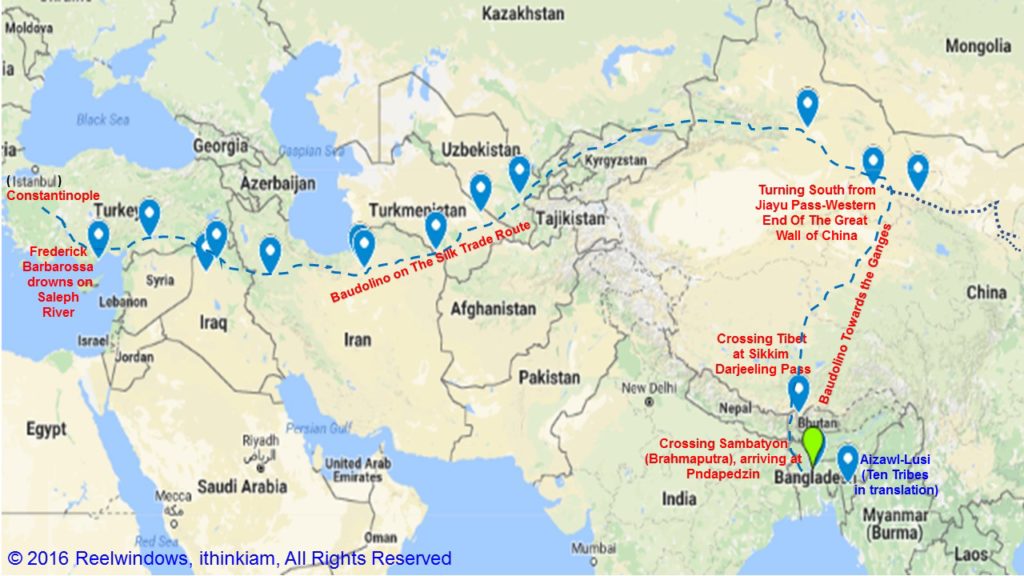
Act 1 Summary. Frederick Barbarossa adopts poor kid Baudolino
At the Morimond Abbey, the 15-year-old Baudolino writes about his vision of a unicorn, the memories of his scornful father and how the Emperor of the Holy Roman Empire Frederick Barbarossa had adopted him. Three years ago, Frederick got lost in the forest, and Baudolino offers him a bowl of hot broth and rest overnight at his parent’s shack. Impressed by Baudolino’s smartness, Frederick offers to his father a golden coin to let him adopt his son; Baudolino will learn and grow-up at the Imperial court.
Beatrice of Burgundy arrives at Rattisbon to marry Frederick. Baudolino is struck by a hopeless love for her and shame towards Frederick.
Bishop Otto of Freising has a grand vision about the end of Frederick’s never-ending wars with the Italian cities: an alliance with the powerful Prester Johannes, King and Priest of the Universal Religion Realm. Baudolino is to find this far East place of religious and administrative harmony. Even if he must invent some specifics, as long as he believes in them, others will believe them true as well, advises Otto on his deathbed.
It is not easy to get Frederick’s attention on the alliance with Prester Johannes. The Italian cities keep shifting their allegiances to Frederick and even between them, and Fredrick is busy waging war to destroy them. Baudolino gets a sword on his 18th birthday anniversary and has to join in Frederick’s wars, starting with the siege of Crema.
Act 2 Summary. Baudolino studies in Paris and fights in Europe
Four years thereafter, Frederick decides that Baudolino should further his education in Paris by studying law, philosophy, astrology and even finances. Baudolino’s farewell to Beatrice reveals that they share a similar emotion; she wants him to frequently write from Paris.
In Paris, Baudolino makes friends with other students and religious scholars, including a Rabbi. They all seem to either know something about the Realm or having a personal interest for it to exist.
A trick is needed though to convince Frederick that the Prester Johannes Realm actually exists. Under the influence of the hallucinogenic green honey, they concoct a letter as if written by Prester Johannes, highlighting his power and the riches of the Realm, inviting Frederick to an alliance. Unbeknownst to Baudolino, the letter is copied by one of his younger friends, a Greek student.
Returning from Paris after four years, Baudolino finds Frederick still angry and in preparations to fight the Italians cities, allied in the Lombard League with the blessing of the Pope.
In 1176, Frederick’s army is defeated in the battle of Legnano, and Baudolino saves his life. On their return to Rattisbon, the wounded Emperor finally listens to Baudolino’s story about the letter from Prester Johannes.
Baudolino and his younger friends accompany Frederick to Venice in 1177, for the peace treaty sign-off with the Pope and the Lombard League. Coincidentally, they learn that an imperial spy had intercepted a letter written by Prester Johannes, but addressed to the Eastern Holy Roman Empire, the Byzantine Emperor Manuel I. Both Fredrick and Baudolino are mighty confused. Upon studying the letter though, Baudolino realizes that it is just a modified copy of his own, and remembers the Greek student Zosimos; he must have copied the letter, and intended to make the Byzantium Emperor the beneficiary of an alliance with the powerful Prester Johannes. Baudolino uses the situation as an argument in favor of the Realm’s existence and emphasizes the danger of Byzantium taking advantage of the powerful alliance. Frederick agrees. He asks for Baudolino letter to be distributed to the European and Byzantium chancelleries and for Baudolino to pilgrim as his emissaries to Prester Johannes.
But Baudolino has to wait for another ten years for an opportune moment to start it. That moment is the 1187 defeat of Jerusalem by Saladin. The Pope is angry and the European Kings unite to starting the Third Crusade. As Frederick’s army marches on land towards Jerusalem, Baudolino’s group navigates to Constantinople, to prepare for the army’s passage through Armenia; he will continue towards the Realm thereafter.
On his way to Jerusalem, Frederick and his army are hosted by an Armenian nobleman, entrusted by King Leo I to protect the Emperor. At the Dadjig castle, Frederick goes for a swim and drowns in the Saleph river.
Act 3 Summary. The Pilgrimage between the Third and Fourth Crusades
Rather motivated by the tragic event, Baudolino carries on to fulfill the deed towards his fathers and teacher Otto; he will also fulfill his own ambition to write a Chronicle. The Armenian nobleman joins the other six pilgrims, afraid of being punished by King Leo I for the Emperor’s death.
The arduous pilgrimage goes through Middle and Far East, following the routes of the Silk Trade and supposedly Alexander the Great’s military campaigns. On accounts of the latter, they reach the Great wall of China, but realize that they have to turn South and over the Tibet mountains. The six-year pilgrimage exposes Baudolino’s group to the middle age mindsets of mono and polytheistic beliefs: Greek, Muslim, Zoroastrian, Buddhist and Animist. Baudolino keeps writing in what he believes to be his Chronicle, mixing reality with imagination. The latter takes off once the group crosses the rabbinic Sambatyon, actually the Brahmaputra river.
The pilgrims arrive at the border with the Realm, the city of Pnadpetzim, populated by poor, sick or handicapped people. Organized in “families”, each with distinctive physiognomy and tattoos, they live in an apparent harmony, devoid of hate, but full of spate. They claim to be equal because they all think and know about each other thinking wrong.
The pilgrims are shaken by a reality unlike the one they described in the letter. Baron Ardzrouni gets furious learning that the letter was concocted; he adamantly questions now the existence of the Realm. Baudolino convinces all to keep their belief in the Realm unabated, and look at the creatures the way he will describe them in his Chronicle, mythical in appearance and harmonious in thought. Baudolino feels entitled to follow Otto’s advice to invent some “specifics” about the Realm, if they serve a good purpose. Moreover, he argues, they could better help these people thinking of them as special instead of unfortunate.
On account of them wanting to be mentioned in Baudolino’s Chronicle, the others accept to “see” the Pnadpetzim people as mythical creatures resembling their tattoos. The pilgrims blend in the Pndapetzim life, while waiting for the opportunity to cross the border to the Realm.
Pnadpetzim is governed by a Deacon, Prester Johannes’s son, and controlled by an elite of administrative Eunuchs and military Nubians. The administrative control is maintained under the pretense of an imminent invasion by the apocalyptic Magog.
The Eunuchs keep postponing the audience of the pilgrims to the Deacon and finding reasons why crossing the border is not possible. Worse off, the apocalyptic Magogs seem to have gathered again behind the mountains, and about to attack.
While exploring the outskirts of the city to find the passage to the Realm, Baudolino encounters a beautiful girl accompanied by a unicorn. The girl is intelligent and, as an adept to the historical figure Hypatia, preaches the Philosophy of One. Baudolino is disconcerted by her philosophical arguments, and even though he discovers that she is not entirely human, falls in love with her.
However, he has to give up his feelings of love for the duty of fighting the Magogs. He joins the other pilgrims in training the creatures to defend the city; their special abilities are used to devise a battlefield strategy.
The Magog attack and the defending strategy fails, as the creatures start fighting each other instead of the enemy. The pilgrims must flee, and Baudolino learns that the girl and her Hypatian group had been saved from the Magogs.
Only three pilgrims remain to take the maritime way back to Europe. Baudolino ends up in Constantinople of 1204 when the Fourth Crusade armies had just burned down the city. Baudolino ends writing his Chronicle by noting that for him, perception is reality. Either reverie or truth, he sees Hypatia and their child coming towards him; the burned turrets of the minarets restore themselves and the golden cupola of Santa Sophia church shines in the sunrays.
TREATMENT SCENES
May 1156. Baudolino writes down the Unicorn vision
INT. NIGHT. MORIMOND ABBEY SCRIPTORIUM.
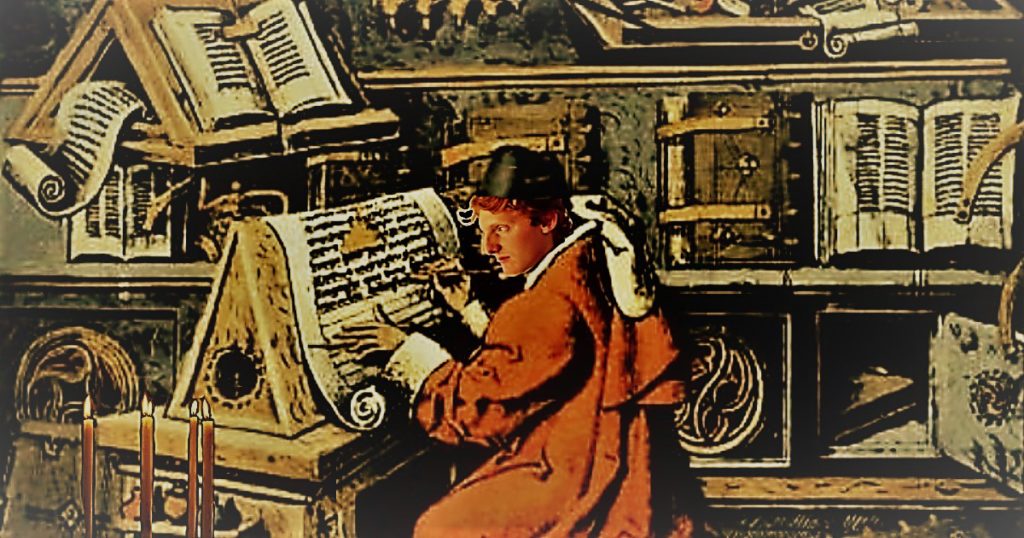
The church scriptorium is silent and dark, except for a desk lit by candles. The 15-YEAR-OLD BOY Baudolino writes on a parchment. The letters …slowly morph into the leaves carried by a gust of wind into an eerie forest. The leaves settle on the ground and, from the depths of the forest, a snorting, small, white unicorn paces into the clearing lit by the moon. The 12-YEAR-OLD Baudolino looks in awe at the unicorn who trots and playfully invites him to follow and play. Following, Baudolino pulls away the branch of a tree which, upon being released, springs back and hits him in the small of the neck…the stick his father, 50-YEAR-OLD MAN, hits him with while lamenting the bad luck of having a liar of a son, “…daydreaming and telling funny stories, instead of milking the cow, moving the hay in the shed or chopping the wood for the fire, all this as the day is almost over and the night is getting colder,” he concludes.
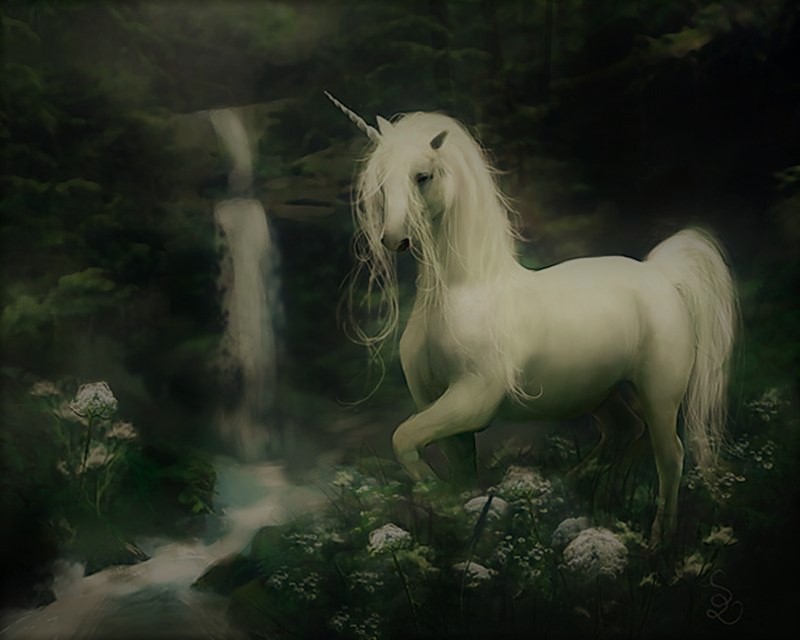
Baudolino stops writing, looks up thoughtful, then resumes… He runs out of the poor house, almost a shack, to escape further beating and scorn. Farther away into the woods, he stops to catch his breath.
April 1155. The Holy Roman Emperor gets a bowl of broth
EXT. NIGHT. FORREST NEAR TORTONA
The wind plays with the branches and leaves of the trees. Moonrays piercing the clouds light the drifting sheets of the heavy fog. The snorting of a horse startles Baudolino; looking over, he gradually distinguishes a huge one ridden by a big, armored, bearded, 32-YEAR-OLD man. The man seems to be lost, reigning in the horse’s harness to stop.

He looks down, in search of a trail, then up and sees a kid watching him from behind a tree. Baudolino, is rather curious than afraid. The horseman addresses him in German and the kid makes an effort to understand and respond. In an approximate German, and with body language, he offers protection at his parent’s shack against the thieves roaming around; there is also the prospect of a bowl of hot broth and rest overnight. The man accepts the offer, pulls him up on the horse and praises his hospitality and attempts to speak some German.
EXT. NIGHT. SHACK IN THE FORREST
At the shack, Baudolino’s father is about to get a load of hay in the fork but, startled by the apparition of the threesome, lets it fall on his head; removing it to better see, he ignores the horseman and continues to scorn his son from where he left it earlier. This time though is about his son not staying away from the war raging around the woods and, even worse, for bring it in his yard; he laments that people like the rider are often the nobleman’s tax people, taking away his haystack. The horseman listens to the kid’s barely understandable translation and introduces himself as Frederick I, the Emperor of the Holy Roman Empire. He is grateful for their hospitality and offers to pay for the overnight rest. Agape at first, then hearing the translation, the old man brightens up a bit and introduces himself as Galiaudo the father of the good for nothing son; he then engages in bargaining for the broth and hay. The kid mimics the translation, and the Emperor gives them his dues then rides towards the shed. The father and son look at the two golden coins with gleaming eyes, like they’ve never seen such a thing before.
April 1155. Frederick Barbarossa adopts Baudolino.
EXT. MORNING. BAUDOLINO SHACK
In the sunny morning, a small wind blows the leaves in the front yard of the shack. The old man gets some hay from the stack with the fork and feeds Rosina, the cow.
Sitting on logs, the Emperor and the kid eat a meager breakfast while the kid describes his vision of the unicorn. He embellishes the story by adding that Saint Baudolino appeared to him, as well, and predicted the Germans’ victory in the siege of Terdona. If the Emperor wants, he can accompany him to his camp and tell to both the attackers and sieged people about this prediction; this would embolden the attackers and weaken the defenders. “Then, we’ll have to call you Baudolino,” says the Emperor laughing. The Emperor is happy to take the offer on account of it saving so many lives. He then turns to Galiaudo and tells him that his son deserves recognition for his wit and, better yet, an education at his court; he is ready to adopt the kid. The Emperor wins over the reluctance of the suspicious Galiaudo by giving him five golden coins to better his life as well. Speechless at the sight of the golden fortune in his hand, Galiaudo mumbles then, more to himself, that feeding a good for nothing son is no reason for keeping him around… The leaves blown by the wind morph back into the…
May 1156. Bishop Otto pinches Baudolino’s ear
INT. NIGHT. MORIMOND ABBEY SCRIPTORIUM.
…letters written by Baudolino on the parchment.
The door of the scriptorium opens. Baudolino hides the parchment in a haste and pulls a book in front of him, as if studying. Bishop Otto, a 60-YEAR OLD MAN approaches his desk and jokingly pinches Baudolino’s ear pretending to punish him for studying this late at night. Serious then, he praises Baudolino’s efforts and progress in learning Latin and Greek; this is the language in which the life and glory of the Emperor will be described in the Chronicle that he is writing and Baudolino will translate. “Go to sleep now,” paternally advises Otto, “tomorrow we travel to Rattisbon. The Emperor wants you to listen to the debates in the council. And by the way, you will also study with Canon Rahewin in my court quarters”.
June 1156. Baudolino calls the Emperor a weasel
INT. MORNING. RATTISBON FORT DORMITORY
The small common dormitory has few empty beds. Baudolino sleeps in one, on a worn-out mattress with straws protruding from it. The door opens and Canon Rahewin loudly teases him that the Holy Roman Emperor is waiting for his illustrious presence. Sleeping on a Baudolino opens one eye first, then both, and jumps off the bed.
INT. MORNING. RATTISBON FORT COUNCIL ROOM
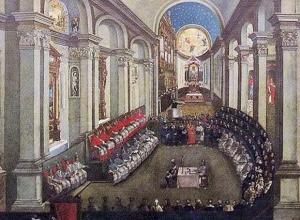
In the council room, a BARON adviser, 50-YEAR OLD, expresses his anger at the way the Pope had treated the Emperor at the 1155 coronation; instead of it being on the Holy Sunday, it was on Saturday; instead of the main altar, it was on the side one; instead of anointing with olive oil sweetened with balsam, it was the baptism one. “Why the baptism oil? Like he needs to be kept away from the devil’s temptation to sin? What is the message here?” concludes the baron almost out of breadth. Many OTHER NOBLEMEN murmur and nod in agreement. Frederick chuckles at and looks at Baudolino sitting next to him. “Why do you chuckle father?” he asks. Frederick explains smiling that a more solemn coronation would have made the Pope more important than his direct lineage from the Germanic princes. “You are sly as a weasel!” says Baudolino standing-up. “You know that this turns the Pope into a simple notary, who just records your status of Augustus crowned directly by God. You didn’t need his coronation,” he concludes smartly. Frederick and the barons lighten up and laugh. The Emperor stands up and placing his hand on Baudolino’s head praises the way he’s looking at things, jokingly advising the barons to take good example. Smiling from his pew, Otto waves at Baudolino to join him. The mood of the barons had changed for the better, and Frederick is asking for an account of the preparations for his wedding with Beatrice, the Princess of Burgundy. Otto is about to talk with Baudolino but he is hit by a sickly, coughing fit. Baudolino comforts him while listening to the councilors’ gossip about the beauty of Princess’ dowry rather than that of her physical good looks.
June 1156. Beatrice arrives at Würzburg to marry Frederick.
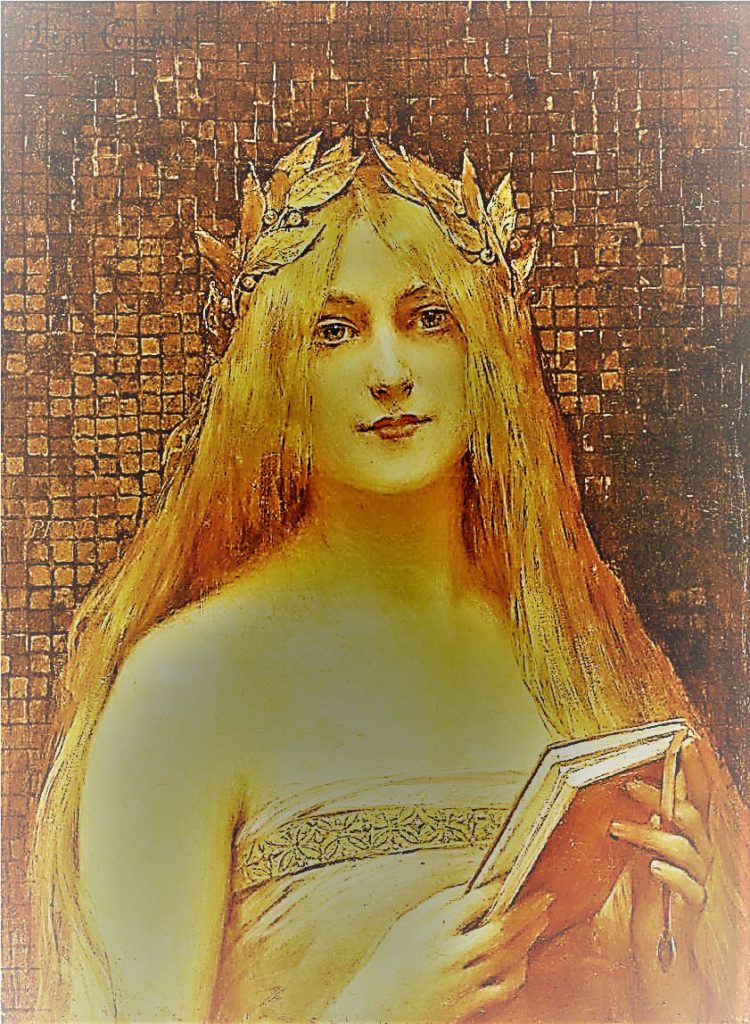
EXT. DAY. WURTZBURG CASTLE
The 13-YEAR-OLD Princess Beatrice of Burgundy and her ENTOURAGE arrive trough the portal of the castle’s inner court. They make their way through a happy CROWD waving hands and flags. Beatrice, a very young and beautiful woman, rides a white horse. Frederick receives her and introduces Baudolino as his adopted son. In a simple but gracious way, Beatrice touches Baudolino’s cheek in acknowledgement. A flock of white pigeons fly by, some flapping their wings above the heads of the small group, while Baudolino looks stricken by Beatrice’s beauty. Otto senses what happens and jokingly pokes him to wake up and knee down to greet the Empress, and he does the same. Amused, Frederick offers his arm to Beatrice and accompanies her up the stairs and into the castle.
June 1156. Baudolino is stricken by love
INT. DAY. WURTZBURG CHURCH
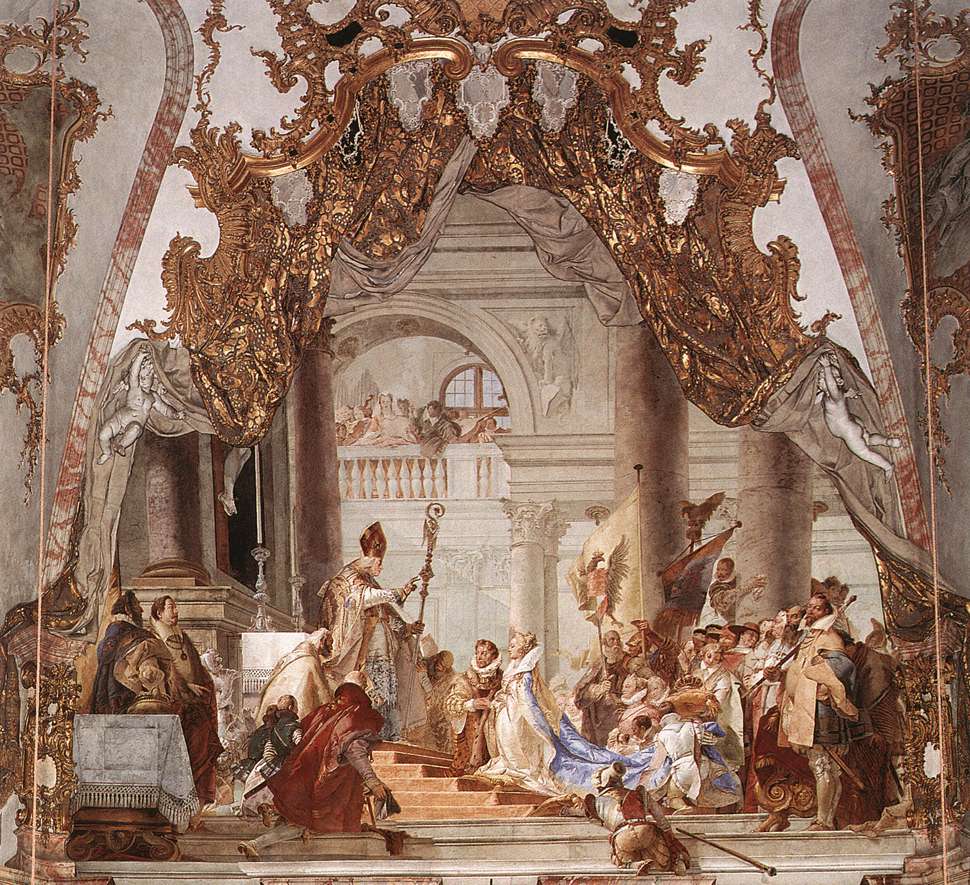
In the sumptuous church, the 56-YEAR-OLD Bishop of Würzburg officiates Frederick’s marriage with Beatrice. The court’s NOBLEMEN AND WOMEN attend the event. Under the magic of the bride’s beauty and the harmony of the music, Baudolino’s looks at the shadows of some birds projected on the tall stained-glass windows which…fly into the church and around Baudolino. He offers his glowing heart for the birds to take it to Beatrice. She does and looks at Baudolino smiling lovingly while the birds fly back out through the windows and… the sudden change in the rhythm of the ceremonial music awakens Baudolino from his reverie.
November 1158. Otto wants Baudolino to find the realm of the Universal Religion
INT. DAY. RATTISBON CHURCH QUARTERS
In the office with shelves loaded with books, sitting at a desk, the 40-YEAR-OLD MAN Rahewin writes on a big book. At another desk also loaded with books, Baudolino reads from one whispering in Latin. Someone is coughing, and Baudolino and Rahewin look at each other. Baudolino stands up and walks to the adjacent room.
Otto lays in bed, coughing; he looks older as his health deteriorated considerably. His chest is covered by few red spots. Baudolino asks if he wants to call the doctor. Otto doesn’t and complains that the leeches they put on him drew so much blood that little was left. He calls for Rahewin to join them and listen to his last wishes. Rahewin is to continue writing the account of the Emperor’s reign and complete teaching Baudolino the Latin and Greek. “Two years,” “and six campaigns to quell the Italian revolts,” the Bishop says, “and destroy cities like Milan, Terdona, Pavia, Bologna, Tuscany and Tivoli. But that’s in Europe only. Frederick will have to deal with the Eastern Holy Empire, Byzantium. He just ceased recognizing Manuel I, and declared himself the sole Augustus of the Whole Holy Roman Empire. That doesn’t bode well; he may need to siege Constantinople next. That’s going to stir the Muslims in turn. On the religious front,” he carries on, “our Pope is old, and we’ll have not only the ambitions of a new one, but an antipope that Frederick will probably anoint to recognize his supremacy over the church. For now, the distant Russian Orthodoxy is silent, but Russians are still capable of surprises. There is too much of everything,” concludes the Bishop with a weaker voice. “Puer dilectissime”, he says looking at Baudolino, “go find the Realm of the Universal Religion where Prester Johannes holds the secret of the harmony between Religion and State. Frederick must build an alliance with him, for the harmony in the Sacrum Imperium to be possible. But first Baudolino, you need to go study in Paris, learn history, philosophy and see how different people are in language, life and hope,” concludes Otto, his voice almost a whisper now. He then lays immobile. Saddened, Rahewin looks at Baudolino then nods. Baudolino is about to close Otto’s eyelids, but Otto comes back to life in a surge of energy: “Remember the kingdom of Presbyter Johannes. You rascal had invented many stories that the emperor liked. So then, if you don’t have all the specifics of that realm, invent some, believe in them, and they’ll come true. Otto exhales heavily and stops breathing.
March 1159 Baudolino gets a sword
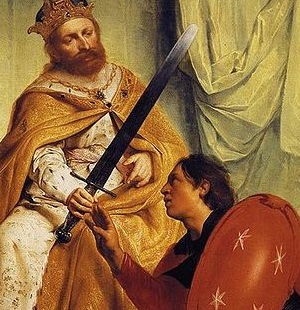
Frederick opens a big, ornamented box and gets a sword from it. The Emperor praises Baudolino, on his 18th birthday anniversary for what he learned from Otto, Rahewin and their books. “It is time for you to make history on the battlefield,” he says handing the sword to Baudolino. Standing up and looking at Canon Rahewin then, he recounts how he conquered Bologna, how its noblemen recognized his divine right of protecting all the Italian cities and promised to break down the walls of their fortresses. “Why did they need them if I was their protector? Did they do it? No, they didn’t!” he says, angry. “Thus, I am going to give them a lesson, starting with Crema!”
December 1159. Frederick, Henry the Lion and Beatrice at the siege of Crema
EXT. DAY. HILL OVERLOOKING CREMA FORTRESS
Mounted on black horses, Frederick and HENRY THE LION, duke of Saxony and Bavaria, watch the progression of the Crema siege from a knoll overlooking the fortress’s valley. FEW KNIGHTS and CLERGIMEN surround them. Two of the knights animatedly discuss and point down at the fortress and infantry positions in the valley. They split and ride their horses down into the valley.
EXT. DAY. CREMA FORTRESS WALLS.
Arrows and spears fly between the ATTACKERS in the siege-towers and the DEFENDERS on the fortress’ crenels. The heavy stones catapulted by the defenders break some trusses of the tower which starts to wobble.
EXT. DAY. HILL OVERLOOKING CREMA FORTRESS
From the valley, two riders gallop their horses up towards the knoll. Baudolino, reaches Frederick and Henry the Lion. He advises the tower to be pulled back or else it will be destroyed. Angry, the Emperor nods at Henry in agreement and orders the signal to pull the towers back. “Tie-up the prisoners to the towers,” he orders to the other rider. “They won’t dare throwing the stones at their own.” Baudolino and the rider look at Frederick, astonished by the order, then turn their horses to gallop down.
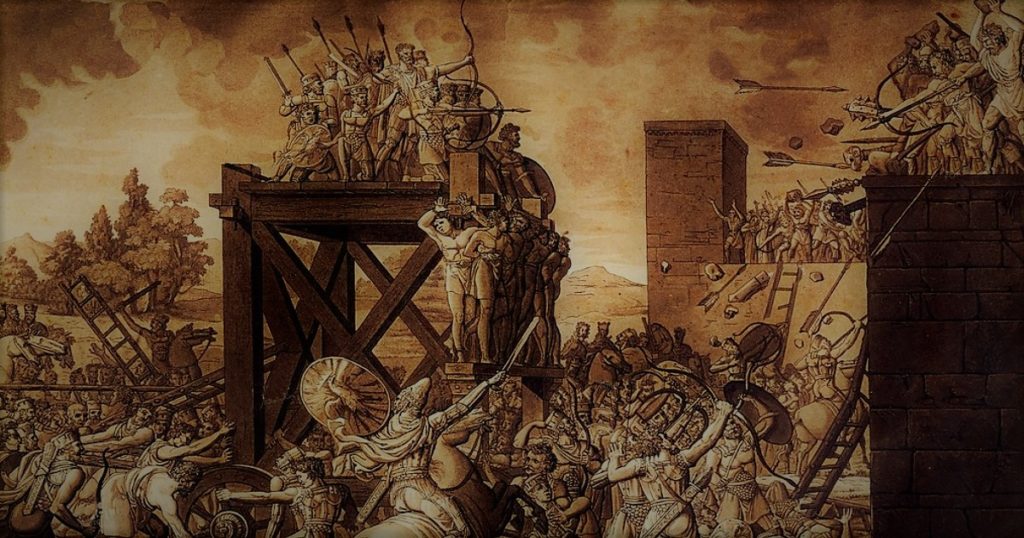
INT. AFTERNOON. IMPERIAL TENT
Frederick, Beatrice and Henry sit on chairs watching a fire. Baudolino enters the tent in a hurry. He bleeds from a wound on his cheek; distressed, he recounts that the tied-up prisoners were shouting at their own people to keep stoning the tower, and that’s what the enraged defenders did. In a fit of wrath, looking at the fire, the Emperor orders for the remainder of the Crema prisoners to be burned alive in front of the walls. Baudolino vehemently argues against it, what is it for? The defenders have many Imperial prisoners and they will be killed in revenge. “So be it, we are at war,” sternly states the Emperor standing up. Beatrice does the same and looks in turn at Frederick, then Henry and Baudolino; the latter two are dismayed but remain silent. Baudolino looks at Beatrice who holds his stare.
January 1163. Frederick sends Baudolino to Paris
INT. RATTISBON PALACE. DINING ROOM
Beatrice gently feeds her BABY DAUGHTER at the dining table. Frederick and Baudolino are about to finish dinner. Frederick throws his napkin on the table, stands up and, pacing up and down, laments the three years in which he did not see any effects of Crema’s destruction: Milan and other Italian cities still disobey him. Why some Italian cities recognize him while other do not, he wonders. “Barbarians, with no respect for their Emperor! I had to destroy Milan, to stand as an example to all!“ he says to Baudolino. Baudolino calmly comments that the Italian cities’ trade interests are not only different, but continuously changing as well. Changing from allegiances between them, to fighting each other. “So,” he concludes, “even the ones recognizing you today, will turn against you tomorrow.”
Beatrice follows the discussion by looking in turn at Frederick and Baudolino, then at a NURSING WOMAN to whom she hands over the baby.
Fredrick pensively acknowledges Baudolino’s point. Changing the topic, he recalls Otto’s wish that Baudolino studies in Paris. He sadly recognizes that his duties and the permanent wars had prevented his access to the luxury of superior knowledge. Warriors, monks, and peasants is the world that he inherited. But he sees that the law, philosophy, the earthy mechanisms and even the movement of the stars are becoming equally important. And ending on a humorous note he adds, “and the movement of the money, because that’s where we’re getting the money for our wars.”
Baudolino stands up and reminds him about Otto’s vision about the alliance with the Universal Religion Kingdom. “Knowledge first, diplomacy next,” says Frederick smiling. Baudolino concedes and expresses his gratitude to Frederick. Beatrice stands up and excusing herself asks the favor of Baudolino accompanying her to her quarters.
At the door of her chamber, Beatrice asks Baudolino to frequently write to her about his life and studies. “I do not really want to go,” says Baudolino blushing and looking at her in a way that makes her blush. Realizing that his deep emotions betrayed him, Baudolino drops on one knee and, looking down, promises to write. A bit confused, Beatrice touches his chin to make him stand up. She smiles sweetly at him, and after a brief moment, as she slowly turns to enter the room, their lips touch as by accident; they are both shocked by the happenstance. Beatrice rushes into her bedroom and closes the door. Frozen, Baudolino looks at the handle of the door slowly, slowly closing. the
March 1163. The class room at the Abbey of Saint Germain
EVENING. INTERIOR. THE ABBEY OF SAINT GERMAIN
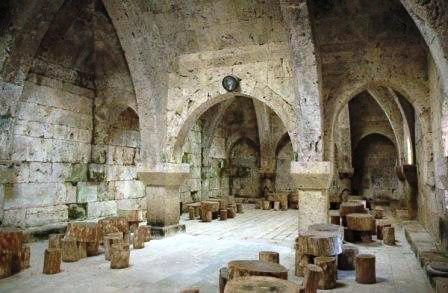
In the abbey’s class room, STUDENTS of various ethnics heatedly debate the topic of which religion holds the truth of life. A PRIEST-MASTER walking among them steers the conversation, asking questions. The students sit crouched on bunches of straw, pens and paper on their lap or on the side, and argue with strong voices and ample body language.
Baudolino wraps a blanket around his shoulders and listens to the arguments. It is cold in the room and steam is coming out from their breath and talk. To the left of Baudolino, a STUDENT WITH ARABIC COMPLEXION writes verses in Arabic, impassible to the debate. The priest-master dismisses the class, the students stand up, bag their papers while continuing to argue. Baudolino nudges the RED-HAIRED STUDENT, still sitting behind him, who was watching intrigued at the Arabic verses. Daydreaming like, the Arab student adds a new verse line. The red-haired student kicks the leg of the Arab rather forcefully. They all gather their belongings and leave the class room. The open door reveals a calm, snowy evening and a thin layer of snow on the cobblestone of the alley.
March 1163. Baudolino, Abdul and the Poet go to the tavern
EXT. WINTER EVENING. ROAD TO TAVERN
Slipping on the road and playfully bumping into each other, the threesome approaches the entrance of the Les Croix de Fer tavern. Two heavy iron crosses adorn its entrance. The students get inside.
INT. LES CROIX DE FER TAVERN
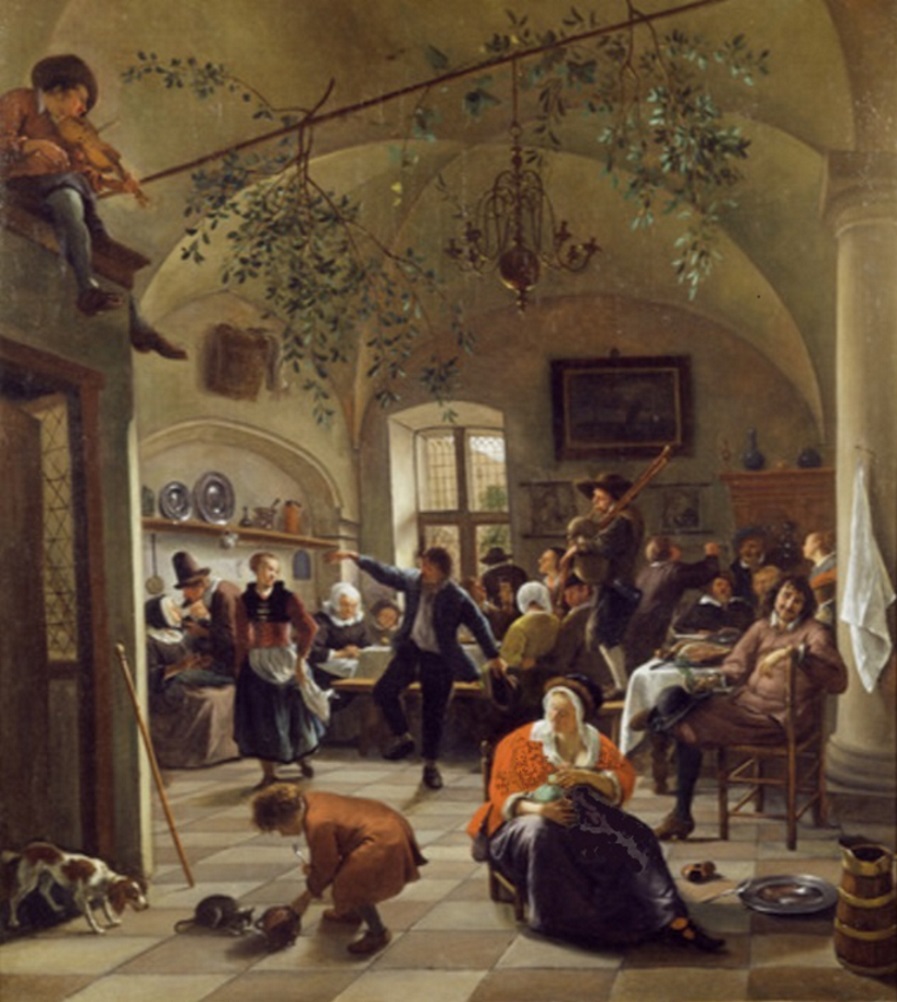
The tavern is smoky and noisy. PATRONS loudly talk and laugh mouthful, one mimicking a dance at the tune played by a VIOLONIST. Bosomy WAITRESSES busily serve food and drinks. The students are regular patrons and as soon as they sit at a table, a waitress brings them drinks and chat in Sinte, a gypsy French dialect. The redhead student, gulps from the can, knocks it down on the table and, somewhat aggravated, says that he always wanted to write poetry. But his father wouldn’t let him to, he wanted his son to be a military man. The Arab modestly explains that he writes love songs dedicated to a woman he is longing for. “Where is she now Abdul?” asks Baudolino. Abdul sighs profusely and takes a hearty gulp of wine instead of responding. Baudolino nods acknowledging the silence by raising his mug then waives at the other to draw their heads closer. “My beloved lady, I know where she is, but I had to go away, rather than closer,” he says struck by emotions. Then, recovering, he straightens up and declares with a firm voice, “But finding the realm of the Universal Religion, is what I really want. I owe it to both my adoptive father, and teacher Otto.”
March 1164. The students share a room
INT. NIGHT. ROOM IN PARIS
In a barely furnished room, Baudolino sits at a table by the open window. Wrapped in a blanket, melancholic, he watches the moon lighting the roofs of the houses at the outskirts of Paris. The profiles of a flock of bats flying by are projected over the full moon. They…fly into the room and their shapes morph into the… letters of the letter that Baudolino is writing to Beatrice. He thinks and writes down what Beatrice would like to read, while actually remembering the realities of his life in Paris. “The class room is cold and we are there for long hours” …drinking together with his friends at the smoky tavern Baudolino waves at a waitress as if to whisper her a secret. Jokingly he takes a good look at her breasts instead, she whacks him in the head and turns around offering her butt for a pinch…“and the exercises in rhetoric that we have in the class with the students from different countries are difficult” There is laughter, more drinking and ample body language about women’s endowments. “… I have made two friends, The Poet, son of a German knight, and Abdul, born in Syria.”… Baudolino proudly points out at the fresh scar on his cheek and… in bed with a MATURE WOMAN, surprised by the unexpected return of the woman’s HUSBAND…“And I share a room with them, sometimes studying together late at night.”…a BIG, FAT BUTCHER, with a blood-stained apron and a hook in his hand…it’s also cold here, but at least we have a stove.” …chasing Baudolino who grabs his clothing running towards the window to jump out; not quickly enough though to completely avoid the butcher’s hook slashing his cheek…”And feeling lonely sometimes.”…and the letters morph back into the bats who fly out of the window…and away into the night, in the tune of a love song.
Abdul sings a love song accompanied by his cittern:
“O my love, I call you, My mind turns insane, My yearning clouds the sun”.
In the middle of the room, flames glow in the heating stove. Baudolino wraps the letter while The Poet, laying down on the couch, lets a tear run down his cheek.


Moved as well by the sweetness of the song, Baudolino asks Abdul where his inspiration is coming from. Abdul stops singing, then sighs looking for a while at the glowing flames. The flames turn into the…



…glaring sun of the desert, as Abdul scrutinizes an approaching caravan. When it gets closer, he waves greeting, as his attention is drawn by the decorated shugduf on the back of a camel. At close range, his glance locks on that of the veiled woman inside, who partially and briefly uncovers her eyes and the glaring rays turn…back to the stove’s flames. Abdul wakes up from his reverie and pulls a bag from under the bed, and opens jar from it; still dreamily, he dips a stick in the jar, then licks the greenish, gooey stuff on it. The Poet sneers: “He is on heat, on the hot dunes of the desert, peering at his lover’s undulating buttocks. Why don’t you go there?” he asks, but Abdul seems to be in another world. Prompted by The Poet’s question Baudolino answers as if struck by an idea: “We all should go, there.” “Oh yeah? And do you know which there is?” mocks The Poet by crossing his arms pointed in opposite directions.” And money, money from where?” he continues smartly. “We go East, and I can talk the Emperor into giving us the money, we’ll be his emissaries to the Realm. But first, we have to learn more from the monks and books in the abbeys,” concludes Baudolino. Abdul says whispering, “St. Victor Abbey.”
April 1164. Rabbi Solomon is dragged to Les Croix de Fer.
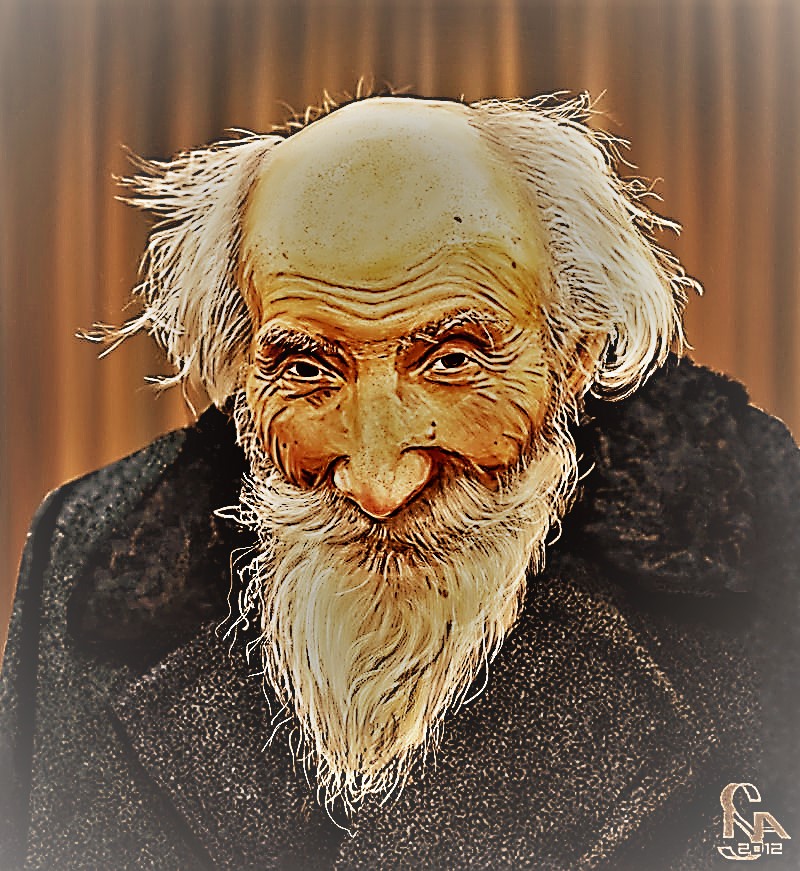
EXT. AFTERNOON. ST. VICTOR ABBEY.
Baudolino and The Poet follow a PRIEST through the columns of the St. Victor abbey. At the entrance of the library crammed with book shelves, the priest points to a darker corner where a BEARDED 40-YEAR OLD MAN is hunched over a manuscript. Baudolino approaches the small desk and bends over to draw the man’s attention; the Rabbi jolts awakened from his snooze and hurriedly closes the manuscript as if to hiding its writings. Looking at Baudolino he explains,” This is a Hebrew book, not for anyone to see,” and after a pause, friendlier, “But who are you?”. Baudolino flatters him for being an eminent scholar and answers that he and his friend are interested in the story of the ten lost tribes of Israel, and how far East they went.
“Indeed, East and far, where else could they have gone to move away from harm. “But where did they settle?” asks Baudolino. “The sacred texts speak about a mysterious kingdom, a land blessed by heaven, where life is peaceful, never troubled by any crime, where the streams flow with milk and honey. This realm is governed by a priest, and also a king,” emphasizes the Rabbi, “who by some accounts was the descendant of one of the Three Magi,” he adds raising his arm, index finger pointing up. Baudolino follows the gesture apparently impressed. ”I’ve just found the Magi’s relics in Milan,” bursts Baudolino. The Rabbi looks at Baudolino with suspicion, then continues, “Your people went to Prester Johannes’ temple with letters and gifts to settle alliances”. “What kind of temple was that?” asks The Poet, paying attention all of a sudden. Turning to The Poet but ignoring his question the Rabbi recounts, “Later he came to Constantinople holding a scepter with an emerald big like this.” says the Rabbi making a fist. The Poet looks incredulous at Rabbi’s fist. The Poet is highly impressed by the implied stone’s size. The Rabbi grabs his book and stands-up to end the conversation. He is hungry and wants to go to the refectory. “Wait, wait,” jump Baudolino and The Poet, gently grabbing him by his arms and turning him around.” You are an eminent scholar, allow us to show gratitude for your superior knowledge by offering a better meal,“ says The Poet winking at Baudolino; they gently pull the Rabbi out of the library, somewhat against his will.
EXT. EVENING.PARIS OUTSKIRTS STREET
Approaching the Croix De Fer tavern, the Rabbi stops contemplating the two big crosses, concerned. As the students drag him inside, the Rabbi gets to ask “Do they have schnapps?”
May 1164. Boron dreams about St. Genevieve
EXT. EARLY MORNING. ST. GENEVIEVE ABBEY
Baudolino, The Poet and Abdul are greeted by Rabbi Solomon at the portal of the abbey. The Poet has a hangover and protests, more to himself, about waking up so early, just to meet with Boron. “He is an Illuminatus, albeit a vagrant one,” explains Rabbi Solomon. “If we don’t catch him today, tomorrow he can be who knows where.”
INT. EARLY MORNING. ST. GENEVIEVE CELL
Inside the abbey, they are led by a PRIEST to a cell. Boron, a 35-YEAR-OLD MAN. “Genevieve, my …” he says with a rictus grin, dreaming. Rabbi gently touches his chest; Boron opens his eyes, confused by the presence of the visitors. The Poet mocks him by asking if Genevieve is a good-looking woman. Boron crosses himself and throws him a bad look. “She was a saint, and her relics turned into the flesh and blood of the great woman fighting the apocalyptic nomads. That’s what you appear to be, the apocalyptic people. Aren’t you?” he asks sneering.
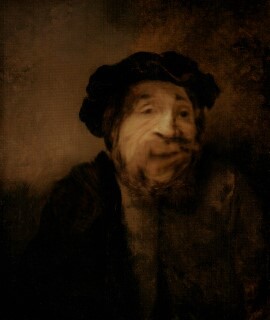
Rabbi Solomon soothes Boron saying that no, they are students who would like to know more about a Prester Johannes. But Boron is not interested, and he’d rather go back to sleep or eat something. “Eat it is!” says Baudolino jolly, and they help Boron out of the bed and the cell.
May 1164. Kyot and Zosimos join the group
INT. ST. GENEVIEVE REFECTORY
Sitting at a long table, Baudolino’s group is engaged in a noisy dispute about the location of the Universal Religion realm. Few MONKS of various ages eat; some turn around looking annoyed at the noisy group. One YOUNG MONK, HAGGARD FACE, piercing eyes, long beard and hair seem to follow the conversation with interest.
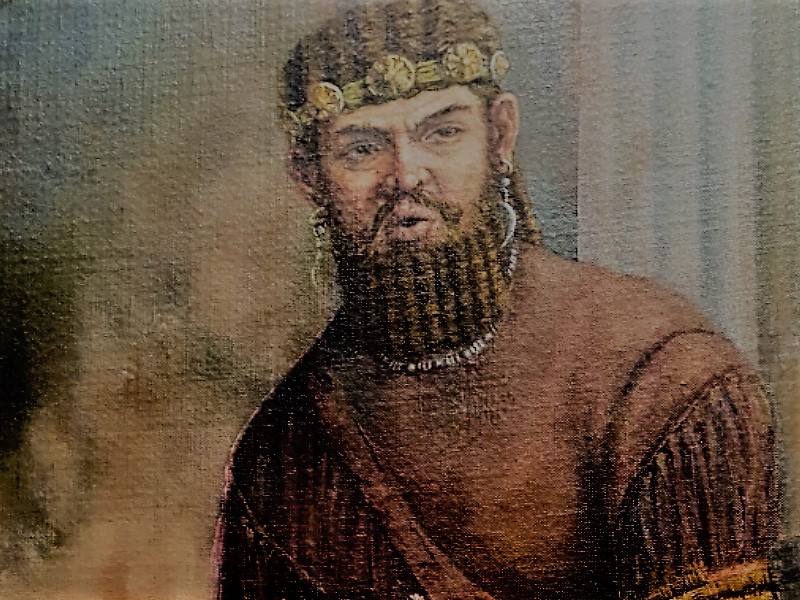
“…This land should be beyond a large river in the far East, the Ganges,” says Boron with confidence. “Yes,” agrees Baudolino, “My beloved teacher Otto said that the Priest and King Johannes came from the East to defend the Christians in the Holy Land. Unfortunately, he could not cross the Tigris river. “Oh, yes he did,” argues Boron raising his hand and spilling the food about to be served by an OLD MONK, “he visited Pope Calixtus in Rome, about 40 years ago. “He did not go to Rome for the Christians’ cause, but for the Jewish people!” argues Rabbi Solomon.
A YOUNG MONK, FUNNY FACE, enters the refectory and exchanges greeting nods with Boron who makes room to for him to sit.

“But he first stopped in Constantinople,” continues Boron “to present his letters to Byzantium King John Komnenos”. The haggard face monk brings his plate at the group’s table and nudges The Poet to make room. He raises his hand to say something but doesn’t. “No,” argues Rabbi Solomon, “letters were sent to him, he came in response to them.” With body language Boron dismisses Rabbi Solomon, briefly introduces the haggard face man as the wandering Greek priest, Zosimos. Zosimos is about to say something again, but Boron stops him, and concludes forcefully: “Prester Johannes wrote the letter to present himself as capable to reconcile Muslims, Jews and Latins.” “Could he be still alive?” asks Baudolino. Boron introduces the fanny face man as Kyot, a well-travelled monk who’ve heard a lot of stories. “What do you know about this?” asks Boron. “Well, he went to Constantinople because it was the largest, most prosperous city in Europe” says Kyot. Zosimos stands up and starts talking about the great city of Constantinople, but The Poet pulls him down by his sleeve. “Traders would come from the West of Europe and East of China, along the Silk Road. But there were also plenty of skirmishes with the Rus, Muslims, and Jews, hard to reconcile, and he went back to his rich palace.” “If it’s rich we have to go find it,” says The Poet exited. “We could find the successors of the Ten lost tribes,” jumps in Rabbi Solomon. “I’ve heard that this priest has relics worth touching,” adds Boron. “Maybe even the Holy Grail,” says Kyot. All of a sudden, the conversation stops, each seemingly thinking about the Holy Grail. The monks at the other table look back at the group intrigued by the sudden silence. “We can go to him as ambassadors with a letter from Frederick…” starts The Poet but Baudolino interrupts him struck by an idea: “No,” Prester Johannes writes the letter to my father, Frederick Barbarossa.” The companions at the table look confused. “Who’s going to tell him to write it, are you?” asks Kyot mockingly, making all other laugh. “I am telling you that we write the letter as if from him,” says Baudolino inspired “inviting the Western Holy Roman Emperor to an alliance.” All faces turn from laughing to dumbstruck, except Kyot’s who laughs harder now. Zosimos smirks thoughtful.
September 1164. The letter from Prester Johannes
INT. AFTERNOON. BAUDOLINO ROOM
The five pals argue passionately about the location of the realm and how to describe its richness and beauty. Zosimos is missing. Rabbi Solomon believes that the realm is where the Ten tribes of Israel went and where they still speak the language of Adam, close to the Garden of Eden. “Folly,” argues Abdul, “the language of Adam was Gaelic, and reconstructed in Scotia.” “Wait a minute,” interrupts Baudolino, a quill in his hand over a parchment. “We are not going to write this in Gaelic or Adamic language! I’ll write the letter in Latin, but let me hear your ideas first, Abdul will help me.” We must see those magic lands directly,” emphasizes Abdul getting the jar of green honey from under the bed. He dips a stick in it, followed by The Poet. The others look intrigued at their licking but then rush out to follow suit. Soon thereafter, licking, and humming, their faces turn from tense to blissful. Rabbi Solomon is the last one to try it. “I know better methods,” he says hesitantly. “I can roll on my tongue the letters of the secret name of the Lord, until my thoughts start spinning.”
Abdul and Baudolino sit at a table, the latter with a quill in his hand and taking notes once is a while; all other roam around daydreaming, bumping into each other. “…I see it, I see it, it’s like the Templar Temple in Jerusalem, a great hall illuminated by torches, light beyond imagination!” exclaims Kyot. “…The Temple of Ezekiel, how grand in its simplicity, build with nails and glue…,” says Rabbi Solomon with ample body language. “What a sacrilege, nails and glue! For a King and Priest of his stature?” dismissively cuts The Poet in. “The richness of his palace must be beyond those of Christian and Byzantium sovereigns,” he adds. “Indeed, …I see this palace built on foundations of jasper and engraved with precious stones from a spring in the Garden of Eden,” says Abdul slightly garbling. Baudolino looks at his pals while writing on a bunch of sheets. “…I see twelve gates engraved with sapphires, emeralds and…,” says Boron. “Must be cautious with the resemblance of the 12 gates of Jerusalem,” interrupts Baudolino, “there is a Gate of Dung and one for Prisoners. We need something more…uugh, harmonious. “…I see meadows with colorful plants and …feel the taste of sweet balsamic liqueurs and aromas emanating from the plumes… “Yes, the spices of the Orient,” agrees Baudolino nodding at Abdul and writing down. “…Bathed in the light of God coming through the glitter of the stained glass, I don’t have the burden of desire.” Boron adds in extasy. The Poet looks at him mockingly, “How come, how about Saint Genevieve?” and locks more green honey. “But what were the names of those animals described in the bestiary books, one eyed, one legged?” wonders Baudolino, more to himself. “…Look! The Holy Grail! It’s on the pedestal!” says Kyot, but Baudolino interjects: “No, we have the Grasal, we are going to give it to him. No, wait it’s better the way Kyot says,” concedes Baudolino. “It’s known as the Holy Grail not Grasal, the cup with Jesus’ blood,” cuts Boron in. “We have enough now,” says Baudolino picking up a clean parchment, “let’s start the letter.”
Baudolino starts writing, while imagining the beauty of the Realm and the Prester reading the letter.
“I The Priest Johannes…” and the letters… …fly off the page over a beautiful meadow, accompanied by a powerful voice reading: “…by the power and grace of God and of Our Lord Jesus Christ, master of land…”; over valleys and field with flowers emanating plumes of scents; approaching a palace with the Tower of Babylon lookalike turrets, “…where colored rivers of milk and honey sweetens the mind of people living in the harmony of truthfulness among themselves and with respect to the animate an inanimate things of the nature…”; flying into the palace through a long hall with walls encrusted with precious stones, illuminated by bright torches, “… master of a temple with sapphires and gold in the walls…”; flying along a long hall where MEN, WOMEN, KIDS and some ODD HUMAN CREATURES, draped in colorful silken robes, faces glowing, sit on richly decorated chairs and nod in agreement, “…walls rising to a dome encrusted with to dazzling gems…”; flying to land on the letter that Prester Johannes is reading from.
The throne is in the middle of a round atrium with a high cupola, studded with translucent precious stones, through which the sun throws colorful rays. The OLD MAN, LONG WHITE HAIR, with patriarchal posture, sits on a throne studded with gems. Behind the throne, the Holy Grail, atop of high pedestal, lays protected by a sphere of glass, “… gems to brighten the most precious relic of all Christianity, the Holy Grail,” the Prester stopping to briefly look at his people, slightly nodding to elicit people’s nodding in response, they do, and he continues to read the letter, “write to Frederick, Holy and Roman Emperor, wishing him good health and perpetual enjoyment of the divine benediction. For the moment suffice it for you to know that if you could number the stars of the sky and the grains of sand in the sea, then you could measure our possessions and power that I wish to share with you.” Prester Johannes stands up and his people applaud. cheering.
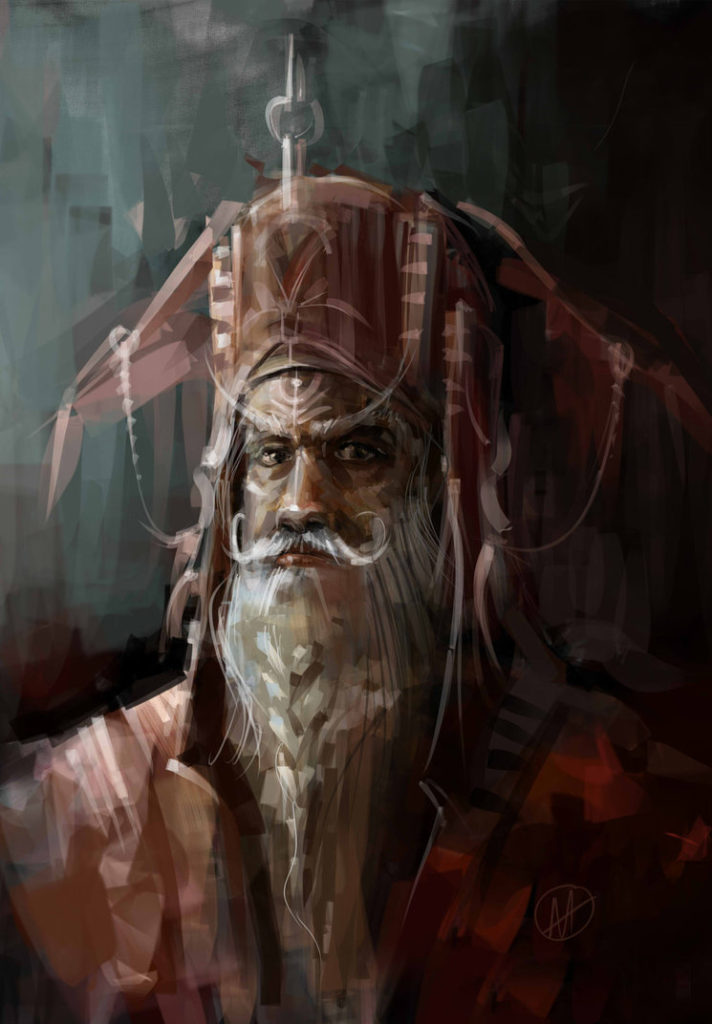
Baudolino thinks: “How wonderful this will go down in my Chronicle.” He wakes up from his reveries at the thud of Zosimos coming in and slamming the door closed. Some of the other toss and continue to sleep. The Poet wakes up and looks at Zosimos, annoyed. “I am late but, I know things that you must write about,” says Zosimos. “You are too late, we have finished the letter,” responds Baudolino. Zosimos grabs the parchment and reading it exclaims, “But this is wrong, you named some odd peaceful creatures but where are the threatening, ferocious methagallinarii, thinsiretae, and cametheterni?” “What are they and why do we need them?” asks Baudolino intrigued. “Don’t you think that people going there should be armed to fight these dangerous creatures?” responds Zosimos. The Poet gets interested and follows the conversation. “Maybe, we may add something tomorrow,” says Baudolino looking at Abdul who sleeps with his head on the table. “And why is it addressed to the Roman instead of the Byzantium Holy Emperor?” continues Zosimos forcefully. “Because Otto wanted me find the Realm for my adoptive father, the Western Holy Roman Empire Emperor to benefit, that’s why. I want Europe and Constantinople to give him respect and recognize his powers,” says Baudolino dismissing Zosimos then laying his head on the table to sleep.
Zosimos is thoughtful and carefully looks around and at Baudolino and Abdul to make sure they are asleep. He pulls out a small booklet from his bag and starts copying the letter. Upon finishing, he leaves a note on the desk and tiptoes out of the room.
In the morning, the people wake up one by one with hangovers from the excess of the green honey. Baudolino wakes up, looks around then reads Zosimos’ note. “Zosimos went to Constantinople to prepare the pilgrimage. He also says that he has a map to the realm. Stupid,” exclaims he annoyed, “What’s the rush? I have to finish my studies, get back to Rattisbon and convince my father to let us go; at least two more years from now.”
August 1167. Baudolino returns to Rattisbon.
INT. RATTISBON PALACE. PARLOR ROOM
Frederick and Rahewin talk in front of a Holy Roman Empire map laid on a large table. Baudolino enters the parlor through a back door and stops listening. On the other side, Beatrice, sitting on pillows, plays with her DAUGHTER, FIVE-YEAR OLD. Two boys, a redhead TWO-YEAR plays with a wooden sword, the other a blond ONE-YEAR rides a horse toy.
“There was no choice, but to burn Rome, too bad the pestis forced us to retreat,” Frederick says pointing at Rome on the map. “But beloved father,” says Baudolino approaching. Frederick turns, brightens-up seeing Baudolino; he is about to hug him but stops when Baudolino continues on a sour tone, “when all this Crema, Milan, now Rome burning and killing will stop?” “When the Italians and their Pope will recognize my religious and administrative powers,”’ Fredrick responds taken aback by the question. “I had to oust Pope Alexander, install our Antipope, have myself and Beatrice properly crowned as Emperor and Empress,” says Frederick. “This gave me the legitimate power to stop the Italian Lombard League alliance,” he says pointing at Southern Italy. “And last but not least,” he continues, angry, pointing at Constantinople. “Had also to stop Pope Alexander’s planned alliance with the Byzantium Emperor!” Realizing that he sounds defensive, looks up fiercely at Baudolino. “How dare you questioning my actions?” he yells. Beatrice and the kids stop playing and look at the Emperor.
“I dare because I believe in what Otto told me; to govern the Western Empire you need an alliance with Prester Johannes, the powerful King and Priest of the Realm. What would he think of you when you kill innocent people and sacrosanct priests? concludes Baudolino angry in turn. “I do not know who, where and even if this Prester even exists,” says Frederick doubtful, calming down, then hugging and whispering to Baudolino, “You’re a weasel like me, the only one I allow to talk to me like that.” Baudolino embraces Frederick in turn and looks at Beatrice. She smiles back. The kids resume their playing. “Your alliance with Prester Johannes and hegemony over a wholllier, Holly Empire will be described in Gesta Friderici Imperatoris,” says Baudolino looking at Frederick, then Rahewin. With a discreet sign, Rahewin suggests Baudolino to not go any further than that; Baudolino is not sure what the sign means and hesitating, remains silent.
Baudolino walks to Beatrice and the kids, and crouches down to play fencing with the redheaded boy. Beatrice extends her hand to gently touch his scar. Baudolino stares at her.
INT. RATTISBON PALACE. RAHEWIN OFFICE (FORMERLY OTTO’S)
Rahewin looks at Baudolino then at the open drawer of his desk. He shakes his head wondering about the details of Baudolino getting in the possession of the letter. Quizzically, he adds that Bishop Otto may have been “involved”, albeit he passed away a long time ago. “Anyhow,” he adds, “it needs clarifications of the channels through which it was received. He then closes the drawer shut and looks at Baudolino. Baudolino just holds Rahewin stare.
March 1176. Baudolino writes his own Chronicle
INT. DAY. RATTISBON CHURCH OFFICE
“Another nine heartbreaking years, waiting…” writes Baudolino sitting at his desk. Next to him, Rahewin desk and chair are empty. He looks at an open manuscript on the side of his desk and bends over to read the Chapter dated 1160, and the unfinished sentence … Usque Ad Vos Solum Pervertum Est… (until you only reached…) He closes Bishop Otto’s Gesta Friderici Imperatoris chronicle. He looks at the book he was writing on, then stands up, walks to Rahewin desk and open the drawer with the letter. “The letter… buried,” he says. He gets back at his desk and holding the quill thinks , “ My allegiance to him growing stronger; stronger my confidence that he must look at the alliance with Prester Johannes. Yes, the Realm must exist. And he, the German King nicknamed Barbarossa, in a permanent state of anger. Another nine years of fighting the Pope, naming Antipopes, destroying Italian cities. Milan rebuilding itself. Venice and Sicily making trade pacts with Byzantium’s Constantinople. And now, what? Fighting them all, fighting the Italian Republic?” He shakes his head, incredulously.
May 1176. Baudolino saves Frederick’s life at Legnano.
EXT. FIELD NEAR LEGNANO.

The battlefield is almost empty. Few soldiers lay dead on a grassy patch. Other soldiers either tiredly fight in small groups or walk around stunned, wounded.
A furious peasant attacks Baudolino with an ax. Baudolino easily disarms him, makes him get his breeches down and charges him to run back to his folks or else he’ll have his balls chopped. The peasant runs away ashamed but grateful for the spared life. An enemy gallops his horse towards Baudolino who gets at the ready to defend himself; but the rider stops and ridicules Baudolino as a looser. “Go home,” shouts the horseman. “Frederick is defeated, what are you fighting for?” asks the horseman galloping away. An Imperial soldier running by recognizes Baudolino and shouts: “We lost the Emperor, we lost the Emperor!” Baudolino runs after him in disbelief to ask for details. ” Frederick was last seen defending himself,” stutters the man, pointing at a clearing into the forest. Baudolino runs into the forest and searches through the dead bodies. Under a pile of them, he finds Frederick wounded, barely alive, blinking.
EXT. NIGHT. FOREST
On a horse, Baudolino holds one arm around Frederick to support him. They go through a foggy, dense forest. Baudolino reminds Frederick about Otto’s vision of the Universal Religion realm and the letter from the powerful King and Prester Johannes The Emperor can hardly concentrate and is still doubtful. “He may or not exist. If he does, an alliance will cement my power. The Realm is far … enemies close. Must think about peace with Pope Alexander now, and his Lombard League Italians. If possible,” he concludes falling asleep in Baudolino’s embrace.
March 1177. Peace with the Pope, confusion with Prester Johannes.
EXT. VENICE. AFTERNOON.
On the deck of the imperial ship, Frederick, Baudolino, Abdul and the Poet admire the Venice island and the palaces’ windows glittering in the setting sun.
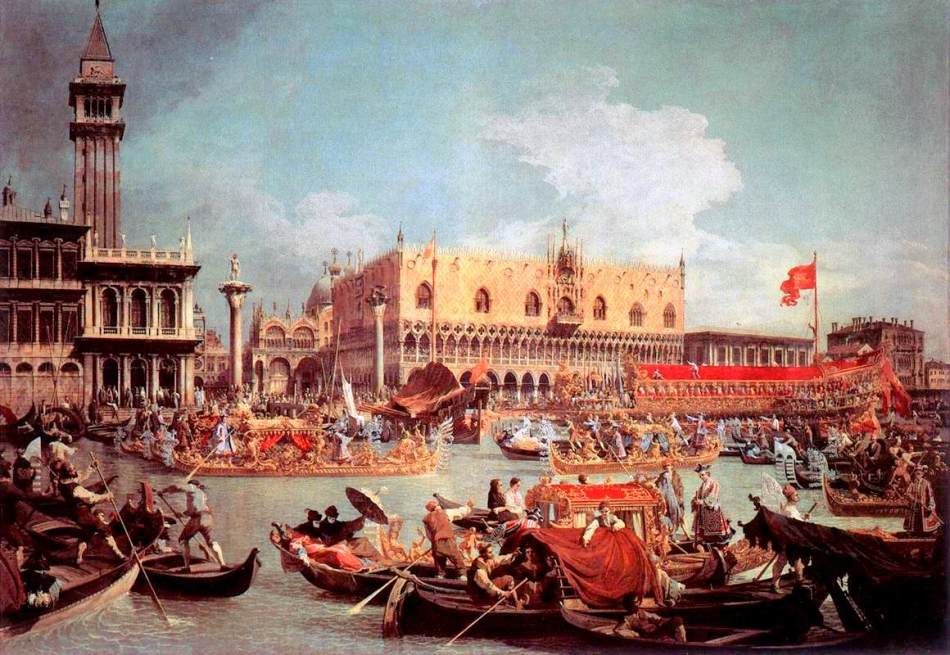
INT. DAY. VENICE PALACE AMPHITHEATER.
Fredrick and his entourage pass through a crowd of joyful ITALIAN NOBLE MEN and TRADERS. The men chat about the peace and bow to congratulate Frederick as he walks by.
INT. DAY. VENICE PALACE.
The 60-YEAR-OLD Doge of Venice, Frederick and 24-YEAR-OLD William the Good, King of Sicily walk on the corridor of the Dodge’s palace. Otto von Berg, Bishop of Freising, 35-YEAR OLD and Baudolino, supporting the 67-YEAR-OLD Archbishop of Salerno, walk behind them. Abdul, The Poet and a couple of YOUNG NOBLEMEN follow the group chatting.
The Doge is angry about the Byzantine Empire’s pilferage of the city’s symbol, the Winged Lion of St. Mark and the pirates attacking the Italian traders’ ships. They enter a room, and at the sign of the Doge, the entourage is stopped at the door. Inside the room, the Doge introduces a MAN, a spy in his service, and asks him to tell his story. The man hands over a parchment to Frederick and explains how an informant led him to the house of a Greek. The Greek confessed that he was about to make copies of the letter addressed by Prester Johannes to the Byzantine Emperor Manuel I and distribute it to the chancelleries of certain Bishops in Europe. Frederick is taken aback: “Baudolino, this priest and king of yours is playing a double game!” Baudolino is still confused and looks back and forth between Frederic and the parchment. “Father, let me see the letter,” he says, then gets to the door and calls for Abdul and the Poet to come in.
The three of them retire to an adjacent room indicated by the Doge. The letter is written in Latin and almost identical with the one they wrote in Paris. However, it includes the names of the methagallinarii and thinsiretae dangerous animals, and Baudolino suddenly remembers that Zosimos wanted them added to the original letter but he refused. They go back to the main room and Baudolino emphatically declares, “This a fake copy of the original in Rahewin possession. Somebody had copied it.“ Frederick frowns. “Yes, father, we were waiting for your better disposition and moment in history. But now you see,” he concludes, “the more we wait the more we expose ourselves to dangerous diplomatic situations. We need to inform the European chancelleries about Prester Johannes’ letter to you. And we,” he says looking at Abdul and The Poet, “will be your emissaries.” “ make sure he has the money.” says Frederick turning to Otto von Berg, then looking at Baudolino, who seems relived, then at the pleasantly surprised Abdul and The Poet.
November 1187. The Pilgrimage gets delayed
INT. DAY. RATTISBON CHURCH OFFICE
“…but we’ve lost another ten years!” argues Baudolino, then softening “Beatrice couldn’t influence him…and she’s in Heaven now,” he says dreamily. He sits at his own desk and Otto von Berg next to him, at Rahewin’s.
“I am not sure I agree with everything that Otto and Rahewin wrote in Gesta Friderici and told you about the Realm,” says von Berg avoiding to look at Baudolino. Then he does, to add, “Never a good moment to inform the Western chancelleries; France and England fighting for territories in Europe; Genoa and Venice fighting for supremacy in the trade with Constantinople; Byzantium, the Holy Eastern Empire, under threat from the Muslims. I am waiting for a united front, before we rally them on your Realm,” he concludes with an emphasis on “your”.
INT. DAY. RATTISBON CHURCH OFFICE
“…but we’ve lost another ten years!” argues Baudolino. He sits at his own desk and Otto von Berg next to him, at Rahewin’s. “I could not find the best moment to distribute the letter. There were shifting allegiances between the Italian cities and Constantinople, and Byzantium, as Holy as it claims to be, is in turmoil. I am waiting for the best opportunity,” says Otto nodding.
November 1187. St. Peter’s Basilica Church in Vatican
EXT. OLD ST. PETER BASILICA CHURCH
“Our walls were constantly pounded by catapults and Greek Fire, but we kept fighting. Saladin wanted unconditional surrender and we said no,…”
The HIGH-RANKING EMISSARIES from Jerusalem walk through the St. Peter Basilica Vatican’s Paradise garden; its atrium is bordered by beautiful flowers and water fountain.
INT. ST. PETER BASILICA CHURCH CHAMBER
“…we’d rather destroy the holy places and take our own life and those of the Muslim slaves,” says the 70-YEAR-OLD William, Archbishop of Tyre, former Chancellor of the Jerusalem kingdom. He presents to the 70-YEAR-OLD Pope Gregory VIII, the situation in Jerusalem, prior to the surrender to Saladin. The Pope is deeply affected and, with fading energy, orders emissaries to be sent to the kingdoms of Italy, England, France and the diets of the Holy Roman Empire. Their support is necessary to liberate Jerusalem.
March 1188. The Pope calls for action against Saladin
INT. MAINZ ST. MARTIN CATHEDRAL

From the nave of the cathedral, the 60-YEAR-OLD Pope Paolo Clement III, and William, Archbishop of Tyre preside the gathering. Kings Henry II of England, Philip II of France and Frederick sit in the front choirstalls. The rest of the stalls are packed with CLERICS and KNIGHTS.
“On the Court Day of Jesus Christ, a time of resurrection and forgiveness, I call for the suppression of the insane struggle for dominance within Europe, between the church and empire, between the empire and the cities, and between the cities themselves. For too much time now, we did not realize that we debilitate ourselves, and worse yet, we lose the cradle of our faith. We have to restore the church of Constantine and protect the stones of the holy tomb from which Jesus Christ had resurrected,” proclaims the Pope. The three monarchs and the whole audience stand-up cheering the Pope.
A YOUNG MAN approaches Baudolino and whispers something to him. He in turn whispers something to Frederick IV, duke of Swabia, the 22-YEAR OLD son of Fredrick, who nods, then approaches Frederick. At an opportune moment he whispers something to Fredrick. Frederick gets a golden chain with a cross from his neck, places it on Baudolino’s, hugs him, then nods in agreement, a sad look on his face.
March 1188. Baudolino’s visits his father
INT. NIGHT. GALIAUDO SHACK
Baudolino sits by the bed of his visibly sick and weak father. “I need to find the hay fork. I forgot where I’ve left it. How am I to feed my dear Rosina without it?” he laments, Galiaudo concedes morosely that he’s ready to surrender to death. Baudolino comforts him by showing him the golden chain from Frederick, telling stories about the riches of the Universal Religion realm, where he will travel soon, and how he will bring the golden cup studded with precious stones, the Holy Grail, from Prester Johannes to him.
March 1188. England and France Kings make peace.
INT. DAY. MAINZ ST. MARTIN CATHEDRAL
The two Kings and the Emperor hold their swords crossed in a sign of allegiance. Frederick, looking at the Pope then at the two Kings promises to finance his army of 100,000 soldiers and knights by paying them a fair amount to avoid pilfering the towns along the way. Henry and Filip look at each other and acknowledge that their knights will carry their own resources throughout the whole campaign. The Pope agrees nodding satisfied.
March 1188 Baudolino and Galiaudo argue about the Holy Grail
INT. NIGHT. GALIAUDO SHACK
Galiaudo mocks Baudolino about the Holy Grail, another of his fantasies. “How could have Jesus used such a flashy cup while being a very poor man?” he argues. Helped by Baudolino, he seeps wine from a wooden bowl. “The cup must have been just a wooden bowl like this,” he says raising it. His face is briefly illuminated by a strange light, his eyes open in bliss. “Rosina…” he whispers tenderly, then drops the bowl and dies. Baudolino gets on his knees, gently closes his father’s eyes and weeps. He then picks-up the cup from the floor and while looking at it, his face is illuminated by a strange light.
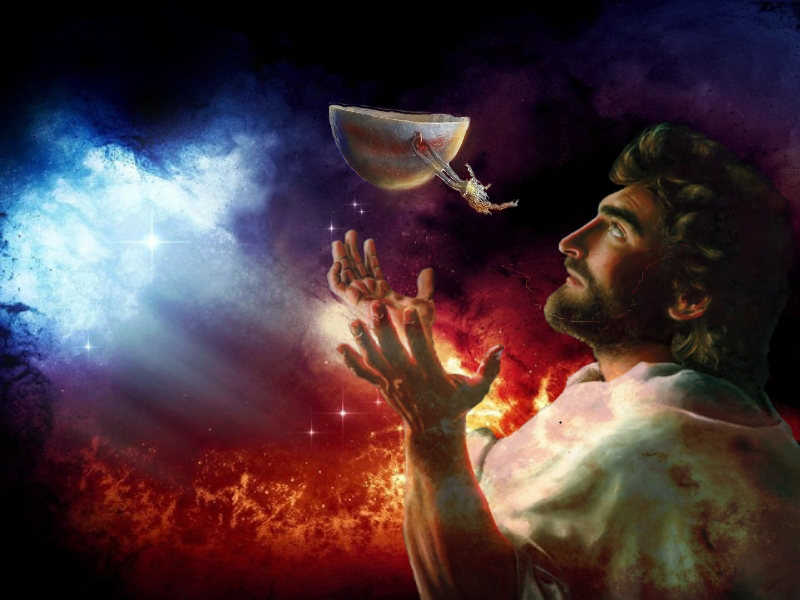
March 1188. Frederick and the Holy Cross of the Third Crusade
INT. DAY. MAINZ ST. MARTIN CATHEDRAL
“I, Frederick The First, Holy Roman Emperor, crowned by the grace of God,” declares Frederick with a strong voice to quiet the audience, “and anointed by His will as the Knight and Lord of the world,” a statement at which the Pope rises from his throne displeased, “raise my sword to call for His grace again, for the army of the Holy Cross, the Holy Cross of the army,” he says holding his sword by the blade and rising it, “let the Third Crusade against the Anti-Crist start!”. The precious stones of the handle glow from a ray coming through nave’s window while the audience cheers enthusiastically. The Pope recovers and joins in the happy atmosphere. The raised handle of the sword resembles the crusader’s cross symbol.
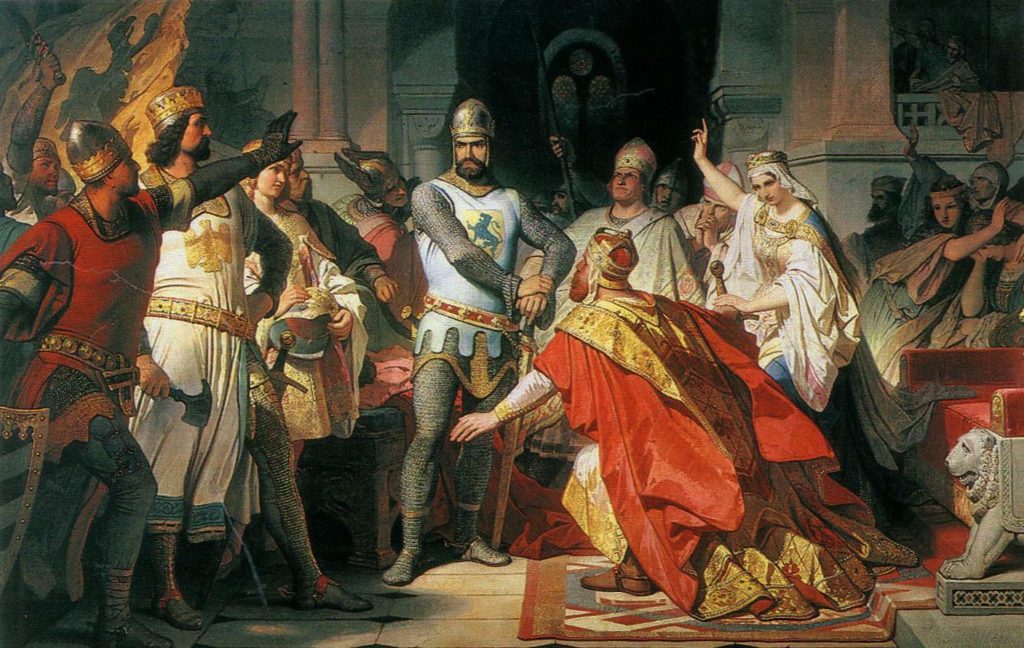
May 1189. Hungarian army joins Frederick’s at the Danube
EXT. DAY. DANUBE BRIDGE
The Third Crusade’s flag with the cross symbol, the German Imperial Eagle banner and Vatican flags flutter in the wind. Frederick’s army crosses the bridge over the Danube at Esztergom. On the other side, a small Hungarian army wearing the Esztergom coat of arms joins Frederick ‘s march.
June 1189 French and Britain cogs sail the Mediterranean.
EXT.DAY. MEDITERRANIAN SEA
The cross Crusade, French and British flags flutter on the ship’s sailing mast. The sails of the warship flotilla are taut in the strong wind.
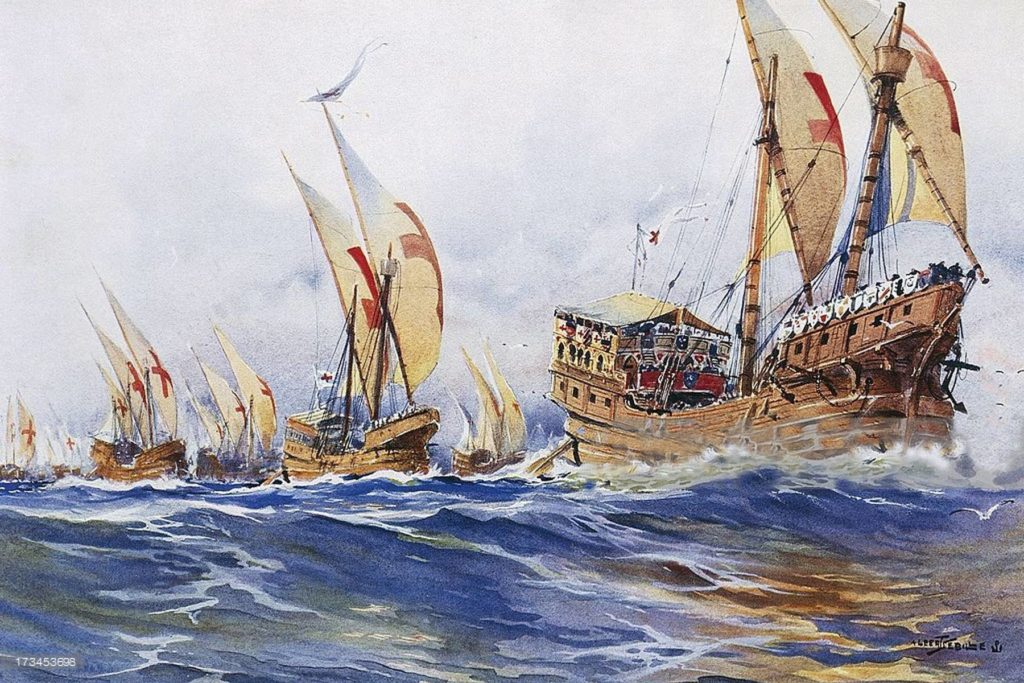
October 1189. The pilgrims change clothing
EXT.EVENING. MEDITERRANIAN SEA
The Genoa trading ship sails a rough sea. Close to the captain, A BIG FRAME MAN OF 50, holding the steering wheel, the pilgrims waver and grab on anything at hand to keep steady. A couple of waves’ splashes drench them to the Captain’s amusement. Kyot has one of his migraines and asks the Captain whether this is the worst they can expect on this trip. “Yes, unless you are a Sicilian,” responds the Captain “If you are, they’ll sack you the way the Sicilians sacked about 7000 Greeks few years ago. You should not look like an Italian,” says the Captain looking at Kyot’s outfit. Rabbi Solomon is scared by the implied danger and pulls on Kyot’s sleeve to leave the deck. “You’ll have to change your clothing and I’ll have to change the flag, before entering the Golden Horn!” shouts the Captain.
The next day, the sea is calm and the ship barely advances in the low wind. The sun is about to rise. On the deck, the pilgrims look at the thick marine layer in front of them. Baudolino is dressed up as a Persian dignitary, the Poet wears a blue caftan and looks like a Turkish merchant. Abdul had shaved his red hair and looks like a high-ranking Eunuch and Kyot is dressed in a fancy, rich Lebanese traveler lookalike. By contrast, Boron is poorly dressed as a servant and Rabbi Solomon resembles a physician or magician; he wears a fine dark cloak spangled with stars and the signs of the zodiac. The Captain looks amused at them. The seamen change the Genoese flag with an Arbanon one, as the ship gets engulfed in the thick fog; partially clearing up, the fog reveals the top of minarets, then the whiteness of the houses and castles on the Golden Horn strait. As the fog rises, the chain is lowered and the ship enters the Cape Horn strait.
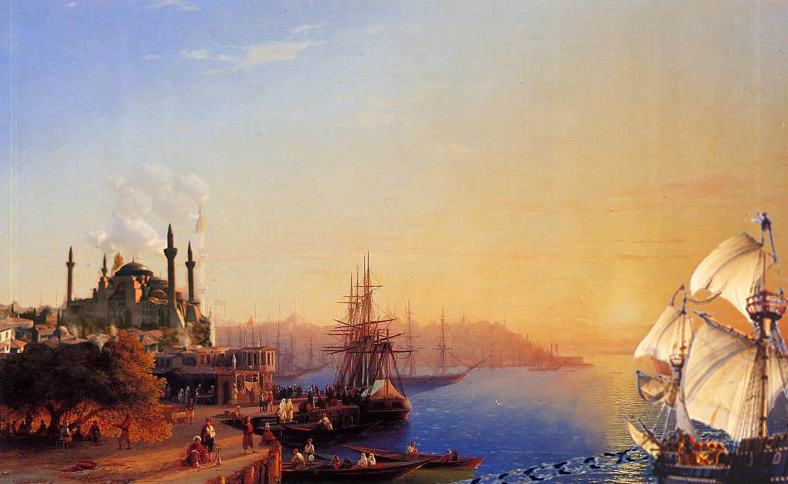
October 1189. Baudolino finds Zosimos by serendipity
EXT.DAY.CONSTANTINOPLE
On the shore, PEOPLE and carriages move back and forth. Two MEN dressed in Turkish military uniforms lead Baudolino’s group towards a small door in a stone wall. Guided through a beautiful garden, the pilgrims enter the palace where an imposing big frame, thick lips, BEARDED 40-YEAR-OLD MAN greets them. With reverence, the man introduces himself as Ardzrouni Baron of Cecilia, and guides them into the library.
Seated around a table, the pilgrims look at the map and listen to Ardzrouni’s account of Byzantine, Turkish, Seljuk, Armenian and Georgian rulers’ interests and fight for supremacy in the region; this increases the risk of the passage towards Jerusalem. He was entrusted by King Leo II, Lord of the Cilician Mountains, to host Frederick at the Dadjig castle and provide camping for his army on the surrounding fields.

In spite of Byzantium Emperor Isaac II Angelos promising free passage, the emperor’s older brother Malexios is against it and secretly tries to forge an alliance with Saladin. “What are Malexios chances of succeeding?” asks the Poet. “We don’t know., Malexios neither. He doesn’t understand that his dangerous intentions could have grave repercussions,” of,” answers one of the military men. Smiling, he adds, “Our informer told us that Malexios wants to find out the odds of succeeding from a monk living under the ruins of Katabates monastery. This Zosimos monk, will call the dead spirits in his catacombs to find out.” Baudolino and the Poet jolt at hearing the name.
November 1189 Zosimos summons Hammurabi The Wise spirit
INT. NIGHT. KATABATES CATACOMBS
Baudolino, The Poet and Abdul climb down few steps advancing in a dark, spooky tunnel, towards the faint light at the end of it. They are about to enter a large room bordered by pillars, but stop at hearing steps and voices of others. One MAN, richly dressed, imposing figure and TWO GUARDS advance towards Zosimos standing by a marble basin in the middle of the room. Small flames rise from the lip of the basin and six tall candles surrounding it.

Zosimos bends in a respectful greeting to Malexios. “This better be true or you’ll be a spirit yourself soon,“ says Malexios extending a big golden ring to Zosimos. “I could have an army of dead spirits at my command to execute the required deeds,” states Zosimos emphatically. “Tonight, Your Honor, this ring will ripple the surface of reality and bring about the messages from the wisest spirits, Hammurabi the Wise. He wrote the code of all the right things to undo the wrongs,” adds Zosimos. He then attaches the golden ring on three hooks hanging on a string with a pulley from the ceiling; he intones a spell, lowers the ring close to the water’s surface and drops a tiny stone in the middle of it. As the water gets muddy, the candles suddenly go off and puff a plume of white smoke. Malexios and the guards retreat scared from the basin. Unperturbed, Zosimos continues his intonation while gesticulating that Hammurabi is responding; he waves at Malexios to come and look into the basin; the water is clear now and a couple of Arabic letters shine on the bottom of it. Malexios looks puzzled at them, then at Zosimos who keeps intoning as in a trance now. He stops intoning and, as if coming out from the trance with difficulty, conveys the message: “Your honor, it is the right deed to stop Barbarossa crossing Armenia, but you may be able to see that with the left eye only.” “You mean, someone is going to gouge my right eye?” he asks, angry. “It will be eye for eye then!” he says turning around to leave; he briskly returns to yank the golden ring from its strings. Zosimos rises his hands shouting “Don’t touch that ring, it belongs to Hammurabi world.” The guards move to push him down on his knees. Malexios and the guards leave. A section of the basin’s pedestal slides open, white fumes are release and a DWARF emerged from them, chocking. Under the basin, there is a couple of lit candles and some tubes.
Baudolino and his friends rush into the room, their weapons drawn and Zosimos stands up astonished. The dwarf runs away and Zosimos stumbles back towards the basin. His cloak catches fire from the flames on the basin’s lip. Baudolino grabs and hits him forcefully on the back with the flat of his sword saying amused, “We came just in time to save you from being burned alive”. “I’d like to save him a bit too,” says the Poet hitting Zosimos with gusto.
January 1190 Winter march through Armenia
EXT.DAY. FIELD IN WINTER
Frederick, his son and the knights ride their horses through the harsh winter storm. The infantry soldiers march exhausted behind them. The pilgrims walk by their horses, along with the lower army ranks. Puled by a chain, Zosimos begs Baudolino to release him. “Why would I want that Zosimos? You stole my letter to Prester Johannes, lied about having the map to the Universal Religion realm and you’re probably ready at any time to flee again,” responds Baudolino yanking at the chain.
June 1190 Ardzrouni shows off his technical marvels
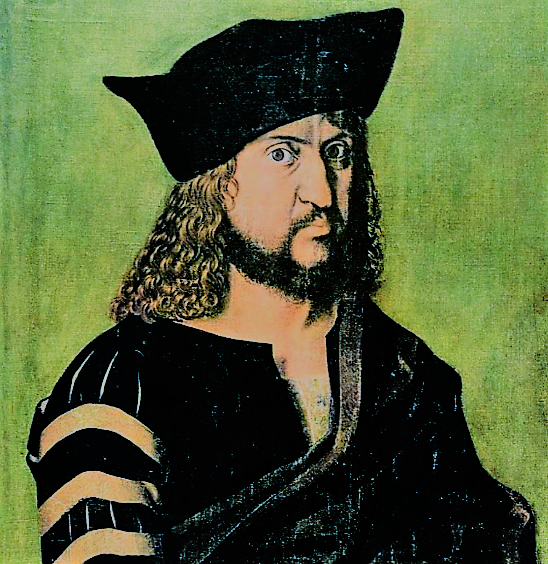
EXT.DAY. MOUNTAIN IN SUMMER
Coming out from a deep gorge, Frederick and his army KNIGHTS stop on a high ridge to contemplate the Saleph river valley. “You’ll be safe in my house Your Highness,” says Ardzrouni pointing at the castle in the valley. “My army needs to be safe as well,“ says Frederick turning to his natural YOUNG SON, Frederick VI Duke of Swabia, “You’ll camp with the army on that high ground upstream the river turn.” “And we will protect you inside the castle from any possible harm,” says Baudolino staring at Ardzrouni. “And last but not least,” says Frederick smiling, “the river looks good for a morning swim.”
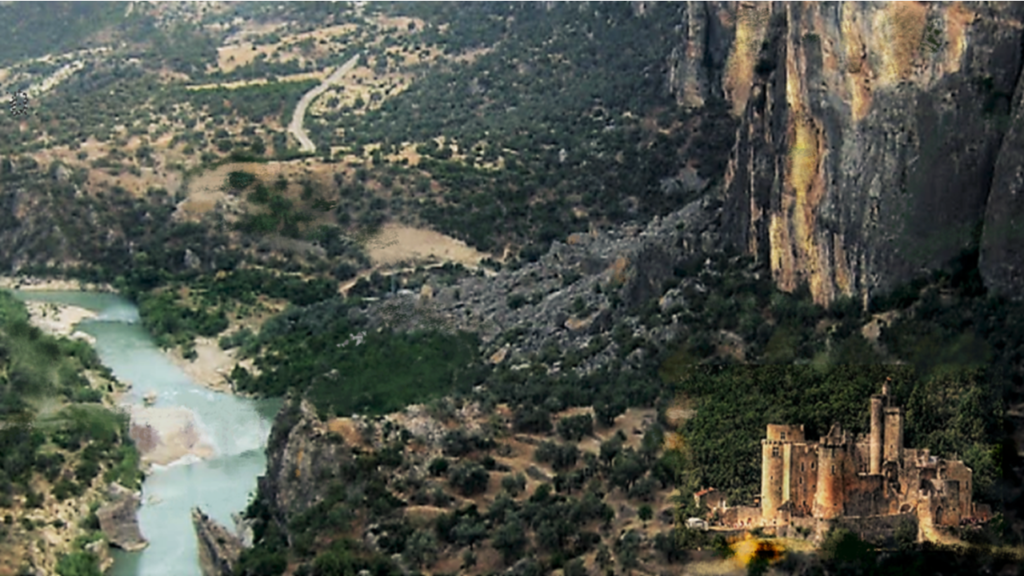
EXT. DAY. DADJIG CASTLE
Led by Ardzrouni, Frederick’s group and GUARDS, climb up a narrow, stepped path carved into the mountain’s rock. At the top of it, they pass through a heavy wooden door, then a courtyard surrounded by crenels. “I do not see your men on the ramparts,” says Frederick nodding to his guards to take positions on them. “The castle Your Highness has natural defenses and it needs only few people to complement them.
INT. DAY. CASTLE ROOMS
On a corridor with portrait paintings and lit torches on the walls. THREE YOUNG guards join the group. Baudolino ties Zosimos’s chain onto a wall ring and signs to one of the guards to stay guard; the other two get right behind Frederick. The Poet and Baudolino pull them over to insert themselves behind Frederick. Ardzrouni stops the group in front of a n ornamented, large double door, a pedestal on its side. He pours a liquid on a bunch woven branches in the pedestal, then lights them with a small torch. Raising his hands above the fire, he intones a spell in a strange language, then turns towards the door and slowly opens his arms. To the surprise of the guests, the door opens with a faint gurgling and hissing noise. “What trick might this be now?” asks Frederick. “I’ll show you momentarily,” says Ardzrouni smiling and inviting them to follow.
He opens the door inviting the guests watch the copper pressure cylinders connected with pipes from which some steam seeps out. from Pistons extending from the cylinders, cams and gears are rigged to two heavy, vertical rods protruding through the ceiling. Smiling, Ardzrouni explains that the opening of the double doors was driven by the rods, ultimately set in motion by the power of the steam generated by the heat of the fire started from the altar.
In the next room, cylinders and pipes extend towards the ceiling and Ardzrouni explains that he was able to create vacuum in the room above, proof being the death of a healthy chicken.
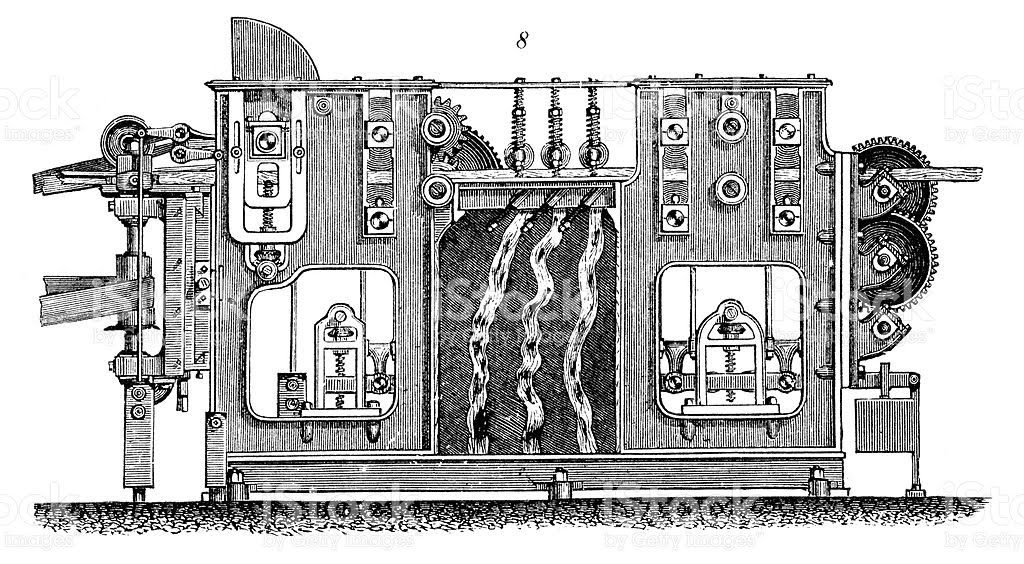
Kyot is doubtful about the dead chicken validation asserted by the host. “Did you know the pre-condition of the hen? Maybe she was just exhausted running away from the rooster.” They enter a large dining room with a long table loaded with food. FOUR SERVANTS are aligned around the table, TWO others carve a roast pig. Ardzrouni invites all to sit down. Baudolino and the Poet sit on each side of Frederick. Wine is poured into goblets. Frederick grabs a slice of meat and is about to bite on it when Baudolino politely but firmly stops him. “Father, we will have to eat and drink anything you want, before you do,” says Baudolino taking a piece of the slice and tasting it. All guests wait motionless for Baudolino reaction, Frederick a bit worried. “And Your Highness, if I may, I need to taste the wine from your own cup,” the Poet breaks the silence, to Frederick’s increasing surprise. Boron hands over to The Poet a small vial, “And keep this handy, it’s a strong poison antidote.” Standing up from the other end of the table, Ardzrouni is offended. “Your Highness, I put my own life as warrant to my Armenian King Leo, against your harm. My young servants are the sons of parents that I had saved the life of; they would rather die to protect than harm you”. He sits down and invites all to pray in gratitude for the food. As the prayer ends, the atmosphere gets relaxed and Frederick asks all to behave like good friends. “Please allow me to extend your invitation for friendship to King Leo,” he says toasting; then remembering something rushes to add, “.and to my close friend, Queen Tamar of Georgia,” then ceremonially, “To your victory in the Third Crusade and brave fellows here.” Baudolino stands-up to toast for the success of the alliance with the powerful Prester Johannes King of the Universal Religion Realm. All other stand up to drink, except Ardzrouni who looks puzzled. Baudolino proudly mentions their mission of responding to the King of the Universal Religion Realm, Prester Johannes, letter proposing an alliance with the Holy Roman Emperor, Frederick Barbarossa. Frederick nods in agreement. Ardzrouni stands up and, surprise dissipating, joins in the happy atmosphere.
Frederick asks to be excused; he is tired and would rather go to sleep. All other nod in agreement, and Ardzrouni guides them through the armory. FOUR OLD GUARDS stand at attention. “The guards will be in this room, an antechamber to the bedroom,” explains Ardzrouni pointing at the door at the top of the stairs. Baudolino asks Abdul, Kyot, Boron and Rabbi Salomon to keep vigil on the guards.
INT. EVENING. CASTLE BEDROOM.
Baudolino, the Poet and Kyot follow Frederick and Ardzrouni up the stairs into the bedroom. Inside the room, the pilgrims look around, at the wooden columns, wrought iron chandelier with candles, ornamented stone fireplace, the sumptuous bed, and the few small, scent burning cups. Ardzrouni adds myrrh to the latter while saying to Frederick, “This is the best room that I have, and am honored to offer it to you.” Baudolino gets closer to the fireplace stone mantel and inspects the chimney.
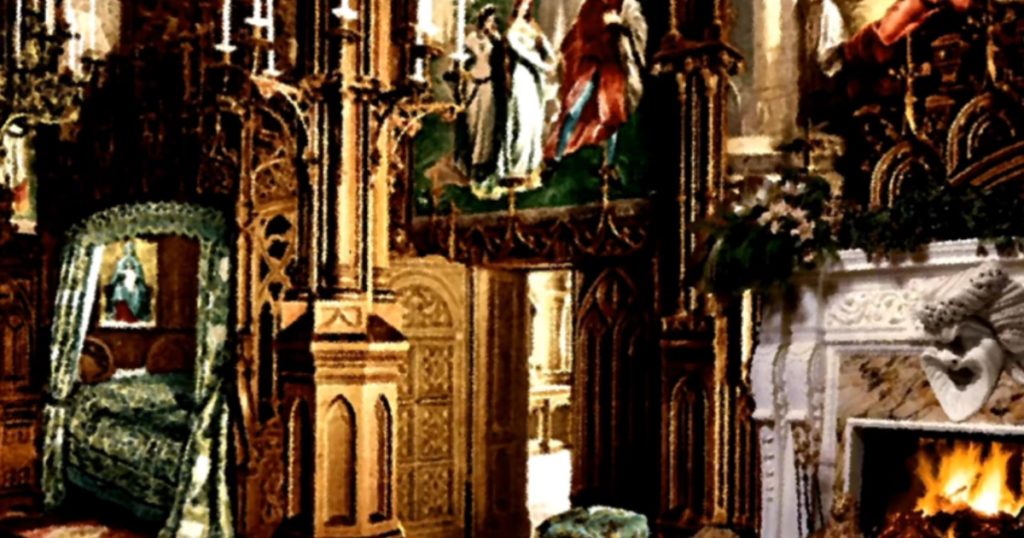
The Poet opens the tall stained-glass windows overlooking the river and the army campus. On each side of it, there are two big concave plates that The Poet asks what are they for. Frederick comes to the window to see them. “Oh, that’s another line of defense, more reasons for less guards. These are Archimedes’ mirrors. I can direct them towards an enemy group coming on that narrow path to the castle,” explains Ardzrouni, then changing the conversation: “Talking about your most personal needs Your Highness, this cubicle will ease the works of your stomach,” says Ardzrouni opening the door towards a heavily ornamented cubicle and toilet seat resembling a throne.
Baudolino keeps inspecting the room and pulling some books out from a bookshelf. Suddenly, a camouflaged door opens. “And where is this leading to?” asks Baudolino concerned. The Poet goes through the opening to check. “Outside,” responds Ardzrouni, “but nobody can come in, since it can be opened from the inside only,” he says and pushes the book back, which closes the door. Some faint pounding comes from the other side. Baudolino pulls out the book to let the Poet in. “You should just stay there to make sure it’s safe,” laughs Kyot at him. Baudolino points out at the room’s entrance door.” I and the Poet will be outside that door,” he says then ushers everybody out. Once the door is closed, he asks Frederick to lock it. Ear to the door, Baudolino hears the metallic sound of the latch closing.
Baudolino and The Poet lay down on the benches. Exhausted Baudolino turns around on the bench then falls asleep dreaming about…
Frederick blissfully falling asleep and snoring forcefully; gradually, the snore is overcome by rhythmic machinery pounding. In the laboratory under the bedroom, the vacuum pumps suck air through the pipes connected to the bedroom. In the bedroom, the Dionysus mouth sucks air. In the fireplace, gears close a plate in the chimney. The bedroom shrinks as the air is sucked out. In the armory, the soldiers laugh pointing up at Fredericks’ bedroom above. The laughter propagates through tubes to the laughing head Dionysus, now morphing into a scary Medusa. Fredrick wakes up scared, rushes to the door, opens the latch and running out stumbles and falls on Baudolino who…
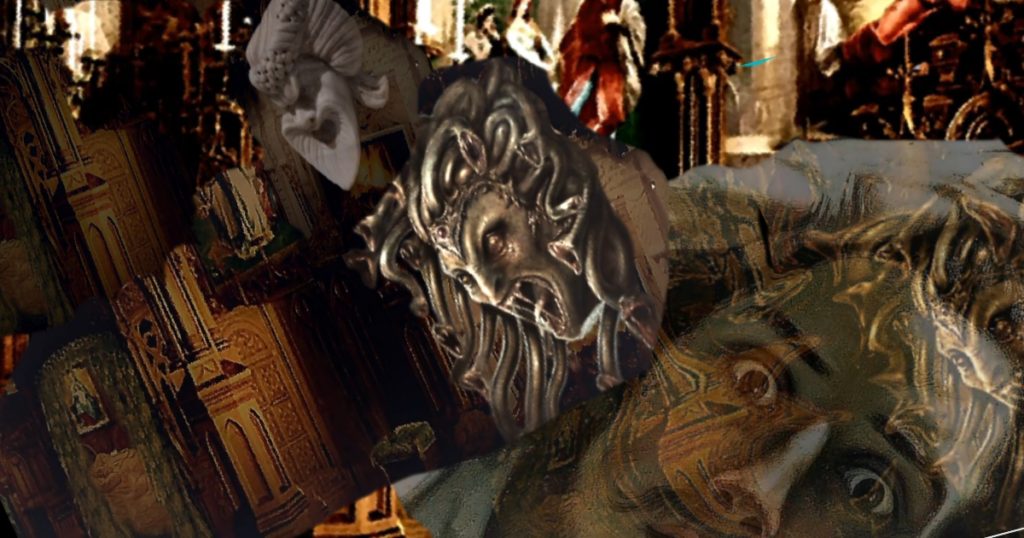
… wakes up dizzy and looks at the bedroom’s closed door. He knocks on it and listens: no answer. He knocks again and listens, then hammers on and shouts through it: “Father, father are you awake, you all right?” This wakes up the Poet who confused and agitated hurls himself against the door a couple of times. Baudolino forcefully shakes the door by the handle which unexpectedly opens and the Poet goes through, trips, falls stands-up and pulls open the beds’ draperies. “Not locked?” asks Baudolino himself, puzzled. “Not here!” yells the Poet. They ran out of the bedroom, then on the corridor where they left Zosimos. He’s not there; the chains hang. “He may be swimming!” Baudolino brightens with hope and dashes out of the castle.
June 1190 Frederick went for a swim
EXT. DAY. SALEPH RIVER BANK
They run along the river while searching for Frederick into the rushing waters. “Is he a good swimmer?” asks the Poet. “He was, when young… but now… the water cold … flow is dangerous” answers Baudolino breathing hard. They run by agitated soldiers yelling that Frederick is dead. “I’ve heard this before,” says Baudolino elbowing them aside and kneeling down; Frederick has a big bloody bruise on his face. Baudolino raises Frederick’s mid riff, turns him around and shakes him attempting to get the water out of his lungs. Not much comes out. He turns him face up pounding rhythmically on his chest. Frederick’s natural son arrives, kneels down and awaits together with Baudolino for a sign of revival. It doesn’t come. Fredrick’s son gets up and looks down at Baudolino and his father. “I’ve never trusted you,” he says almost angry. Baudolino looks up. “Nor do I believe in your Prester Johannes.” Looking up at him, Baudolino stands up and, sad, embraces him. “Don’t come back if you don’t find him,” says Frederick, remaining still. Baudolino retreats a couple of steps; the soldiers make room and cross themselves.
July 1190. Frederick son marches on towards Jerusalem.
EXT. DAY. ARMY CAMP
In the tune of a military march, orderly troops march through distressed soldiers; some of them walk away in the opposite direction. Baudolino and his friends ride on mules, along with the orderly troops.
Ardzrouni catches up with them galloping a horse. He is agitated and asks Baudolino to let him join the group. “I must disappear for a while, maybe return with something worth restoring my prestige. Else King Leo will kill me for Frederic’s death.”
July 1190. Baudolino’s motivation gets stronger.
EXT. DAY. MOUNTAIN TRAIL
Ardzrouni leads the group through a narrow, dangerous mountain trail. A mule carrying a load falls into the crevice. Rabbi Solomon is frightened by the big lizard’s skeleton on the trail. Right after passing a big boulder, his fright gets worse at the sight of a bighorn skeleton. Baudolino walks alongside his mule holding it by a rope, thinking: “Why am I still pursuing this chimera? My fathers passed away, Galiaudo not believing me, although I did not lie to him, Frederick ending up by trusting me, while I was lying.” After passing the skeleton he stops and turns around, looking at it and…sees it coming to life and running at him. The bighorn body morphs into that of a lion resting his huge paws on a boulder; the lion’s head morphs into Frederik’s. “Go find the Realm! I trust you that it must exist! Go!“ roars the Lion. Frederick’s face morphs into that of Otto, who winks. The tail end of the lion whacks Baudolino then morphs into the face of his natural father. “Good for nothing!” berates his father with funny voice. Stunned, Baudolino stumbles backwards…the mule brays noisily and keeps hitting him with its tail.

September 1190. The donkeys get stolen at Euphrates
EXT. DAY. EUPRATES
The Pilgrims cross the Euphrates at Halfeti on a small boat loaded with merchandise loads. Rabbi and Boron wave to a man on the shore, who waves back while holding their mules by ropes. The barge arrives, they disembark and wait for the next barge to bring their mules. But there are no other barges in sight nor the man with their mules on the other shore.
The pilgrims walk on foot on a barren land. Ardzrouni looks down at some camel footprints, then at the Sun, and assures everybody that they could keep going East by observing the position of the Sun during the day and stars in the night.
October 1190 Kyot is charmed by a mud hut girl
EXT. DAY.BISMIL DWELLINGS
Walking through a small village with circular mud huts, Baudolino stops a VILLAGER and asks if he saw going by a bearded priest, named Zosimos. The man responds in a foreign language. Baudolino looks at Abdul, who raise his shoulders then, adds body language to his question, by mimicking a traveler and pointing at Boron’s beard The villager seems to suddenly understand, nods affirmatively and speaking in his own language, mimics a big belly, points at a naked, TWO-YEAR-OLD CHILD playing in the dirt, then towards a hut.
A YOUNG GIRL leans against the entrance of the hut and smiles flirtish at the pilgrims. This gets the villager angrier who, with brisk and significant body language ask the pilgrims to pay for the damage caused by the traveler who got his daughter pregnant.
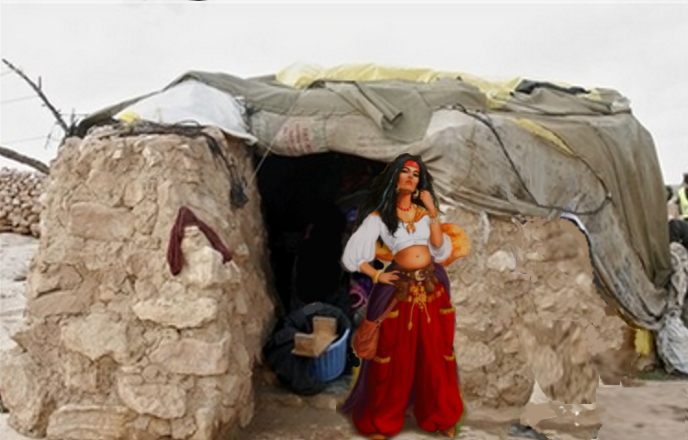
Annoyed, Baudolino points at Boron’s beard showing three fingers, then at the girl and showing nine, then at the kid flapping his open and closed fingers twice. Meanwhile, Kyot seems to have been charmed by the girl and goes to talk with her. Attracted by the argument, VILLAGERS approach menacingly. The Poet pulls the sword from the sheath, Baudolino gives the villager a coin, Abdul pulls Kyot away from the girl while the girl hangs on to him, for him to stay. The pilgrims finally manage run out of the village in a hurry. Kyot regrets having to leave the village. It felt like home, some forgotten childhood memories becoming alive all of a sudden.
November 1190. Bathsheba takes a bath
EXT. SUNSET. DESERT
The pilgrims walk tired, covering their faces to avoid the wind blasted sand. A caravan catches-up with them. Elated, they bargain with the traders, first to buy a camel, Bathsheba, then some supplies. They decide to setup camp, while the caravan keeps going, camels leaving hoof prints on sand. Ardzrouni proposes to follow them in the morning.
EXT. NIGHT. DESERT
The desert storm intensifies and covers the moonlight. The pilgrims lay down around the resting camel to stay warm. The Poet grumble about the camel Bathsheba name, dirt and stinking smell; he’d wish to dream about the biblical Bathsheba, taking a bath, for compensation. He falls asleep and dreams about … the camel undulates her hips and, showing off her big white teeth and red lipstick, flirts with The Poet:
I am Bathsheba naked, full of fur
That some complain of foul “odeur”.
There is no way to clean my dirt,
In spite of which I love to flirt.
So, check my humps seen from the side,
How firm and not in need of bra to hide.
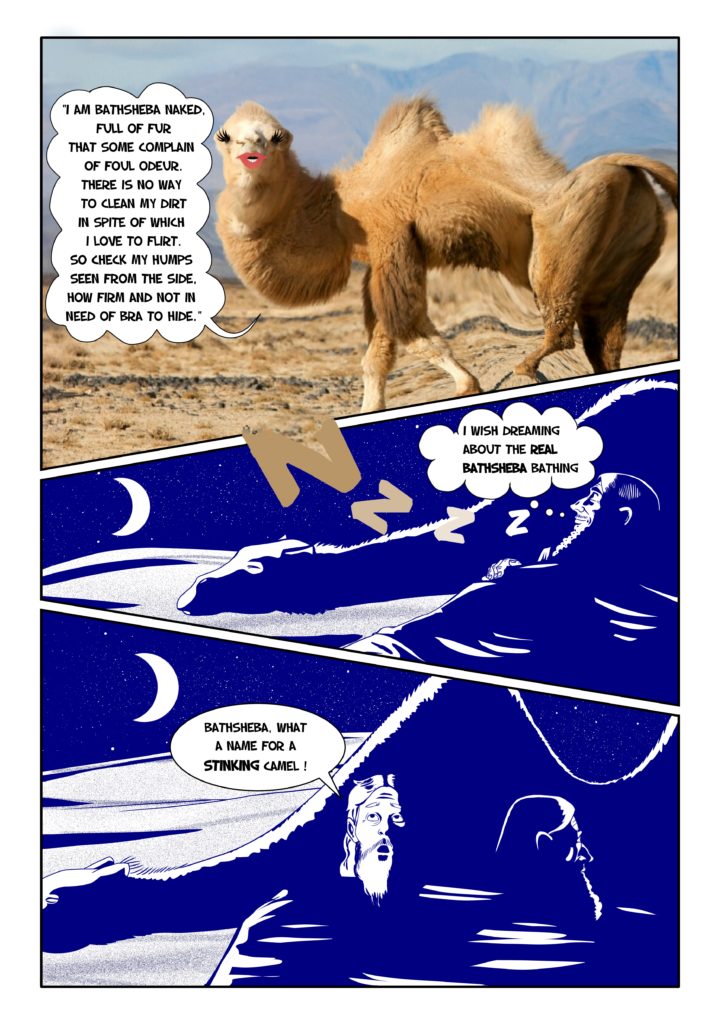
EXT. MORNING. DESERT
The wind had subsided and the sun shines. While the pilgrims are disoriented and argue about the proper direction to follow, Ardzrouni uses the shadow of a stick to set marks in the sand; when finished, he points with his arm extended to the North, then East. “That way,” he says.
EXT. AFTERNOON. TIGRIS RIVER
The pilgrims enjoy the sight of the Hasankeyf cave homes across the Tigris river; but there is no sign of anybody or anything crossing it. Ardzrouni determines that they went too far North and have now to go South to get back on the trade route. All except Rabbi Solomon are irate. He raises his finger and says: “It’s God’s will. There should be something good about it.” The pilgrims turn from angry to annoyed, then surrender to being hopeful.
November 1190 Abdul is embraced by a Greek goddess
EXT. NIGHT. HATRA FORTRESS
The top of Hatra fortress’ high walls are highlighted by the moonlight. By the time the pilgrims reach the city, the moon gets covered by clouds and the narrow streets are dark. Around a corner, a LOCAL MAN startled by the pilgrims’ group, runs away without responding to their greetings. The pilgrims set camp for the night into a square with ruins.
Abdul falls asleep and … a sumptuous Greek goddess embraces him. Looking at her face he tells her that she is not his dream lover and tries to escape her embrace. But the goddess wouldn’t let him go and… he wakes up looking right up at the statue of Abu looking down at him.
December 1190 Bathsheba crosses Tigris on ice.
EXT. DAY. MOSUL
Following caravans’ footprints in the snow, the pilgrims arrive at Mosul. It is a harsh winter and Tigris is frozen. To cross it, they huddle close to Bathsheba to protect themselves from the wind and to hold her from slipping and breaking the ice. On the other side, they decide to rest and wait in Mosul for the spring.
April 1191 Baudolino gives up Bathsheba for horses.
EXT.DAY. BEHISTUN
Drenched by the rain that just stopped, the pilgrims walk by the Behistun mountain. They enjoy the sun rays shining through patches of dark clouds and the sight of the King David bas-relief chiseled in the mountain.
EXT.DAY. CARAVANSERAI MARKET
The pilgrims make their way through the traders bargaining at a caravanserai market. They change Bathsheba for horses.
EXT.NIGHT. RUINS OF TEPE HISSAR
The pilgrims warm up at a fire, under an arcade in the ancient dwelling of Tepe Hissar.
June 1191. God, Deities and Fish Heads in Zadracarta
EXT.DAY. ZADRACARTA
The pilgrims walk through colorful orchards of lemon, orange and apple trees. Arriving in the city of Zadracarta, a GREEK FAT MAN, 60-YEAR OLD nobleman notices that they are travelers, gets into a conversation with Baudolino and ends-up by inviting them to his house.
INT. DAY. ZADRACARTA HOME
As the host, leads the pilgrims into a large room, a splash of wine hits him on the side of the face. A SKINNY, TALL, YOUNG MAN rushes to comfort the host and apologizes. “It’s just our wine drinking game, Kottabos!” he proudly explains.
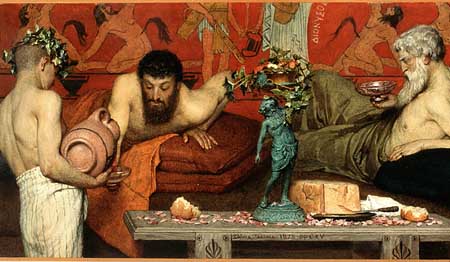
FEW MEN laying on comfortable sofas, drink and nibble from a table loaded with fish, vegetables and fruits. They debate the subject of one God versus many deities. “I like many gods better,” says the skinny man. “They could play tricks, cheat on women and drink wine like I do,” he continues laughing. SERVANTS bring a couple of large sofas to the pilgrims. “Wise men speak because they have something to say; fools because they have to say something,” mocks him the host, with a grudge from the wine splash. Ardzrouni joins the debate by saying that he likes to drink too but believing in one God makes him live a meritorious life; he is afraid of dying and ending up in hell.
Another GUEST, 30-YEAR OLD, TALL, ATHLETIC MAN argues that he can live a meritorious life by simply keeping his body in good shape. “If the body is healthy the mind is healthy. That’s how the Argonauts, my ancestors, got all the way to this land,” he concludes and mimics something at a servant, who brings him a mirror; he uncovers his upper torso and admires his muscles. The skinny man grabs the mirror and admiring his profile in it, toasts to himself.
A SHORT, SKINNY, BEARDED 70-YEAR OLD MAN argues the athletic man’s point: “It’s the other way around “Mens sana in corpore sano. I’ve never done any physical exercise, just kept learning and debating philosophical issues. The mind sanity is first,” he concludes.
An inebriated FAT, 60-YEAR OLD MAN, nibbling on a fish, smells something foul from its head and throws it on the table. “Indeed”, he says spitting the food, “the fish gets stale from the head.” Kyot has one of his frequent migraines and seems depressed by the conversation’s turn. “Science,” adds a 70-YEAR OLD MAN with a white beard, “and the understanding of the reality, not its perception, sets us free from spirituality. Rationality is superior to spirituality.”
1191 December. Ardzrouni changes color.
EXT.DAY.ALTYN DEPE MOUNTAINS
From a height of the Altyn Depe mountain, Ardzrouni points down in the valley at the ruins of an ancient city. He excitedly tells Baudolino about the ruin’s reputation as the “gold hill” because diggers found a lot of gold and jewelry. He’d like to spend some time to look for some unfound treasures. Baudolino is not enthusiastic; they have to keep the pace of their pilgrimage. “But at least let’s get to the lapis lazuli mine, there are other precious stones there as well, we could use them to buy things,” insists Ardzrouni. “Very well,” agrees Baudolino, “if it’s on our way.”
Out from the narrow gorge, the pilgrims reach a large, dry river bank full of black and blues stones. “Here they are, look at these marvels!” exclaims Ardzrouni dismounting his horse and hurriedly walking towards the bank. The Poet follows suit, but Abdul yells at both of them: “Stop! Don’t touch them. I’ve learned from books that they’re cursed.” The Poet looks intrigued at Abdul and Ardzrouni ignores him. He grabs few translucent, black stones and looks at them in the sun light, fascinated by the strange play of rays inside of them. He brings them to the group for all to admire. The Poet is about to grab one but stops short as he sees the hands of Ardzrouni changing color to brown. Ardzrouni sees them himself; his surprise changes to panic as the brownish color advances and reaches his nose. He drops the stones, gets a canteen from the horse’s saddle and splashes water on his hands, rubbing them to wash the color. The pilgrims’ amusement turns to laughter as Ardzrouni completely freaks out while checking his legs then belly; his whole body turned to a dark brown color. Between bursts of laughter, Baudolino comforts him saying reverently: “Oh, Magi Balthasar, you look now entitled to guide us back to where we came from, the realm of Prester Johannes.”
April 1192. Which way did Alexander go?
EXT.DAY.AMU DARIA RIVER
On the wooden barge, the pilgrims contemplate the smooth surface of the wide river. “How did the army of Alexander the Great crossed this?” asks The Poet. “He ordered the soldiers to stuff the tents with whatever could float, and that’s how they did it,” says Ardzrouni. “How far did he go?” asks the Poet. “All the way to the Chinese wall,” says Boron. “No way,” argues Kyot, “he went South from here.” “No, he didn’t,” retorts Boron, “He kept going after crossing a large river, this one,” he says pointing at it. “I’ve read this in a book. And he built a great wall farther East,” concludes Boron confidently. Pulling out an old map from his bag Ardzrouni agrees: “This map shows East, beyond this chain of mountains.”
May 1192. Magogs working hard in Samarkand
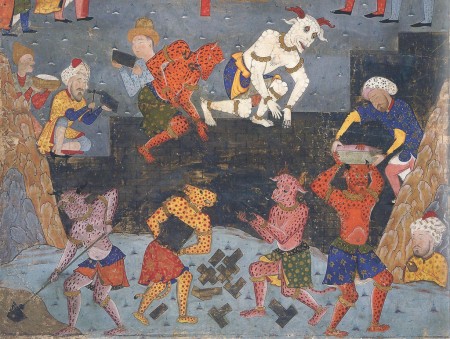
EXT. DAY. SMARKAND MARKET
The pilgrims buy things for themselves and for each other in the crowded Samarkand market. Some local passers-by eye them intently. A group of weird people with colored dotted skin carry heavy merchandize loads on their backs. The Poet buys a crossbow and Boron a box with a small secret compartment for coins. Kyot buys a censer studded with colorful stones, thinking that it resembles the Holy Grail.
While negotiating the cost of a tallit prayer, Rabi Solomon looks agape at two of colored dotted skin people approaching Baudolino and Ardzrouni; with body language they offer to help loading the horses with provisions. Once the loading is done, Rabbi Solomon gets close to Ardzrouni: “These look like the apocalyptic Magog to me; we should stay away from them!”. “They seem to be just hard working,” responds Ardzrouni. “It’s time to go, get on your horses,” rushes them Baudolino. “I am not going anywhere today, it’s Sabbath,” argues Rabbi Solomon, “can’t walk farther than 70 cubits. “You’re riding the horse, not walking,” says Boron trying to appease Rabbi Salomon. “One hundred rabbi did not give allowance for horse riding on Sabbath!” retorts Rabbi Solomon. After a short conversation in Arabic with a LOCAL MAN, Abdul turns to Rabbi Solomon;” It’s Friday not Saturday.” In disbelief and hesitating, Rabbi Solomon gets on his horse, bitterly thinking, “I’ve sinned by missing the count of the days of the week.”
May 1992. The Pilgrims get kidnaped twice.
EXT. DAY. FERGANA VALLEY.
Riding on horses, the pilgrims advance on the hot, dry land of Fergana Valley. A plume of dust rises in the distance; it’s caused by a BAND OF RIDERS getting closer, fast. The pilgrims are encircled by the attackers, pulled down from their horses and tied up. Their horses are rounded up, and the pilgrims are pulled by ropes towards a distant tent settlement in the dunes. Soon thereafter, another plume of dust raises from the mountains, and another tribe’s BAND OF RIDERS attack. A fierce fight starts; taking advantage of it, the pilgrims manage to untie their hands, get on to their horses and gallop away trying to escape. But some of the second group’s tribesman catches up and pulls them down again from their horses and tie them up. The leader of the band though instructs his people to untie and let the pilgrims ride their horses. The survivors of the first tribe are tied up and pulled by ropes towards the mountains, leaving behind few dead bodies of their own.
INT.DAY.TRIBE LEADER TENT
They arrive at a shepherds’ settlement and, in a sumptuously decorated tent, are introduced to the tribe’s chief. The chief is bent over a table with books, reading. In an area behind him, there are shelves with books and drawings of celestial bodies with tables of numbers and mathematic formulae. The pilgrims are pushed in the middle of the tent while the chief keeps reading. The kidnappers empty the sacks of the loot taken from the other tribe and the pilgrims, at the noise of which the leader stops reading and looks up. He stands up takes a close look at the pilgrims, then at the loot, examining it without much interest. He pushes some object aside with his foot, then picks up the frankinsencer. He tosses it back in the pile though, and admonishes his men for bringing in worthless stuff. The chief seems to be rather charismatic and orders the pilgrims to be served tea. “I want to have tea with the people of the West,” he says agreeably.
July 1992. The 99 names of Allah
INT. NIGHT. VILAGE TENT
The wind flaps the fabric of the tent. A CLERIC wearing a thobe, ghutra and egal sits in front of the pilgrims teaching them Islamic words. He admonishes them for their slow progress in learning by heart the 99 names of Allah, the Islam God; it’ll be easier if they’ll remember the meaning of each, and hopefully realize that the meaning is true.
August 1192. The coins are saved, the horses lost
INT. NIGHT. TRIBE LEADER TENT
The pilgrims sit on a rug around the chief. They have grown beards and are dressed in throbs. The chief is disappointed because he couldn’t learn anything of interest from them, like mathematics or astronomy, he says looking at Ardzrouni then Boron. He will let them go away because they cost him food for no good reason. He then instructs one of his men to give them back their worthless objects, but keep the horses.
EXT. DAY. VILLAGE OUTSKIRTS
Few hundred yards away, and looking back at the village to make sure they’re not followed, Boron checks his bag and pulls out the small box he bought in Samarkand. He opens its false bottom and happily announces that the coins are still there. Kyot rejoices at finding his studded Holy Grail. They decide to go back to Samarkand to buy camels. Hopefully, they’ll be able to find and join a caravan going East, thus being protected.
September 1192. The pilgrims get the seven days’ names
EXT. DAY. ZARAFSHAN RIVER.
A long caravan with camels travels East along the banks of Zarafshan river. The pilgrims ride along on camels. Rabbi Solomon tells The Poet about the remorse about missing the account of the week’s days, thus the danger of missing Jewish celebrations. The Poet listens smiling and tells him that he should be the keeper of the time, as Kronos did, maybe taking the Sabbath nickname. Jokingly, he tells Ardzrouni that he should be Sunday, since he looks like he was burned by the Sun, Baudolino should be Monday, since he is a lunatic, driving everybody crazy on an unpredictable course. Thinking a bit, he decides that it’ll be fitting for him to be Tuesday, due to his horror of blood, but not sure what Kyot would be. “Kyot, what day of the week do you want to be?” he asks. Laughing, Kyot answers that he should keep the Wednesdays as the messenger of Mercurius, the god of thieves, but also wisdom. “So be it,” concludes The Poet, “then Boron will be mocking the day of Jupiter with his frailty and Abdul, what else other than Friday, with his Aphrodisiac tendencies and love of woman’s beauty.
December 1192. Music is the Universal Language.
EXT. AFTERNOON. ESCHARTE OUTSKIRTS
A while after the sunset, a pale orange light is visible behind the pilgrims. Riding on their camels along the Syr Daria river, Kyot and Boron argue about the objects saved from the kidnappers. Kyot brags about his Holy Grail. Boron is proud of the secret bottom of his box; it saved the coins, which allowed them to buy the camels and new clothes. Ardzrouni hears the conversation and thinks, “Money, that’s what’s the universal language everybody understands”. But the box is empty now and Boron offers to exchange it with the cup, should Kyot whish that. They stop bargaining surprised at the pale orange light afar, ahead of them. Kyot looks back wondering about the sunset both ahead and behind them. “Those seem to be fires,” he says nudging his camel to speed up. All other follow suits. Riding past a small terrain mound, they see fires lit at the top of five tall towers. At the outskirts of the village, they encounter LOCALS walking toward a square where five more fires are lit on raised columns.
December 1192. The Three Magi return to Escharte.
EXT. EVENING. ESCHARTE VILLAGE
The Poet and Boron dismount. An OLD VILLAGER approaches them and struck by a sudden thought yells with joy, “The Magi, the Magi are back!” then runs towards the square. The box and the cup in their hands, Boron and Kyot look at each other wondering what’s going on as the VILLAGERS around them prostrate to the ground in adoration. Ardzrouni gets the gist of it and pulls the bag of myrrh from his belt and the censer from the bag. A CHILD pulls the harness of Boron’s camel towards the village’s square.
In the middle of it, a PRIEST dressed in a white robe, officiates a ceremony. As he intones towards the dark clouds, thunders start. He gestures towards FIVE KIDS in ceremonial dresses to light the fires on five stacks of branches. People who were in a praying stance until then, get up and start jumping over the fires. More PEOPLE carrying plates with food offerings arrive in the square. The running villager gets on the podium and pulls on the priest’s cape and points out towards the pilgrims. The priest squints then, discerning Boron, Kyot and Ardzrouni, rises his hand again in ecstasy towards the sky; he emphatically blesses the miraculous return of the Magi, Kings Melchior, Caspar and Balthasar. He steps down from the podium and, asking the crowd to part, reaches to the pilgrims inviting them on the podium. Boron hugs the priest in acknowledgment then looks meaningfully at Ardzrouni and The Poet for them to do the same. Abdul is the only one who understands the language and introduces himself as the Kings’ servant.
A heavy rain turns into hail, drenching everybody. The dark, cloudy sky is lit by thunders and the wind picks up. Some people run away, others raise their hands blessing the weather, a good omen for the next year’s harvest. The priest rushes the pilgrims towards his house. The group runs by the sculpture of full size marching soldiers.
December 1192. The three meanings of the Zoroastrian flame
INT. EVENING. ESCHARTE HOUSE
The following day, the host, a COUPLE OF ZOROASTRIANS dressed in white robes and the pilgrims sit crouched on a rug, around plates loaded with traditional Zoroastrian cooked food. On the side, a ceremonial altar is loaded with tall candles, a fish bowl, a mirror, an open book, apples, candies and small vases with young grass sprouts. The Zoroastrian sign is plastered on the wall by the altar, the portrait of a bearded saint man hanging under.
The host concludes on a topic discussed for a while, while pointing at the Zoroastrian symbol: “He taught us that there can be only one God, a supreme spirit of harmony, and an Evil force attempting to destroy it. After Abdul translates, Kyot is curious about the meanings of the fire, apparently of ceremonial importance. “Zarathustra also taught us the principles to follow in life,” explains one of the guests pointing at the flame of the candles. “The fire comes from the sky and rises to the skies. It burns upright, thus it represents order, righteousness and truth.” Abdul translates then asks about the meaning of the mirror on the table. Another guest responds that it gives an insight of the soul, but warns that it is not to be used in vain. Another guest adds smiling, “Yes, it is only to see the future of one’s soulful desires. At our weddings, the bride raises her veil and the groom sees her face for the first time in the mirror.! They look at each other through that mirror as blessed in the future of their marriage.” Abdul translates then adds that he’d want to have such a mirror to see the face of his elusive bride. The noise of the blowing wind draws everyone’s attention for a brief moment. The host stands up, pulls out from a chest an object wrapped in a fabric and offers it to Abdul. “You will see her. But only use it when you lose faith in your future with her,” says the host confidently. “And this is for your difficult trip,” adds the host handing a small pouch to Boron. “Please present our most reverential greetings to Prester Johannes.” Boron opens the secret compartment of the box and empties the golden coins in it. “And for you, these parchments, you have enough to describe your pilgrimage, make it a chronicle,” he says to Baudolino. Boron and Baudolino bow to the host in gratitude, and the others follow. The gathering ends and all rise, the host guiding them to the door and opening it. The gale throws a burst of snow into the room. The host points at the group of soldiers’ statues in the square and tells them to wait until the spring, or else they will freeze like Alexander the Great’s soldiers. “Good God did that to them, Evil soldiers!” says the host.
August 1993. Music is the Universal Language
EXT.NIGHT. BEZEKLIC CAVES.
The moon lights the pilgrims walking with difficulty through the spooky forest. They’d want to stop but Baudolino doesn’t, he wants to camp in a clearing. Their advancement is more difficult as the moon light gets completely covered by thick clouds. They walk now in total darkness. Gradually the wind subsides. There are no trees nor bushes to go through. They set camp and go to sleep. After a while, Rabi Solomon wakes up and seeing that it’s still dark, gets back to sleep. One at a time, the others do the same until they’re all awake, refreshed by a good sleep, but wondering why it is still dark. “We’re in it. The Abcasian forest exists after all!” exclaims Abdul. “I hope it doesn’t,” says Ardzrouni, “it’s said to take years to walk out of it. And how can I keep the course without the sun or moon.” “Let’s go this way,” points Rabi Solomon “and hope that God will guide us.”
Walking for a while in complete darkness, sometimes through water puddles, they hear faint noises of steps and strange chirping whispers.
There seem to be other beings surrounding and following them, at a certain distance. The pilgrims stop, then go, then stop again, in trying to understand who is following and if there is a danger or not. Spooked by the darkness, silence and whispers, Baudolino starts talking then listens for a response; but there is just a sudden silence. Abdul gets his cittern and strikes a riff on its chords. A response comes in the form of a harmonious chirping. Encouraged, Abdul sings one of his love songs. The beings in the darkness sing along and their singing continues even after Abdul finishes his. The Poet takes over by striking the crossbow’s string and singing tone-deaf an Irish song with dirty lyrics. The response from the beings of darkness darkness comes with a cacophony of chirping. Baudolino starts asking questions in melodic lines, and a harmonious chirping comes in response. After walking for a long time in the darkness, a speck of light appears ahead of them. It’s time to farewell from the creatures of the darkness. Inspired by the musical communication, Abdul decides to leave his cittern with them, albeit reluctantly. “Music is the universal language,” he says grateful for the discovery.
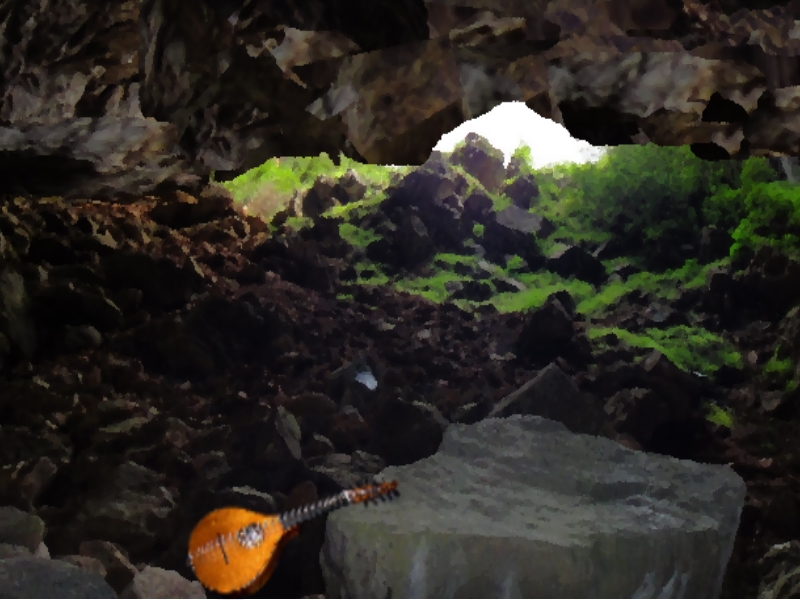
The pilgrims walk out of a cave, followed by the tunes of chirping accompanied by the cittern. “I wonder if Zosimos was able to sing,” says Kyot with a smirk. “His necromantic chants probably doomed him. I hope he never did or will come out of it, responds Baudolino.
October 1193. The bowl of water is chained to the Wall.
EXT. NIGHT. FOOT OF ROCK
On a moonless night, tired, the pilgrims set camp at the foot of a big rock.
EXT. DAY. GREAT WALL OF CHINA
Waking up in the morning, they realize that the rocks are actually a tall and long, long wall. Walking along for a while, they notice a small wooden door on which they knock, hopeful. Only after a while the door opens and a CHINESE MAN, just his head visible, looks at them impassibly. Three pilgrims rush to look through the opening, obstructing it. Baudolino elbows them aside and, with body language, mimics a big flow of water, attempting to ask where river Ganges is. The Chinese man gives him a blank stare, then extending his hand through the opening, points to the West. Baudolino and the Rabbi look back in the direction they were coming from. All others are annoyed and protest. The Chinese is about to shut the small door, Baudolino pushes against it and ask Rabbi Solomon to maybe explain better. Using body language Rabbi Solomon simulates a prayer towards the sky, then picks up a couple of stones and uses them to simulate Sambatyon, the big, noisy river of stones. The Chinese nods and extending his hand through the opening points now to the East. The pilgrims turn to look at the long, long wall extending over the top of mountains; there is another burst of disappointment and incriminations. The head of the Chinese man disappears from the opening, then his hand extends through it, and holding a small bronze bowl filled with water; the bowl is tied up to a heavy metal chain. The offering is welcomed and the pilgrim drink thirstily, calming down a bit. The bowl is yanked by the chain back through the opening and the wooden door shuts closed and locked; the pilgrims protest, but then just look resigned at each other. Baudolino abruptly turns to the East and briskly walks away gesticulating. Turning his head and pointing he shouts that this is the right way to go; they’ll have to keep going East, arrive at the same point where Alexander the Great stopped at the Ganges. Kyot laughs in scorn. “As I said before, Alexander stopped at Indus not Ganges.” “Either one or the other must be Sambatyon,” says Rabbi Solomon forcefully, then joins Baudolino. Ardzrouni hesitates to protest. “There is a passage through the wall,” he says looking at the Cosmas map, then joins Baudolino. Left behind, The Poet furiously claims that this is yet another Baudolino’s lie, pushing them further on this exhausting trip. “I’m going back to Samarkand,” he says. “And I to my Gypsy girl,” shouts Kyot. The two of them watch the others walking away.
August 1194. Abdul sees his bride in the mirror.
EXT. DAY. DESERT
The barren land is scorched, a lake visible in the distance. Exhausted by the heat, barely moving, the pilgrims get to the top of a small ridge. They are hungry, thirsty and looking for bushes and withering plants.
Down the ridge, on a shaded area, The Poet spots a plant and rushes to dig it out. Ardzrouni cautions that it could be the poisonous mandrake; after looking closely at its leaves though, he decides that it’s ginseng which will give them enough strength to get to the lake. “And maybe it’ll give us visions of our future, forever moving away Universal Religion realm,” interjects The Poet. Abdul’s attention is drawn by the “future” remark and watches The Poet’s pulling out the root plant. A strange veiling makes the threesome bolt. The Poet drops the root. The others look up in the skies; a hawk lazily flies in circles. Kyot picks up the plant and looks at its strange shape resembling that of a woman’s body. Ants roam on it Kyot rubs off the dirt, caresses the woman like shape smiling sheepishly, and takes a healthy bite. “I wish it was a real woman, not just a root,” he says, “and not this bitter,” he says as his smile changes to a grimace.
Abdul rushes to pull one out, cleans it, looks at its shape then starts chewing and swallowing. The other pilgrims follow suit, picking the ants and biting on them cautiously. Energized, the pilgrims walk faster towards the lake. Abdul looks happier than all others and flaps his arms shouting, “I feel like flying, flying with the hawks,” and looking up at the hawks flying above.
EXT. SUNSET. DESERT
They arrive at the lake after the sunset. On the other side, flocks of birds and small groups of animals come to drink. A bit wavering, Abdul squashes some bugs and kicks a scorpion away from its path to the shore. The water seems clear and the pilgrims drink thirstily. Sated, they lay down and fall asleep. Abdul is restless but calms down and after a while falls asleep as the sky color…
… gradually changes from dark blue to violet; soft yellow and green lights play like auras. Abdul slowly flaps his arms and takes off to fly together with a hawk. Baudolino flies together with a veiled woman towards Abdul. She is dressed in a light blue wedding gown with a long flapping trena, and holds a wedding flower bouquet. The bouquet morphs into a cittern and Abdul is delighted to recognize his bride playing it.
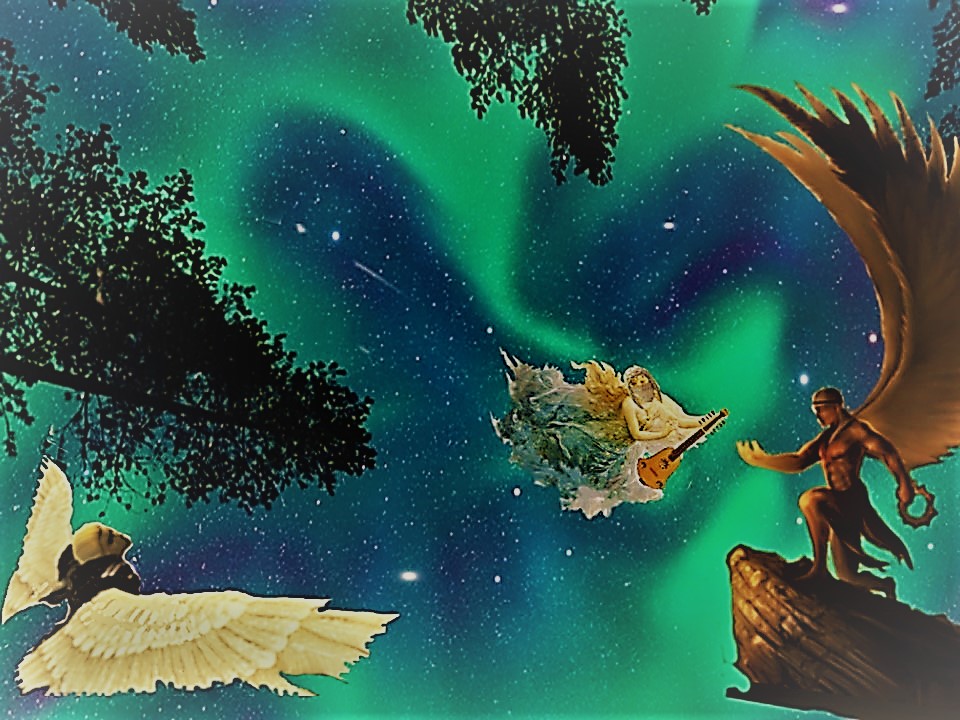
They fly a celestial dance, then she lovingly guides Abdul into a slow descend to the ground. The cittern she holds in her hand turns into a stick, the broom end of it visible under the trena. She gently lays him down to sleep and morphs into a witch.
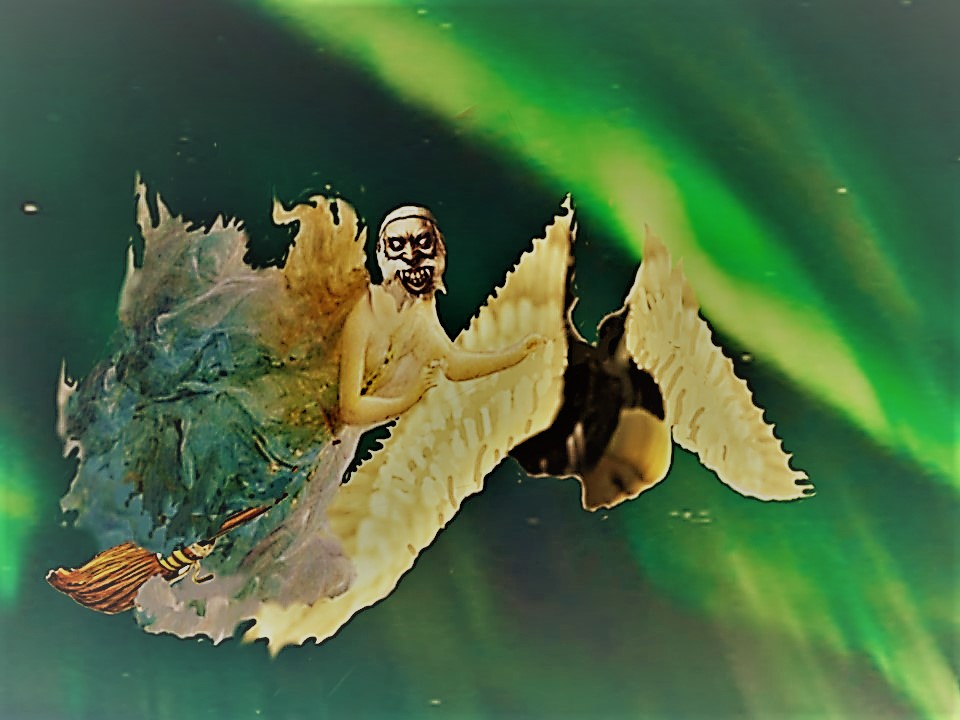
She continues to strike the stick of the broom, the sound of which becomes dissonant. The sound becomes a grunt as the witch morphs into a manticore which stings Abdul’s shoulder with the tail’s stinger. Abdul shakes and grunts forcefully…
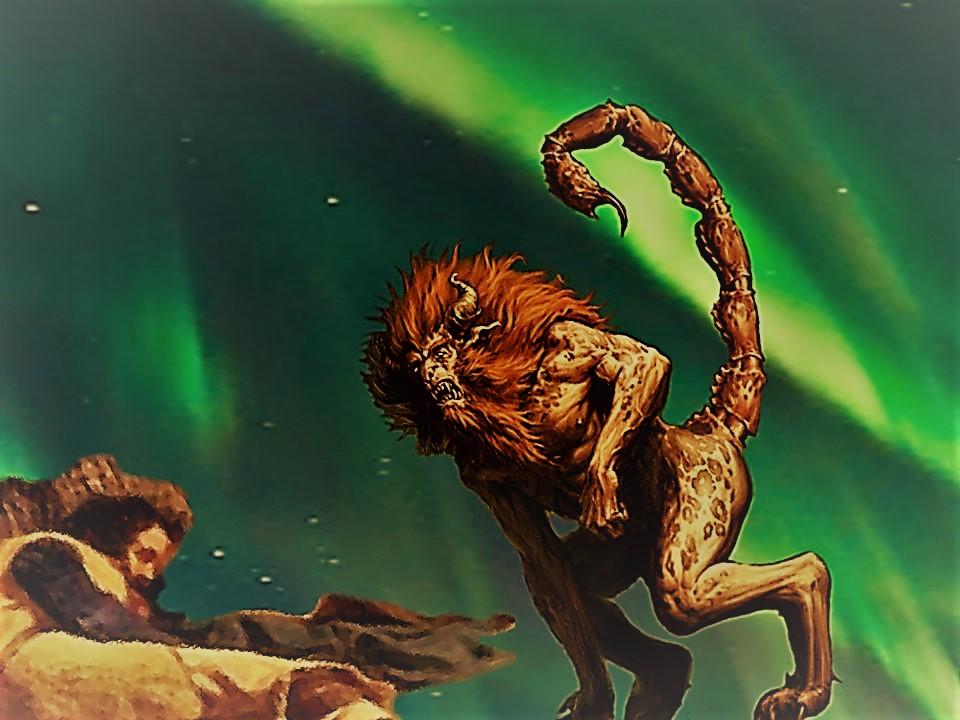
EXT.MORNING. DESERT
… waking everybody up. They’re all dizzy and look sick. A couple of scorpions run away. Abdul stops grunting but trembles, and his face is swollen. “My bride, she, she…” he mumbles confused, has a spasm, then lays motionless. Ardzrouni looks at Abdul thinking “Seems that it was mandrake not ginseng”. Baudolino crawls towards Abdul, looks at his face then listens to his chest. “The witch… she’s not my…the manticore…” gasps Abdul grabbing his painful shoulder. “Don’t worry about the manticore. I dreamt about it too, but we all fought and killed it,” says Baudolino trying to comfort him. Abdul has convulsions, his eyes wide open and rolling. “…O my love, I call you…My mind turns insane…” he recites whispering. Baudolino searches into Abdu’s bag, pulls out the mirror and holds it close to his face. “See? Your bride is here, the future is now, she is waiting for you,” whispers Baudolino. “She says something I can’t hear,” Abdul says looking into the mirror. His face suddenly brightens up as he seems to see her in the mirror. “O, my love from distant land, near now, my aching heart healing…” he recites. Baudolino recites in turn, whispering: “I mingle your song with mine, my love, feel the joy that melts my heart.” Abdul kisses the mirror and after a deep sigh lays motionless.
A swirl of wind envelopes the pilgrims then stops. The pilgrims walk in the distance, away from the grave of their companion.
September 1194. Crossing mountain river on bullock skins
EXT. DAY. TIBET RIVER
Down on the river bank, FEW LOCAL MEN sitting by their inflated bullock skins, watch then wave at the approaching pilgrims.
The men check the ties of the bullocks and, with body language, instruct them to lay face down on them. Kyot complains about the strong smell which gives him a strong headache.
Floating across the river, Baudolino looks behind, at shore they left and sees … Abdul waiving at him to not go further, come back.
December 1194 The four and eight rules of Buddhism enlightenment
EXT. WINTER. TIBET MOUNTAINS
In the calm winter afternoon, a slow-moving cloud uncovers the side of the mountain, a small cave and a large plateau with few stupas and a wooden cabin.
Few YOUNG PEOPLE remove the snow from and around the stupas while a big tiger paces among them. An OLD MAN in sutra position faces the pilgrims seated on the ground. The Hindu ascetic is summarily dressed while the pilgrims are wrapped in thick furs and rags. The old man explains with and impassionate voice that there is no spirit higher than that in his own soul; no higher power than that of his karma. Baudolino heavily concentrates to understand and, at the word “karma”, repeats it and asks with body language what it is. The old man picks up some snow, makes a ball and throws it at Baudolino’s head; Baudolino is surprised and wondering. The old man explains and mimics, while smiling, that his action to hit and its consequence on Baudolino is karma, but bad karma. Showing four fingers of his hand, he continues to explain the four principles of life: suffering, desire for action, liberation from desire and following the path to salvation and self-realization. But one must actually practice eight rules to achieve them, he says showing now eight fingers with both hands. “And perfection of the soul could be achieved through reincarnation,” he concludes as the lion gets close and sits by him. “You want too much, bad karma” says the ascetic pointing the finger at Baudolino and looking closely in Baudolino’s eyes.
December 1194. Baudolino dreams about Hypatia
INT. NIGHT. STUPA ROOM
In the small room, huddled against each other, the pilgrims sleep on the floor. At a corner table lit by a candle, a monk just finished mixing the ink stone and hands a bamboo quill to Baudolino. Baudolino flips it to the pen side and, smiling at the monk, dips it into the small puddle of ink. The monk retires with a bow. Baudolino starts writing on the bundle of parchments. He gets annoyed having to dip the quill too often, gives up writing and, tired, rests his head on the table and falls asleep. The candle’s light… turns into a small moon, slowly growing and rising on the starry blue sky. Behind the moon, the hand of a huge astrolabe follows its movement. A unicorn flies by then lands and looks back. HYPATIA, the historical mathematician, joins the unicorn and waives at someone invitingly. Baudolino opens one eye, looks at the candle’s flame and snuffles it.

March 1195. Every Thing Has a Soul in Buxa Sanctuary.
EXT. AFTERNOON SPRING. BUXA SANCTUARY
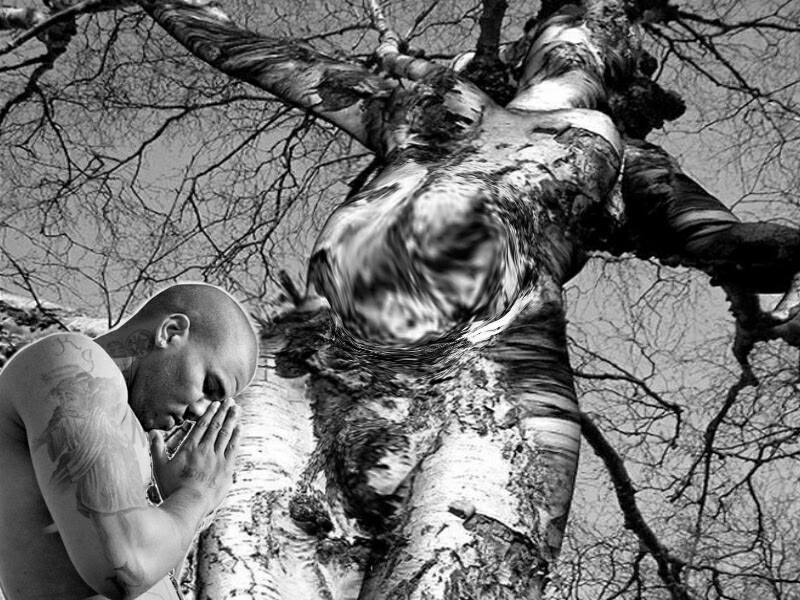
The wind blows and rustles the branches of the birch tree forest.
At the bottom of one, a NAKED, ATHLETIC MAN prays at the base of a big tree. “Mother Tree,” he prays in his mind, “why do I have only daughters, whom by custom I had to give to their mothers? I also need sons, to raise them for hard work and good hunting.” With leaves rustling, the tree answers: “Well, for sure some girls would want to be boyish. Why don’t you ask your woman to let you raise one of the daughters the way you’d like?
The pilgrims just happen to go by and, although curious about the naked man praying at a tree, keep walking to avoid distracting him. A bit further down the road, Boron and Kyot look back and see the man standing up, waiving and running to catch up with them. The man is eight feet tall, athletic and handsome. In a Germanic language, he introduces himself as Andro and invites them to follow on a head trail leading into the forest. He tells them about his community, but stops while walking by a big boulder. He bows at it and talks with the boulder, in his mind, “We want to welcome these people, although not all of them seem very healthy.” The boulder acknowledges with a deep crackling.
EXT. DAY. BUXA DWELLINGS
The dwellings in the small village are built on stilts. Light canoes or rafts made of woven vine and skins, together with food for drying, hang under them. Athletic built MEN and WOMEN of various ethnic groups chat or go about the daily chores: canoes building, ropes weaving and food cooking. Some of them go up or down the ladders, others just climb the ropes to their cabins; younger KIDS play or help the grown-ups. Boron and Rabbi Solomon try not to look at the naked women, while The Poet and Kyot are beaming smiles while looking at them.
The handsome man invites the pilgrims to join a group of people chatting and laughing, sitting in a circle on the ground. TWO HUGE TIBETAN MASTIFS nudge on a small HERD OF TAKIN GOATS. The man gently elbows aside TWO YOUNG MEN who were tickling the belly of A YOUNG PREGNANT WOMAN. Sitting by her, he recounts to all his discussion with The Mother Tree. Baudolino translates from a Nordic like language to the pilgrims then asks why is the tree important. “Is the tree responding?” he asks. One of the women answers that the trees, rivers and stones have a soul, and since they had lived much longer than them, they should know things; and yes, they give good advice, sometimes. A tall man approaches the group and offloads a deer from his shoulders. He reverently tells the others that he had asked the deer to sacrifice itself from the herd, and that the deer agreed. The others keep a moment of silence in prayer and gratitude.
May 1195. Kyot and The Poet carry the water buckets.
EXT. MORNING SPRING. BUXA DWELLINGS
Kyot and The Poet lazily stretch on the porch of the high dwelling and nod at each other smiling. The women in the cabins get out and hand them heavy, empty water buckets. Kyot and The Poet look at each other vexed then worried at the ladder they’ll have to climb down. Down in the clearing, the other pilgrims move back and forth with the Buxa people, some cutting wood, some making ropes some feeding the cattle, all morning chores. Cautiously, The Poet and Kyot manage to get down then stop to listen in to Baudolino’s conversation with Andro. He says that the place they’re going to is not too far but there are big water flows they’ll have to cross, and they’ll need ropes and axes. Kyot and the Poet look at each other then leave walking towards a small water stream. Coming back, they struggle with the big, heavy buckets. Puffing, Kyot says “I’m not going any further.” “You’re wrong, the longer we stay, the more work will have to do for these women,” says The Poet smartly.
June 1195 Rabbi Solomon crosses Sambatyon on Sabbath
EXT. SUMMER DAY. GADADHAR RIVER
The pilgrims wake up in a distant rumbling noise. They look at each other in hopeful acknowledgement. Rabbi Solomon is overcome by joy. “Must be Sambatyon, Sambatyon! My Ten Tribes brothers in faith crossed it!” he yells and starts running towards the source of the noise.
The pilgrims wake up in a distant rumbling noise. They look at each other in hopeful acknowledgement. Rabbi Solomon is overcome by joy. “Must be Sambatyon, Sambatyon! My Ten Tribes brothers in faith crossed it!” he yells and starts running towards the source of the noise.
He stops on the bank of a flood of mud, tree trunks and boulders. The noise is deafening. The other pilgrims join Rabbi Solomon and watch the flood in wonder.
They walk along the bank to find a crossing point but there isn’t one. Gradually though, the flood slows down. At a narrow gorge the flood is blocked by a mound of boulders and trunks. Then the flood stops. Baudolino, carrying his bag and a rope bind, rushes over to use the crossing opportunity. The other follows, but not by all. Rabbi Solomon would not, not today, today it is Saturday, the Sabbath day. Ardzrouni argues that it is not Saturday, but Rabbi knows better, he kept both Friday’s and Saturday’s count since Abdul died. Baudolino looks back at them from a bolder half way to the other side. Ardzrouni mimics towards Baudolino that Rabbi is weak in his head. Baudolino mimics whacking himself in the head which Ardzrouni understands, gets behind Rabbi and whacks him in the head with the handle of the axe, albeit hesitantly and as gently as he can. Rabbi Solomon faints, and Ardzrouni takes him on his shoulders and across the perilous pass. As soon as they’re all on the other side a huge wave of debris comes down washing away the passage and is about to overflow the ridge they were on. They run away to higher ground in the deafening noise of Sambatyon.
July 1195 Ardzrouni cannot save Boron
EXT. SUMMER SUNSET.BRAHMAPUTRA RIVER BANK
From a high hill, the pilgrims look in wonder at the immense expanse of water flows meandering through big patches of sand. Their wonder turns to hopelessness. “How are we going to cross this?” asks Kyot in anger. Ardzrouni looks at the trees behind them and responds that they’ll have to build a raft. Baudolino encourages all to go to sleep; they’ll need strength to cut the trees and build the raft.
EXT. SUMMER MORNING. BRAHMAPUTRA RIVER BANK
Baudolino and Ardzrouni rope up two trunks. The Poet and Kyot chop branches of tree, the first forcefully, the second annoyed by the task. Down by the water flow, Rabbi Solomon tries to fish with a spear. A small fire smolders under few fishes.
EXT. SUMMER AFTERNOON. BRAHMAPUTRA RIVER
The pilgrims float on the raft.
EXT. SUMMER SUNSET. BRAHMAPUTRA RIVER
The raft leaves drag marks on the sand. Exhausted, the pilgrims pull it towards the next water flow. They stop hauling it and decide to eat and sleep.
A ripple of water from the rising level of the river inundates the pilgrims. Ardzrouni grabs the raft which was about to be carried away. The blowing wind brings dark clouds above them and a heavy rain starts. All jump in a hurry on the draft, and start paddling. The sand patches get covered by the increasingly muddier, quicker water flows.
EXT. AFTERNOON MONSOON RAIN.FLOODED VILLAGE
The raft floats on calmer waters through the middle of a large dwelling. LOCAL PEOPLE walk in the deep water carrying their belongings on their heads, some on canoes or rafts. Baudolino attempts to communicate verbally with them, then with body language, but he only gets blank stares.
In the evening, the pilgrims are again in the middle of a turbulent river flow. The raft starts breaking apart. Boron falls in the water first, then Rabbi Solomon. Ardzrouni tries to save them both but manages to hold on to Rabbi Solomon only and pulls him back on the trunks. Boron disappears under the water. The Poet and Baudolino struggle to tie the raft back together.
August 1995. The poor people of Pnadpetzim
EXT. SUMMER MORNING. BRAHMAPUTRA RIVER BANK
A couple of tree trunks slowly float in the small bay of the river; its water level had receded. Baudolino wakes up on the river bank, stands up and looks around. He removes some of the dirt and debris covering his body. The Poet sleeps, still hugging a trunk. Baudolino wakes him up then sees Ardzrouni, Rabbi Solomon and Kyot washed ashore, farther away, on a piece of the raft. He gets there and looks at the bundles with their belongings, some ropes still taut on the trunk, some loose. “I couldn’t hold on Boron,” says Ardzrouni making the sign of the cross, “may his soul live in peace.” Distressed, the others cross themselves and rest in prayer. Baudolino unwraps the box with the secret compartment and opens it; the parchments are in there. “Could everything that we’ve imagined be true? And if it is not true should I follow Otto’s advice?” he thinks.
Ardzrouni looks at the vast expanse of unusually tall grass swaying in the breeze. Beyond it, a herd of markhors run away under lions’ attack. He walks into the grass thicket. A bit further away, The Poet’s attention is drawn by a disturbance in the tall grass’s tops; something seems to approach fast through it. He grabs his sword and shouts at the others to watch out. Ardzrouni hears him and stops, alerted. Right in front of him, the tall grass is parted by a crutch and Ardzrouni is startled; a HANDICAPPED MAN holding a crutch, with a Skiapod tattooed on his barren chest, looking at him. Somewhat recovering, he calls the other, “Over here!”
The others join and the handicapped man greets them, “Aleichem sabi’!” The Poet asks the creature, in French, who he might be. The creature cocks his head not understanding but responds smiling: Iani kala bensor.” Baudolino asks the same question in Latin and the infirm cocks his head and answers in Greek, “I iz Skiapod Gavagai,” pointing at himself. You iz Magi, language Prester Johannes speak”. “Are we on his land?”, asks Baudolino elated. All others brighten-up and surround Gavagai. “Border Priest and King Johannes,” he responds. The pilgrims are ecstatic about the proximity with the Realm and hug each other. Gavagai smiles and rises his crutch joining in the excitement. He them waves at them to follow through the tall grass. The Poet and Kyot follow laughing by mimicking the limping. Soon, they all disappear in the tall grass.
Coming out of the thicket, they encounter a SHORT MAN with big, purposely deformed earlobes, a tattoo of a short man with elephant ears on his chest. “Ouiii, ouioioioi, aueua!” he greets them. Gavagai speaks with him, pointing at him, then towards the distant village, then back at the pilgrims. The big ear man argues by pointing at Gavagai, the village and the pilgrims. Upon the strong rebuff from Gavagai, the creature energetically turns and runs away towards the village. “He Panotian family zink wrong, they heretics,” says Gavagai limping backwards to keep the conversation going. “That’s normal,” mocks him Kyot, “he is heretic because he looks different than you.” “They no different, only zink wrong,” says Gavagai. “So, if they zing wrong and you zing right, you two are different,” intervenes The Poet. “No, I zink they zink wrong, they zink I zink wrong, we equal, no difference,” states Gavagai stubbornly. Baudolino laughs at The Poet and Kyot giving up the argument by exchanging annoyed glances. “If we want to understand these people, we have to look at them according to our vision,” says Baudolino; The Poet and Kyot nod, the first a little dumb, the second smirking.
The threesome leads the group through an orchard where some FAT, SUMO LIKE PEOPLE move lazily from one tree to another to pick apples; there is slowness and some effort in their picking up the apples from the branches and munching them. They have a fat belly, long neck figure tattooed on their back. Gavagai berates them as Messalian, a family of weak, lazy people; worse off, they eat all day the fruits of the trees cultivated by others. The Poet asks why the “others” don’t punish them. “What mean punish?” asks Gavagai. “Well, beat them up, drive them away! Don’t you hate them?” responds The Poet irritated. “What mean hate?” asks Gavagai again, “Messalian family only zink wrong, why beat.” The Poet raises his hands exasperated which Gavagai registers as a threat, falls on his back and rises his crutch and big, callused foot in defense. Baudolino intercedes by pulling The Poet away from Gavagai and comforting the latter, “Don’t worry about him, he only zink wrong.”
They all resume walking towards the village. The tops of conical bamboo huts stick above the abundant vegetation. A tall, rundown wooden structure, perched on the side of the mountain resembles the Babylon tower.

August 1195. The Eunuchs greet the pilgrims
EXT. AFTERNOON. THE VILLAGE OF PNDAPETZIM
Guided by Gavagai and Baudolino, the pilgrims walk through the Pnadpetzim market square full of makeshift tents. Houses on stilts and dwellings carved in the mountain surround the market. POOR, PEOPLE with Skiapods, Blemmyae and Panotian tattoos, trade food and artifacts; some of them make their way through the crowd riding dwarf elephants or hairy donkeys. Big and small cages with uncommon birds and animals are stacked here and there. People get in the path of the pilgrims to look or touch them while Gavagai shoos them away. A HUGE MAN with the tattoo figure of a Blemmyae without head, but with the eyes, nostrils and mouth on his chest, gets close and touches Rabbi Solomon’s beard.
An armed short NUBIAN MAN elbows his way through the crowd and prostrates himself in front of the Poet asking to be killed. Looking down at him, then at an annoyed Gavagai for an explanation, Baudolino pulls the creature up telling him that he is needed alive, such a great looking warrior. Gavagai pushes the Nubian away then explains to Baudolino, “He want sacrifice for glory, but no war, he zink wrong.”
More PEOPLE join the crowd and whispers turn into exclamations and nodding at each other, “The Magi, the Magi!” Baudolino pulls the box out from his bag and looks at Ardzrouni who in turn nudges Rabbi Solomon. The three of them walk through the crowd now, holding the biblical relics, the box, the frankincense and the censer cup. Gavagai draws their attention to the procession of armed NUBIANS and richly, colorfully dressed EUNUCHS climbing down the tower’s stairs. The procession stops by the pilgrims and two PYGMIES offer cakes on a plate.
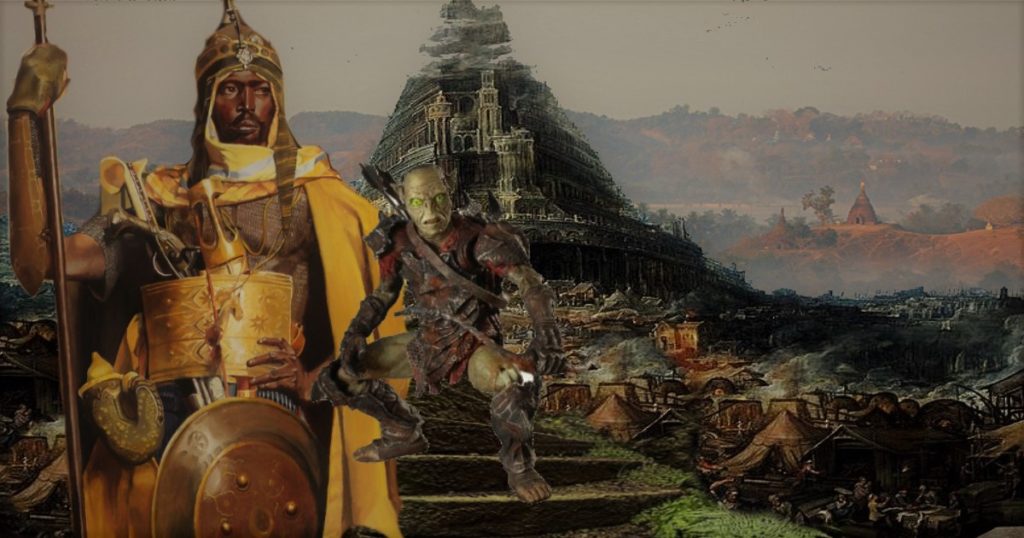
A high-ranking, TALL EUNUCH emphatically greets them, “I, Praxeas, Chief of the Deacon Guards, and all in Pnadpetzim, have awaited for your return from the birth of Our Lord Christ Jesus. It fills me with joy to see that the clement nature had smoothed your path to Pnadpetzim, in which I wish you a happy sojourn.” Baudolino, Rabbi Solomon and Ardzrouni hold their hands extended with Magi’s objects. Praxeas seems to go through an emotional fit when he briefly looks at Rabbi Solomon frankincense; he then caresses at length Ardzrouni’s studded censer, then, still looking at the latter rests his hand on the lid of Baudolino’s box. His gaze still locked on the studded censer, he negligently attempts to open Baudolino’s box. The light coming out of it surprises him; at the same time Baudolino slams Praxeas hand, thus closing the lid down. Praxeas jolts as if waking up from a reverie. “Sir, I express to you our joy in having reached this noble, rich, and wondrous city of Pnadpetzim, the most beautiful and flourishing you have ever seen in your arduous journey.” “We come from afar, guided by the Star, and bring these most precious Christianity relics to Prester Johannes, together with a message for an alliance with the powers of the Holy Roman Empire and Jerusalem Kingdom,” says Baudolino. His eyes shifting meaningfully from the censer to Baudolino and back, Praxeas says as if sorry, “How grand of a mission,” says Praxeas almost unimpressed. “Unfortunately, the Deacon will not be able to see you for a while. Until then though, I would be honored if you accept my humble hospitality,” he says extending his hand towards a building next to the tower.
INT. EUNUCH LUXURIOUS QUARTERS
With Baudolino and Praxeas leading, the group walks through a large scriptorium where people with tattoos of their families, shuffle paperwork on tables. A couple of armed Nubians walk amongst them watchful. Bored Eunuchs stand still along the walls. At the end of the room, on a large podium, an OLD, TALL MAN scribbles on a big book and watches the people once in a while. Behind him, the massive portrait of Prester Johannes and his son is bordered by religious flags.
Praxeas guides them through a side door, then a long corridor. He speaks with disdain about the low life, Pnadpetzim peoples’ families “They’re all smart to themselves and stupid to each other. To me, they’re all stupid, and glad about it since I can better control them.” The Poet is curious to know why is that. “Because they revere the goodness of Prester Johannes and fear the threat of Magogs’ invasion.” says Praxeas pointing towards an imaginary distance, “and trust that I can defend them.” Praxeas stops and points at two adjacent rooms inviting the pilgrims to rest and excusing himself for having to attend to his duties. “Make the best of your stay with us, I’ll let you know when the Deacon can see you.” The pilgrims are about to ask questions but they don’t because Praxeas had already walked away.
November 1195. The hurricane hits Pnadpetzim.
EXT. DAY. PNADPETZIM MARKET
The pilgrims walk with Gavagai through the market. The poverty of the city is obvious. The wind blows and the sky gets covered by clouds. People happily trade and bargain. Some Panotian tattooed women wave the hair of hairy donkeys and adorn them with colorful bows and ribbons. Looking around, distressed, somewhat mocking, Kyot asks Gavagai “Are there any rivers of milk and honey around?”. “Digging for diamonds?” asks the Poet. “The Eunuchs say, maybe in the Realm,” responds Gavagai. “So, how come nobody rushes to get there?” asks The Poet. “We are in a rush to see the Deacon, then cross the border. Which way?” intercedes Baudolino. “I zink only Eunuchs answer,” says Gavagai.” But what the Deacon zing?” asks The Poet. “Deacon no zing, orders!” “So, if the Deacon orders, we can cross?”. Gavagai looks around, alert, “If Eunuchs let him. Eunuchs dangerous, better careful.”
A gust of wind makes Gavagai to look up at the completely dark sky now, then at the row of cages sitting on the hill’s ledge. Inside of them, unusual birds are agitated and croak loudly. “Big storm come,” he says rushing the pilgrims towards their quarters. Thunders struck, the hail comes down and the pilgrims and creatures run for cover.
INT. NIGHT. BAUDOLINO’S ROOM
A streak of rain water runs . You also imagined some good things for yourself, didn’t you! If you want yours to be true, you must believe in them. Like we do,” he concludes nodding at the others, like inviting them all the agree; he gets only some hesitant nods. from under the door. Bent over a parchment, Baudolino draws strange creatures and listens at times to the sound of the big storm. The Poet and Ardzrouni play a game, moving small stones on chess like squares drawn on the floor; the latter stands-up to stretch and peeks amused at Baudolino sketches.



Praxeas enters the room, followed by Rabbi and Kyot, and tells all that the audience with the Deacon is on hold indefinitely. The pilgrims are shaken by the “hold indefinite”. Baudolino asks why waiting for the visit and not just cross the border. “That is even less likely. The storm had collapsed the creek’s passage,” says Praxeas blankly, “and it’ll take time clear it. Again, make the best of your time while waiting,” he says walking out of the room.
The Poet is aghast, the others distressed. Kyot mocks everybody that what they imagined in the letter and wanted to be true never will; that slip of tongue puzzles Ardzrouni who asks, “What imagined in the letter means?” The others look at each other, mum. Ardzrouni asks angry, looking at Baudolino, “You, crazy liars wrote that letter?”. “It’s not crazy, to have imagination, and not a shame to lie for a good deed. You came with us to save your life. You also imagined some good things for yourself, didn’t you! If you want yours to be true, you must believe in them. Like we do,” he concludes nodding at the others, like inviting them all the agree; he gets only some hesitant nods. “And after all, this is how it’s going down in history, in my chronicle,” he continues pointing at the pages he was drawing on. “If it is written, it becomes the truth,” he adds seemingly struck by the smartness of his conclusion. There are smirks from all. “Ridiculous, how could I lie to my friend Queen Tamar!” argues Ardzrouni. “Easy, you’re noble enough to do that. It’ll be wise though to marry her first,” says Kyot. The Poet starts laughing. Kyot says “Your laughter needs an echo,” and starts cracking of laughter. All others join in the fun. Ardzrouni gets out slamming the door. “But how this helps these poor people?” asks Rabbi, trying hard to cover the brouhaha.

“By thinking of them as special, rather than unfortunate,” says Baudolino smartly. “I’ll make the best of this one!” declares Kyot smiling.
December 1195. Pilgrims blend in with the creatures.
EXT. DAY. PNADPETZIM CITY
The Poet and Kyot eye TWO PANOTIAN FEMALES who giggle at them while chastely covering their small breast with the ears. At the door of the church the females were heading to, The Poet hesitates to follow but Kyot nudges him in.
EXT. DAY. HIGH PLATEAU
Walking, Baudolino looks at the LONG NECKED MESSALIANS who lazily, effortlessly pick apples with their beak directly from branches. “Can you keep up seeing these through your imagination?” asks Ardzrouni ironical. “Yes, as imagination leads the way to a new reality,” answers Baudolino confidently. “Use yours, you may invent something that was not yet invented,” mocks Baudolino in turn.

Baudolino is deep in thoughts. “Why is the Deacon not seeing us? How come our message of alliance with Prester Johannes does not impress him? Praxeas would like to know more about the message, but if I tell him, what will he do, delay or help us?” At times, they have to climb over big boulders that block the passage.
Blossoming ivy runs along small waterfalls on the versants of the crevice. Ardzrouni is busy thinking and admiring the nature. “No desert or bare land. Everything is pleasing, except for these unfortunate creatures. Special?” he doubts looking at Baudolino. “The Realm may exist after all…advanced sciences to invent something not invented…rich land to lay at the feet of my Queen? Maybe even…”
The passage ends into a marsh, to Baudolino’s disappointment.
Baudolino and Ardzrouni are startled by shouts of Nubians jumping from bushes and pointing towards the horizon, rejoicing and embracing each other. “The Magogs!” the exclaim, one of them drawing Ardzrouni’s attention to the plumes in the faraway mountains. Ardzrouni looks over, then raises his shoulders dismissively. “It’s just clouds,” he says in a low voice, turning to Baudolino. “Clouds may announce hell,” says Baudolino. “Why can’t you imagine some lovely cherubs in them?” mocks Ardzrouni. “I can, even make them beautiful, but they may sin of pride and rebel, become devilish,” responds Baudolino.
June 1196. Pnadpetzim enters the Iron Age
EXT. SUNSET. AMPHITHEATER
In the setting sun, the small clouds look heavenly. In the amphitheater, a GROUP OF NUBIANS practice fighting. Their skills are lame, and the swords often break. When that happens, they go to a pile of them, grab a new one and return to fighting. Baudolino, The Poet and Ardzrouni muffle their laughter with smirks. Standing, the FAT NUBIAN Chief shouts stuttering encouragements and praises at the fighters. Praxeas turns around to the pilgrims sitting behind him and rolls his eyes, annoyed. The Poet stands up to asks the Nubian Chief why are the swords breaking. The Chief attempts to respond, but stutters, and Praxeas cuts in to answer: “We’ve learned about swords and spears made of something much stronger than wood, but the fortune of having that was not given to us.” Ardzrouni joins the conversation.” That’s called iron,” he says “iron must be somewhere in the ground.” “It may be, but God did not show us the way to it, be it in the ground or in the sky,” says Praxeas raising his head and hands towards the beautiful clouds in the sky, as if praying.
One of the fighters is about to hit his partner when a stone slams in the sand, right in front him, and blasts a splatter of it in his face. Dizzy, the Nubian spits the sand from his mouth, looks at the smoldering stone then at the sky. Trembling, he points at the traces of fire in the sky, as more big and small stones hit the ground with a thump and the walls of the amphitheater with loud clacks; thunder and booms come from the sky. “The Devil’s Magogs! The Magogs attack from the sky!“ shouts the Nubian Chief without stuttering. People freeze at the sound and sight of the shower of flaming stones; they run in panic to shelter, bumping into each other. “God may have just given us the iron, the hail with iron!” says Ardzrouni.
October 1196. Ardzrouni forges a sword.
EXT. DAY. PNADPEDZIM CITY SURROUNDINGS.
A plume of smoke rises, and a metallic hammering echo comes from the forest. In a shack, Ardzrouni hammers on a hot bar, shaping it into a sword. A rudimentary glowing furnace made of stones and a pile of charcoal are next to him. Two Nubians take turns to keeping the furnace glowing by pumping a bellow. Ardzrouni’s hammer head is a small meteorite tied up with rope to a wooden handle. The frayed rope breaks and the meteorite bounces up. Ardzrouni dodges to avoid the hit. The Nubians laugh at him. Ardzrouni praises himself, on the side: “Intelligence is the faculty of making tools to make tools,” then gives a dirty look to the Nubians urging them to keep pumping, keep the fire alive.
1196 November. Kyot juggles to entertain
EXT. DAY. PNADPETZIN MARKET
Colorful clubs juggle on the background of the partially sunny sky. Kyot has fun juggling and looks around to draw appreciation for his performance, first from The Poet, who claps, then from the surrounding crowd of Blemmyes, Panotians and Cyclops. Two Panotian women dance to the tune of flutes played by two pygmies. Rain water rivulets flow on the muddy ground. The Panotians’ feet splash it around and the creatures have fun. Baudolino walks by and smiles, accompanied by Ardzrouni.
May 1197 May. Praxeas throws a party
INT. EVENING. PRAXEAS QUARTERS
The richly decorated, round room is bordered with alcoves; Praxeas and the pilgrims sit on pillows in the central, bigger one. Above them, a mural depicts Prester Johannes in radiating glory and his young, angelic son the Deacon. Groups of Eunuchs and Nubians, sitting in the other alcoves, nibble on food and stick their tongues in tinny cups.
Baudolino looks around then towards the center of the room. Panotian females dance to the rhythm of pygmies’ drums and flutes. Other pygmies bring big, small and tinny plates with food and drinks in Praxeas’s alcove. Under the quizzical glances of the pilgrims, Praxeas presents with gusto the big, roasted heads of a horned sheep and antelope, on the big plates, then the spiky heads of methagallinarii and cametheterni on the smaller ones. Pointing at the latter, the Poet stiffens, hiding his revulsion with difficulty, and says that these are dangerous, poisonous animals, as far as he knows. Praxeas responds smiling that the more poisonous, the tastier. The Poet does not buy it and chooses instead to gulp down the liquid from a tinny cup; his head looks like swelling and the eyes bulging; he tries to speak, but cannot. Kyot hits him on the back and Praxeas, smiling, clarifies that this burq drink is so strong that one is supposed to only dip his tongue in it, not drink.
1198 February. Rabbi Solomon teaches herbal medicine
EXT. DAY. PNADPEDZIM FOREST.
Rabbi Solomon walks in the forest looking, plucking and sorting out plants. He looks at one and explains to the Blemmyae in his company. the differences between the good and the bad ones to eat. “You beard like rabbi,” says the Blemmyae. Pleasantly surprised, Rabbi Solomon asks, “How come do you know about rabbi?” “All Pnadpetzim talk long beard people, many long beard once traveled here,” responds the Blemmyae pointing beyond the mountains. “My lost tribe brothers!” exclaims Rabbi Solomon radiating of joy.
December 1198. Baudolino teaches house building.
EXT. DAY. PNADPEDZIM OUTSKIRTS
A couple of Cyclops put clay bricks in a kiln, while others hammer stones to shape them up. Under Baudolino’s direction, other Cyclops stack the stones and the bricks building a round dwelling. Gavagai rushes in hopping and happily announcing that the Deacon had finally sent an invitation. Baudolino embraces him, then takes the roll of fabric.

The Cyclops look with disdain at Gavagai then reproachfully at Baudolino. “How could the Magi be friends with these heretic Skiapods?” wonders one of them. Gavagai gives him a dirty look. Baudolino ignores the irony and starts reading the message. He looks-up at the distant, run-down Deacon’s tower …which turns into a beautiful Babylon lookalike palace. Around it, small, golden rivulets meander through colorful, luxuriant vegetation. Colorful birds fly over the plumes of perfume rising from flowers.
December 1198 The Pilgrims visit the Deacon.
INT. DAY. DEACONS’ PALACE
Baudolino, guided by Praxeas and followed by Rabbi Solomon and Ardzrouni, walks on a long, curved, slightly slanted upwards corridor lit by rows of candles. In a reverie like state, Baudolino admires the glitter of the precious stones studding the walls. “The Deacon was in prayer for a long time now, badly shaken by the monsoon floods and firestones from the sky; he calls them the tears of St. Laurence,” explains Praxeas. Two Eunuchs uncross their spears to let them enter a large room with colorful stained-glass windows all around it. .
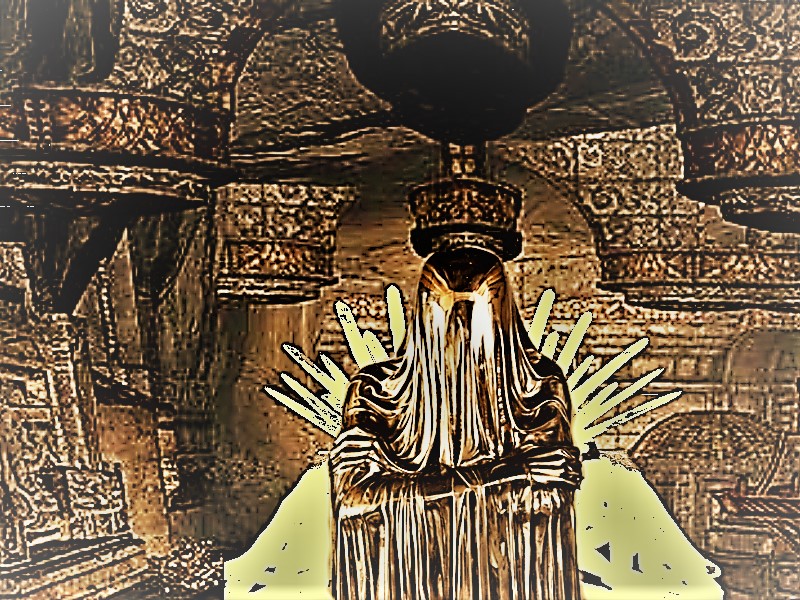
In the middle of the room, the Deacon, a draped shiny mantle covering his head and body, sits on a stone carved throne. He raises his head and watches the visitors through a small, meshed opening at the eye level.
Praxeas asks the threesome to stop ten feet away from the Deacon and bend down. Baudolino looks up at the Deacon and presents himself as the emissary and son of the Holly Roman Emperor. With a faint voice, the Deacon courteously greets Baudolino and tells him how happy he is to see people so closely resembling the Magi, a good omen after the terrifying tears of St. Lawrence. “What were they foreboding? The Magogs threatening my father’s Realm?” he wonders. “May my soul heal of fear in the presence of the emissaries of the wonderful Western realm of Jerusalem, Evropa, Byzantium,” he adds. Baudolino responds by praising the Deacon’s hospitality and the renowned majesty of his father, Prester Johannes, a Saint and the King of the Universal Religion Realm. “The Realm has welcomed, over the centuries, people coming from the whole world, people of most diverse beliefs,” he declares in an official tone. Praxeas nods in agreement. “Some of them sinned with hate though and were sent back here to heal. So, I am to help these unfortunate people,” concludes the Deacon sighing. ”But I am eager to hear your stories,” proposes the Deacon, slowly standing up from his throne.
Baudolino embellishes the description of the Papal palace in Rome, St. Sophia in Constantinople’s church, the Holy Sepulcher and the Dome of the Rock in Jerusalem, the Zoroastrian and Buddhist temples. He dramatizes the terrible obstacles encountered during the pilgrimage, the mythical, frightening demons and the river Sambatyon. The Deacon quickens his to and fro pacing. Rabbi and Ardzrouni are mystified by Baudolino’s embellishments and lies. Worried by the Deacon’s state, Praxeas steps forward and pushes a fuming censer towards the Deacon. Reluctantly, the deacon hesitates, then inhales and slowly sits down inviting Rabbi, with a glace, to tell his story. Rabbi Solomon hopes that he could join the descendants of the 10 Lost Tribes of Israel. Offering a bag of myrrh to the Deacon, Ardzrouni expresses the hope that the harmony in the Realm has also led to the progress of science. Deacon slightly nods and gradually lowers his head in a sign of tiredness. Praxeas signals to the pilgrims that the audience is over, and they all leave. The Deacon raises his head as if to ask them to stay.
April 1199. Magogs behind the mountains.
EXT.DAY.TALL GRASS VALLEY
“The Magogs are again behind the mountains. The sickly Deacon likes us when they show up, rebels against when they don’t,” says Praxeas. Baudolino nods, more in the sway of the ride than agreement. They slowly swing in the double saddle atop of a white dwarf elephant.
The caravan advances through a field of ferns, then tall grass. The upper body of the riders, the heads of the elephants and hairy donkeys are barely visible. The Poet and the Chief Nubian share an elephant’s saddle, followed by Ardzrouni and Rabbi Solomon, each riding hairy donkeys. Kyot and a Panotian woman ride a hairy donkey together; the ears of the Panotian female wrap Kyot’s chest. Gavagai hops along the Poets’ side, and few Nubians, barely visible through the grass, escort the caravan.
The caravan animals trot out of the tall grass into a clearing. Baudolino raises his hand to stop. “What’s that? They were not for them?” he asks pointing at the hovels and the heads of the Messalians sticking out through the unfinished roofs. “They occupy, we try run them away with stones, but they threw stones back,” explains Gavagai. “And that was not hate, of course” mocks The Poet, “throwing stones was more like a sport”. “What iz sport?” asks Gavagai.
The caravan hikes up through the canyon. Nubians, fighting for practice with steel spear and swords, stand at attention. The Poet mocks Gavagai again, “Why don’t they kill each other, if they want to be killed?” “That no sacrifice, they want kill by others,” he answers.
EXT.AFTERNOON. HIGH PLATEAU
The caravan arrives on a high plateau overlooking the plain towards Pndapetzim and the distant chain of mountains on the other side. A small lake slowly overflows towards a cascade. The riders dismount. The Nubian Chief walks to the ridge and points at the barely visible plumes of smoke in the mountains. “Dddd-ere”, he says, then pulls a small flask from his belt, sticks his tongue to lick a drop of burq, then hands the flask over to The Poet; he takes a good gulp and exhales with satisfaction. Praxeas pulls Baudolino away from the group, who in turn pulls The Poet and Ardzrouni to follow. “We spotted them in the distance, a long time ago, “but they did not attack. If they do, Eunuchs cannot fight them. We have an escape route, that way,” says Praxeas nodding towards a gorge in South’s direction, and we’ll collapse its walls to close the passage to the Realm.” “No, no, we have to fight!” says The Poet energized. “Who’s going to fight, the Nubians? They’ll throw themselves under the Magog’ horses’ hoofs, for the joy of the sacrifice,” says Praxeas laughing. Baudolino is serious though: “Why do we need to fight? Let’s just cross to the Realm and close the passage. That’s what we need!” “But not what we need,” argues Praxeas, “there is too much equality in the Realm, and we’d lose our status, our privileges. However, if we have an alliance with you, that could change. Fight for us. With your status of Magi to these unfortunate people and a win against the Magogs, our stature will significantly increase, both here and over there,” proposes Praxeas. “We did not get this far to fight the Magogs,” argues Baudolino, “we have another mission. We cross, and if necessary, we’ll fight from the Realm.” The Poet pulls Baudolino aside and whispers, a bit tipsy, “We wa-want to fight here, Praxeas is offering us an imm-mense cha-cha-nnnce. They are rich and po-pow-aw’ful,” then, wavering under the influence of the burq, pulls him back to the group. “We’ll teach everybb-ody what a good sport…I mean fa-fight is. Le’ me tell you howwww…,” he says pointing around at the landscape between the mountains and Pnadpetzim valley which changes from real to…virtual. Irregular square patches of tall grass, bushes, trees and small hills emerge to form a huge chess board. Behind the mountain line, the chess like figures of the Magogs pop up and down, threatening. The perspective pans towards the Pnadpetzim valley. “On the front la-la-ine, the Long Necks will signal the atta-haack or retreat of Magogs’ mooovements,”…the camouflaged Messalians heads stick out from the hovels rendered as chess towers. Some burn green grass for white, some oil-soaked rags for black, some throw stones, all done in slow motion… “The cyclops and the ble-hah- mmyaes are hidden in the grass and boo-shes.”…The Magogs and their chess like horse figures advance hopping between the two areas. “The ble-hah-mmyaes jump first from the ahh bushes to con-fuse the Magogs”…at the sight of the headless Blemmyes, the horses start braying of laughter. The Magogs turn towards the Blemmyes and the cyclops attack from behind with the bats. “Next line of defense, the pee-pygmies and Ssskiapods.”…a volley of darts flying from the tall grass hit the Magogs’ horses from one side; upon turning, the Skiapods jump to pull them down from their horses…”Any Magogs es-cha-caping”…some of the Magog chess figures advance between the hills towards Pnadpetzim. “..the Panotians over-woaa-whelm them by la-landing on their heads” …from the heights of the hills, Panotians with their huge ears spread out as wings dive as kamikaze on the Magogs, through the volleys of their arches’ arrows.
“Long live the most holy Magi, long live Pnadpetzim!” bursts Gavagai jumping up and down excited. Ardzrouni is positively impressed while Praxeas embraces The Poet. Distressed, Baudolino had covered his face with the hands and walks away. Praxeas takes The Poet over the shoulders and returns to the group. They mount the animals and call Baudolino to join them. He waves at them to go ahead and they do. Gavagai stays behind and watches Baudolino.
Baudolino looks at the distant mountains, then at Praxeas’ gorge escape path. After a while, he gets the donkey’s harness and goes down that path, through the narrow canyon.
April 1199. Baudolino meets Hypatia.
EXT.AFTERNOON. WATERFALL LAKE
“The Realm must exist. I only need to believe it,” he thinks coming out of the dark canyon. The heavenly lit clouds of the afternoon sky and sunlight dazzle him. He looks around at the beauty of the small waterfall bordered with colorful vines, flowing into a small lake. On the opposite side, a grassy clearing ends into a luxuriant forest. He walks around the lake and, looking at the top of the fall gets blinded by the sun. He shades his eyes and turns his head towards the shaded forest.
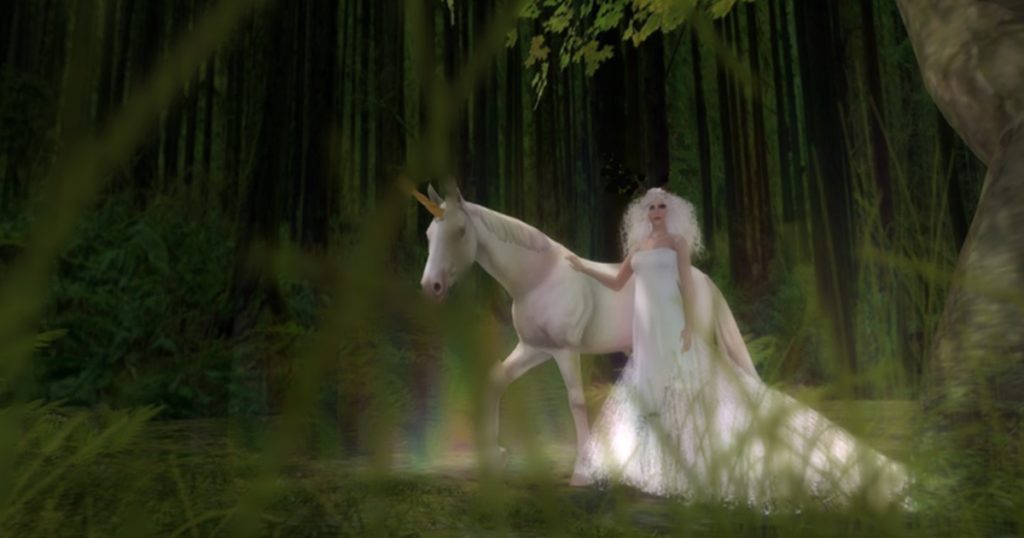
A white unicorn comes out of it. In a memory flashback he sees…the unicorn of his youth’s imagination. He rubs his eyes to wash away the vision, but it doesn’t. Baudolino’s donkey whines appreciatively and seems to be smiling at the beautiful unicorn.
Baudolino’s donkey whines appreciatively and seems to be smiling at the beautiful unicorn. The unicorn trots a little and turns its head towards the forest. A beautiful YOUNG WOMAN, long, whitish hair, dressed in a long white dress, is surprised by Baudolino, but keeps advancing towards him. Baudolino is agape and retreats one step. The woman had recovered from her surprise and smiles. “You are neither a Eunuch, nor a silly Nubian,” she says with a melodious, confident voice, scrutinizing his sword and the beard. “But you are…a man! A man of war, I see.” Baudolino looks at her eyes and hair slightly changing colors in the light shifting from sunlight to shadow. She then extends her hand to touch his scar. Baudolino, in yet another memory flashback, sees …Beatrice touching his scar. “My name is Baudolino, and I come from the land at sunset. But you, where are you coming from?” he manages to ask, still struck by both revived memories and her beauty. “Are you suspicious of me, like those poor people from Pnadpetzim?” she asks smiling. “I am Hypatia, and come from…there,” she says pointing towards the forest. She then looks at the glow of the setting sun through the top of the waterfall mist, and retreats into the forest, giggling: “Have to go back.” “Wait,” says Baudolino managing a rather nervous laughter. She keeps walking backwards, while looking at Baudolino, her hand on the unicorn’s withers. “Would you come back tomorrow? he rushes asking. She disappears among the trees. “I don’t know,” Baudolino hears her saying.
May 1199. Hypatias prepares for honey offering
EXT.AFTERNOON. WATERFALL LAKE
The next day, late in the afternoon, waiting for Hypatia, Baudolino scouts the shore of the lake and the edge of the forest. Still waiting at dawn, he lies down on the grass, rests his head on a boulder and plays a love tune with his flute. After a while, he closes his eyes.
EXT. NIGHT. WATERFALL LAKE
As the full moon rises, Hypatia comes out of the forest and walks towards sleeping Baudolino. She sits on the grass next to him and glances over his body from head to toe, her hand following without touching. Baudolino opens his eyes and watches her until their eyes meet. “Are you still curious about me?” he says mocking her. “I am, but don’t have time to learn all about you,” she says in a friendly, regretful tone. “We have to prepare for the honey offering penance.” “Who is we?” asks Baudolino. She rests her hand on his chest then stands up, leaving without answering. Baudolino follows her, “Honey offering is sacrifice for whom, honey to whom?” The full moon highlights the contour of her body through the thin dress. “My sisters getting honey for their sacrifice,” she says retreating towards the forest. “Is that green honey?” he asks, more to himself, ironical, then rushing to ask Hypatia, “Will you come tomorrow?”. She stops to think, “I’ll see you at blue moon,” she answers disappearing into the woods.
1200 May. Baudolino embraces The Poet
INT. MORNING. PILGRIMS ROOM
Hypatia returns from the forest, embraces Baudolino then caresses his chest passionately. He wants to take her in his arms but she pushes back… “Hey, hey dreamer, wake-up! Who do you think you’re hugging?” says The Poet trying to escape the embrace. Baudolino wakes-up blabbing: “The blue moon, when is the moon blue?” he asks Ardzrouni while letting The Poet go. “Blue moon is once in a blue moon, don’t you know?” says the Poet. Ardzrouni looks-up from a strategic map of the fight. “Never blue. Called blue if it’s full twice in the same month,” responds Ardzrouni. “How do I know when?” “By the trees’ blossoming, I think we are in the month of Maia, The Goddess of Spring. Watch the skies about thirty days from now.” “What’s going on?” asks The Poet intrigued. Baudolino responds thoughtful: “This girl, comes back from her sisters’ celebration.” “Again, an innocent dreamer and experienced liar,” says The Poet raising his hands in exasperation, then envious, “What girl?”, then interested, “Sisters? Tell her to bring them over.” “I am glad to see your full engagement in the defense against the invasion, “says Ardzrouni furious, sweeping the chips off the map towards Baudolino.
May 1199. Hypatia under the blue moon
EXT.NIGHT. WATERFALL LAKE
The full moon projects its rays through the forest’s trees. Walking on Hypatia’s side, Baudolino asks, “But you talk only about sisters, aren’t there any brothers?”.” No, it’s just us, the Hypatias and Mother Hypatia. She had chosen the sisters for the sacrifice. The fecundators offer the honey. Baudolino is perplexed: “What fecundators?” “Well, that’s how we survived. We accept the sacrifice for a good cause, to perpetuate Hypatia’s wisdom.” “Another Hypatia?” asks Baudolino laughing but stopping short under Hypatia’s serious glance. Thinking a bit, he continues, serious: “Oh, you may be talking about Hypatia of Alexandria, the unfortunate martyr for philosophy. “Yes, we’re all Hypatias, following her universal Philosophy of One. Mother Hypatia teaches us how to practice it, in tranquility. “And your sisters give birth just to girls?” “No, if we give birth to a girl, we keep it, if it’s a boy the fecundators do.” Baudolino frowns confused and is about to ask another question. She stops him, by gently touching his lips with the tips of her fingers, then walks backwards towards the forest. He wants to follow, but she stops him with a gesture, disappears again into the forest. Baudolino touches his lips, speechless, disappointed.
June 1199. Poison energizes the cockatrices
EXT. NIGHT. PNDAPETZIM
Under the bright moonlight, Baudolino walks thoughtful through Pnadpetzim. Gavagai jumps from the shadow of a dwelling in front of Baudolino, startling him. “I saw you leave, wait for you back. You went to lake,” says Gavagai with concern. “Yes, what’s wrong with that?” responds Baudolino upset. “You respected Magi, must help Pnadpetzim defense, like others.” “I am different,” says Baudolino dismissively, brushing past him. “But she iz more different than you,” hears Baudolino behind his back.
INT. NIGHT. RABBI SHACK
Baudolino sees candle lights and hears voices through the open door of a hut. Inside, Kyot feeds mushrooms into a huge grinder, at the bottom of which some liquid drips in a small container. A Panotian woman stacks rolls of cloth on shelves. Rabbi Solomon, bent over a table loaded with big and small containers, mixes the content of some. Few cockatrices, creatures looking like roosters, with whiskers on the beak and a long tail behind, roam around. “Try this one,” Rabbi tells to Kyot who gets a dart and dips it in the container.
One cockatrice sticks her head above the table and looks curious at Kyot. Kyot holds the bird’s stare and slowly bends under the table to prick it. The bird jolts, widely opens both eyes, one lid and the whiskers flutter, both eyes close, then the head disappears below the table. The bird’s collapsing on the dirt floor with a thud raises a cloud of dust. The other three cockatrices bend their long necks to look down at the still bird. Rabbi Solomon exults, “This worked, it’ll kill the Magogs!” The cockatrices look up reproachful at Rabbi. All of a sudden though, the dead bird springs back to life and erratically flies, bounces on the walls and ends up on the table, proudly marching the military goose step and knocking off containers from the table. Rabbi had covered his head and retreated in a corner, Kyot stays safe under the table while Baudolino is laughing his head off. “That’s what I call a good kill!” he manages to say between bursts of laughter.
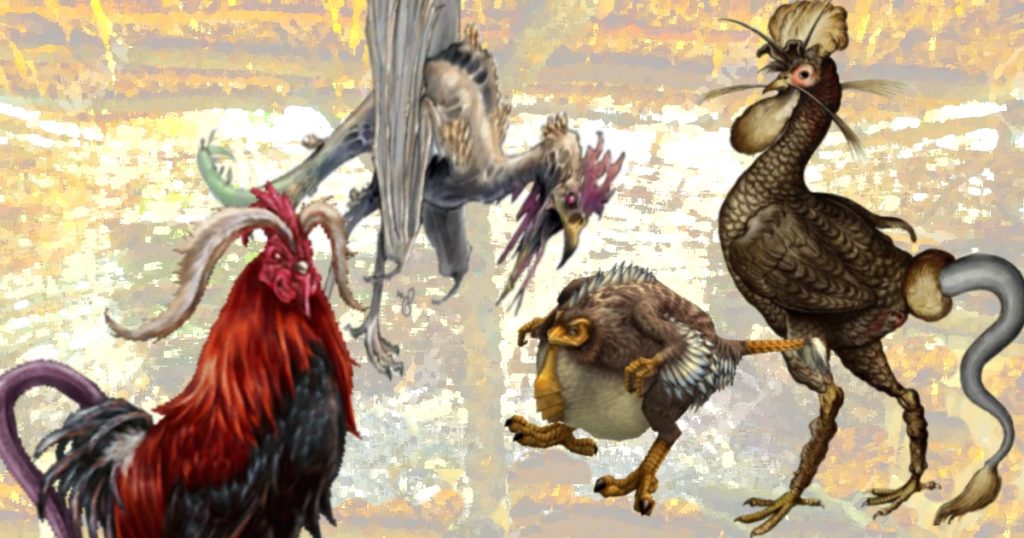
April 1200. Praxeas proposes an alliance
EXT. DAY. PNADAPETZIM
The pilgrims, Praxeas, a couple of eunuchs and the Nubian Chief are escorted on both sides by lines of armed Nubians. The ground is muddy with small puddles of rain water. At the head of each line a commander yells orders. At a cross road, the advancement of the group through the market is impeded by creatures carrying heavy loads. The core group stops. A Nubian line commander orders the Nubians to stop, one of them misses the command and bounces on the other, that line is broken, the other line keeps going and exposes the core group to creatures carrying loads. Loads fall, mud splashes.
A speck of mud lands on Praxeas face; he rolls his eyes in exasperation and gives a meaningful look to Baudolino. The Eunuchs and Ardzrouni just look amused at the whole happenstance. The Poet elbows away two Panotians and Kyot admonishes him. Rabbi Solomon makes the sign of the cross looking at the sky.
The core group continues walking and at a quiet corner of the market Praxeas tells Baudolino how much his leadership is needed. “After all, to these creatures, you are the most respected Magi,” he says ironically, “due to your friendship with the Deacon.” He emphasizes that the glory of defending Pnadpetzim and defeating the Magogs will surely impress Prester Johannes. He will then definitely provide the necessary support to reach the Realm. Baudolino looks at The Poet and Ardzrouni who nod in ironic agreement.
May 1200. The Deacon removes the veil
INT. DAY.DEACON’S PALACE
Praxeas and Baudolino enter the palace’s atrium. Seated on the raised edge of a fish pond, the Deacon waves at them to get closer. Praxeas invites the Deacon to a window and emphasizes the good progress of the military drills. The Deacon listens then dismisses him. Hesitating, Praxeas leaves the fuming censer by the Deacon who asks, “Is this Ardzrouni myrrh?”. Praxeas bows not responding, walks away reluctantly and stops behind a column of the atrium to watch and listen. The Deacon’s body language indicates that his senses are inflamed.
“Are we going to win over the Magogs?“ asks the Deacon looking down at the military training. “Deacon Son, the marvels I described to you earlier may not be always exactly as described,” explains Baudolino. “But I like to believe them true,” interrupts the Deacon. “So do I, but churches had been destroyed and rebuilt many times over,” continues Baudolino, “as religious wars persisted. Harmony did not come in spite of Abraham, Moses, and Jesus meeting in Jerusalem. But it’s not only religion. Under the guise of it there are mundane passions such as pride, power, or even love,” adds Baudolino. “We believe in the righteousness of the Realm, thus will win over the Magogs,” continues Baudolino further describing war siege machines, weaponry and taking fighting stances.
Impressed, the Deacon joins in the glorifying moment. “The glory of our mission will sanctify us!” he declaims, “and I will be able to join my immortal father,” he ads in a burst of emotional energy; exhausted, he slowly walks back to the fish pond and sits down. Baudolino is about to support the Deacon who stops him. Whispering, while looking in the direction of the column where Praxeas is, the Deacon asks Baudolino about life beyond war and religion. Baudolino recounts with embellishments, the Venetian people having fun at masquerades, his forbidden love to an unattainable lady, brags about the frivolous encounters in Paris, then describes the mysterious Middle Eastern beauties.
The Deacon’s body language indicates that his senses are inflamed. “So many beautiful things are forbidden to me,” he says raising his voice and looking towards the column. “Maybe even the truth,” he adds while contemplating the plume of the myrrh incense. He stands up and turns towards the big painting showing him as the handsome son of Prester Johannes. “More so, being a warrior and conquering the heart of a beloved one seems impossible,” he adds with a stronger voice. Suddenly, turning towards Baudolino he adds loudly, “Who do you think could love me,” and in a burst of distress, he throws off the veil off his face and hands; they are eaten by a horrific leprosy.
1200 July. Hypatia defies the monsoon.
EXT.DAY. WATERFALL LAKE
At sunset, Hypatia and Baudolino walk side by side along the edge of the forest. “I am more curious about you than you should be about me,” Baudolino says playful. “You tell me first, why you are here,” Hypatia argues friendly. “We traveled many years through places where people believe in one God, then many gods,” recounts Baudolino with a sigh, “one Allah with ninety-nine names, a God and Evil in continuous fight for dominance, in one with no God or gods, just inner enlightenment. But we are Christians,” concludes Baudolino, “seeking an end to war, an alliance with Prester Johannes from the realm of the Universal Religion.” Hypatia had stiffened and stopped walking, hearing the word Christians. Heavy clouds cover the setting sun. “Religion universal? Who’s “universal”, yours?” she asks bewildered. “Your people killed Hypatia,” she adds with distaste. “No…well yes,” hesitates Baudolino, “it was more like the politics of power, not religion” he manages to conclude. “It was between the power of reason against that of religion,” she states firmly walking ahead by herself. Baudolino follows after a while, but there is silence between them.
They are still silent while seated on a tree trunk. “So many Gods and gods,” says Hypatia, thoughtful. The rising wind brings heavy clouds, and thunders strike faraway. They both look at the sky, and Hypatia stands up. “We need to help God. God needs a redemption!” she says raising her voice to cover a thunder strike and sudden gust of wind. Baudolino gets up and almost angry contests: “What do you mean? We need a redemption because we had fallen short of our duty for goodness. The Holy Spirit permanently emanates, emanates just goodness.” “You think that God emanates?” she argues sternly, “God did not create us, we had created Him.” Thunders strike all over, one close by, a tree catching on fire in the forest. The wind blows stronger and a rain storm starts. “Why does he need to define the good and bad for me, make me be good for the promise of heaven or live in fear of being wrong,” she says angry, then pausing to catch her breath, and adding calmer, but assertive, “I had eaten the fruit of the Tree of Knowledge. I want to decide by myself what’s good and bad.” She raises her head in defiance of the storm and pouring rain. “There is permanence of Chaos and Order out there,” she says pointing to the sky. “There is Life and Death here,” she says pointing to the ground. We transcend trough life and death towards the Philosophy of One, a mindset of knowledge and collective consciousness,“ she concludes forcefully, then walks into the forest. Speechless again, Baudolino is drenched by the pouring rain.
September 1200. Baudolino gives up love.
EXT.DAY. WATERFALL LAKE
Late in the afternoon, Baudolino exits from the canyon and stops at the water line. The whole lake area is inundated. He advances few steps into the water and looks at the stronger waterfall flow, then at the forest’s trunks covered by the water. “Why am I here, waiting again…he thinks, “…and in vain. Losing sight of Otto’s vision, the promises to my good fathers? Is love the universal language?” he wonders. Where is the Realm?” he wonders looking at the flooded area and vast space beyond. He picks up his flute from the bag and plays a military march tune. He then turns around and disappears into the canyon.
EXT.EVENING. HIGH PLATEAU
From the top of the plateau, Baudolino watches the faraway line of the mountains projected against the dark blue horizon. At their base there are minuscule specs of camp fires. He yanks the mule towards the city. The donkey utters victorious sounding brays.
October 1200. Military training in Pnadpetzim
EXT.DAY. TALL GRASS VALLEY
The backs of the running cyclops cut through the tall grass. “Lower, lower!” yells The Poet, “they should not see you.” Curious, Baudolino stops to watch. The cyclops stand-up to stretch, see Baudolino and start complaining to him about their back pains. Their hands are dirty with muck and the faces have splotches of it. The Poet yells again “Down, down, sending the donkey now!” and signals to someone. The cyclops go down annoyed then start struggling to topple the running donkeys. The skirmish moves away with the cyclops’ shouts and donkey’s braying.
EXT. DAY. PNADPETZIM
Baudolino walks through the market where Ardzrouni places fake horse heads, with horns and bats’ wings onto the Blemmyes shoulders. “Tighten the straps!” instructs Ardzrouni while helping one to do so. On the side, other Blemmyes build more heads from a pile of straws and willow branches. “They’ll pop up from the grass, Magogs’ horses will buck, Magogs will waste the arrows on the fake head, enough time for the courageous Blemmyes,” he adds giving them an encouraging nod, “to stab the horses, pull down the Magogs”.
EXT. DAY. FERN VALLEY
A shadow passes over Baudolino’s face and he looks up; he ducks at the sight of a Blemmyae, gliding with his ears fully extended; too late though, the Blemmyae land crashes on him.
Pygmies blow darts from fistulas into running cockatrices. Some arrows hit them but they keep running unaffected, darts flopping. One pigmy says proudly, “I great fighter!” Some of the running birds cut through a group of Nubians fighting with swords and spears.
November 1200. Hypatia wants Baudolino
EXT.DAY. PNADAPETZIM
Baudolino walks with Praxeas and the Poet inspecting lined up defense materials and military weapons. The Nubians expertly practice sword and spear fighting. Groups of creatures orderly practice military drills.
Gavagai joins the group and discreetly nods at Baudolino. Baudolino acknowledges and points at a pile of spears, asking the Poet to show them to Praxeas. “We need to inspect Rabbi Solomon’s reserves of vials with poison,” he tells Gavagai pulling him over. When they are alone, Baudolino asks, “Was she there this time?” “Yes, and she will return, want much to see you,” responds Gavagai, then quoting Hypatia with a sly smile, “every day, every day!” Baudolino embraces Gavagai ignoring the irony.
November 1200. The meeting of the minds
EXT.SUNSET. WATERFALL LAKE
Facing each other, Baudolino and Hypatia hold hands. The sun is about to set behind the mist at the top of the fall. The rainbow arches above their heads and butterflies fly. Looking into each other eyes, they lower their heads to touch and share their thoughts: “ So beautiful she is… things she told me beautiful… some terrible… “ “…terrible things I told him…learned in generations, … in tranquility.”
They walk hand in hand closer to the waterflow, Hypatia gently caressing the ivy flowers, thinking “…the nature’s beauty…” and watching the flight of the butterflies, “…new life born …” while touching withered flowers, “… from death… good and bad born from each other, harmony and chaos of the nature in permanent transformation… “ “We have to connect with all of these,” she says extending her arms, “rivers and forests and mountains and birds, the earthly nature, the Sun and Moon and the stars in the sky and the unknown beyond. She stops to look at Baudolino then at the evening sky. “That’s where the origin of it all is, that’s what we have to know and connect with.” That’s the Philosophy of One, that’s what universal is.”
Hypatia stride is smooth as if she’s floating over the grass; her long, white hair sways in the night’s breeze and radiates a moonlight aura. Crickets and birds fill the night with harmonious sounds. They arrive at a clearing where the moon rays shed the trees’ shadows. Colorful, phosphorescent mushrooms and moss glaze on the ground and trees’ trunks, and fireflies twinkle. The hairy donkey playfully muzzles the unicorn Moriba. Baudolino sees them and scratches his head, amused: “So, how about the origin of our feelings, my dear teacher?” asks Baudolino. Hypatia had followed his gaze, smiles and steps closer to touch her front with his, “I don’t know what the feelings I have now are. Is this love? It feels divine…but not like the harmony of tranquil…she thinks and steps back, “..more like…getting a soul and losing my mind?” Maybe the feelings start when the mind stops, she says. The moon rays highlight the contour of her small breast through the thin fabric of her blouse. “My mind just stopped,” says Baudolino. She extends her hand to touch, then caress his cheek. Baudolino breathes harder but remains motionless. She lowers her hand to reach under his blouse. “I need to touch him,” she thinks and pokes Baudolino’s cheek innocently, with the tip of her tongue. Baudolino shudders, embraces her and presses a kiss on her lips. For a moment she doesn’t know how to respond, but surrenders overwhelmed by unknown emotions. Baudolino pulls up her blouse then unties her skirt which falls down. She pulls up his shirt. He looks at her breasts. He steps back to look at her midriff, then at her long legs, covered by a fine, short, reddish fur, ending in delicate hoofs. He looks into her eyes and at her frown of concern. He embraces her lovingly, touching her front with his.
December 1200. Skiapods have hot feet, cool head.
EXT.AFTERNOON.HOPES HILL
Praxeas with a couple of Eunuchs, Baudolino, Ardzrouni and the Poet oversee the military exercises from the height of the Hopes Hill. Few Skiapods lay on their backs, feet raised against the sun. At the base of the hill, Nubians practice grouping and deployment in squads and platoons. A plume of dust rises from Pnadpetzim, where creatures build low barricades of wood trunks and stones. In the Fern valley, creatures orderly run military drills. Farther away, in the Tall Grass valley, Messalians signals with plume of white and black smoke from the tall, rebuilt hovels. Breathing hard from running, Gavagai joins the commanding group and admonishes the Skiapods for shading themselves: “Get up and run!”. The Skiapods talk back: “Sun gives power, foot gives shade. Hot feet, cool head.” “Charge morning iz sufficient!” he argues, “go run to hovels and back ten times.” He meets Baudolino’s appreciative stare and winks: “Iz punish what you do when upset?” “Yes, and fun to stave it,” responds Baudolino laughing.
At the base of the hill, Nubians practice grouping and deployment in squads and platoons. A plume of dust rises from Pndapetzim, where creatures build low barricades of wood trunks and stones. In the Fern valley, creatures orderly run military drills back and forth. Farther away, in the Tall Grass valley, Messalians signals with plume of white and black smoke from the tall, rebuilt hovels. Breathing hard from running, Gavagai joins the commanding group and admonishes the Skiapods shading themselves: “Get up and run!”. The skipods talk back: “Sun gives power, foot gives shade. Hot feet, cool head.” “Charge morning iz sufficient!” he argues, “go run to hovels and back ten times.” He meets Baudolino’s appreciative stare and winks: “Iz punish what you do when upset?”. “Yes, and fun to cure it,” responds Baudolino laughing.
December 1200. The bucks could fight too
EXT. NIGHT. PNDAPETZIM
Later in the evening, returning from the hill, the commanding group has to quickly give way to a herd of bucks with many, small torches on their long horns; the bucks are herded by few Panotian women. Kyot is running along, but The Poet grabs his sleeve to stop him: “What’s that now?” “If they attack at night, the torches will look like a lot more of us attacking,” Kyot responds proudly. “No way, they’ll set the field afire,” says The Poet. “Well done Kyot,” contradicts Baudolino, and turning to The Poet, “we may need them as a line of defense.” The discussion is interrupted by a Skiapod skidding to stop, breathing hard and barely able to whisper forcefully: “Zey here, attack now!”a
The group hastily runs back to the hill. The herd is driven aside, and the creatures run for cover. Under the moonlight, Pnadpetzim is silent.
January 1201. Magogs attack
EXT.MORNING. HOPES OBSERVATION POST
The first sun rays appear at the horizon, behind the faraway mountains. On the observation post, The Poet stands guard gazing at the horizon, sleepy, barely keeping his eyes open, hands holding on a tall bolder to keep himself steady. Ardzrouni and Baudolino lay down on the ground, sleeping. The silence is broken only by insects buzzing and birds chirping. There are no plumes of smoke coming from the Magogs’ faraway camp.
EXT.MID-MORNING. HOPES OBSERVATION POST
The sun has risen in the sky. The Poet sleeps on the ground. Gavagai and two other Skiapods rest in the shade of their big feet raised against the sun. Scrutinizing the horizon, Ardzrouni whispers to Baudolino: “Maybe just as usual, they show-up but don’t attack.” “Why do you whisper?” asks Baudolino. “They’re coming!” shouts The Poet, his ear to the ground. The Skiapods jump up, alert. Ardzrouni looks towards the horizon then at his feet, “I feel them too,” then at the distant hovels, “Why there is no signal?” he asks agitated. “Brave Skiapods! Alert!” orders Gavagai. “Check the Messalians,” adds Baudolino.
MID-MORNING. TALL GRASS VALLEY
The Messalians slowly come up from the torpor of the morning siesta; they look down at the galloping Magogs as arrows fly by their long necks. Moving slowly, they manage to lit the signal torches. In the meanwhile, the Magogs had significantly advanced towards the tall grass and fern valleys.

First line of defense: Cyclops and Skiapods
Knelt down, the cyclops see the feet of the Skiapods raising against the sun through the tall grass; but they feel the ground trepidation and look up. There is no smoke coming from the Messalians’ hovels, but the Magogs are approaching. The cyclops look at each other concerned. Two of them hurriedly crawl on all four towards the Skiapods’ lineup. “You meat-mouth pagans, get up!” one whispers forcefully. The Skiapods respond offended, “You call us pagans, you cheese-mouth heretics?”. “Heretics?” yell the cyclops standing up, grabbing the bats and hitting the Skiapods’ legs. The Skiapod messenger arrives and yells, “Magogs are attacking!” Some Skiapods start fighting with the cyclops while others strap the big shields on them and hop vigorously towards the Magogs. The ferocious figures painted on the shields hop up and down from the tall grass.
The Magogs’ horses slow down and rear frightened; the line of attack is broken and some Skiapods hop through it. Some Magogs turn their horses around and shoot arrows on the Skiapods’ shields. Other Magogs advance towards the scuffle and stop first, puzzled, then sack the tall cyclops with their swords and arrows.
Some cyclops grab the Skiapods by their foot and, using them as bats, hit the Magogs off their horses then stab them. The Skiapod messenger witnesses the massacre and, horrified, runs back to the Hopes Hill observation post.
MID-MORNING. HOPES OBSERVATION POST
“We stopped them!” yells The Poet looking at the faraway fight in the fern valley. “Cannot see well,” says Ardzrouni, “some fall but not many.” The Skiapod messenger arrives and breathing hard tells them about the cheese-mouthers cyclops killing the good and loyal Skiapods. “Not different, not different, arghhh!” wails The Poet in desperation, head in hands and giving Gavagai an incriminating look. A gust of high wind hits the observation post. Gavagai is about to say something but nothing comes out of his mouth.
MID-DAY FERN VALLEY
Second line of defense: Blemmyaes and Pygmies
In smaller numbers, the Magogs regroup then restart charging through the ferns.
The Blemmyes prop fake heads pop-up from the ferns. Magogs’ horses rear but the Magogs skillfully keep shooting arrows. Fake heads fall off under the arrows’ volleys and Magogs lower their arch bows surprised by the sight of the headless creatures.
A strong volley of darts from the pygmies’ blowpipes, coming from under the thicket of the ferns’ leaves, hit Magogs’ horses; those hit blink sleepy, lower their heads and wobble for a moment. Suddenly thereafter, they jump up high, run erratically and throw the Magogs off the saddles. The Blemmyes attack the other horses with spears while the Magogs throw arrows. In yet smaller numbers, the Magogs regroup and restart their charge; the pygmies’ and Blemmyes’ defense line is broken though.
Third line of defense: Panotians land on Magog heads
The Magogs gallop their horses towards the narrow straight bordering the city. From its heights, helped by upward air streams, Panotians glide down choosing their targets. Landing on, they clasp Magogs’ heads and fall together on ground. A couple of Panotians flapping their ears for too long, in looking for a target, fall to the ground.
Kyot prepares the goats with torches
MID-DAY HOPES OBSERVATION POST
“They are still in large numbers, Pnadpetzim will fall,” says Baudolino. “Maybe not,” argues The Poet. “Look!” he says pointing at the distant group of creatures running from the previous defense lines towards the Magogs. He then asks Gavagai to run urging Kyot to deploy the goats. Gavagai is about to run but Baudolino stops him. “Run to the lake, tell her to wait for me,” then signals to another Skiapod to run to Pnadpetzim. The Poet looks reproachfully at Baudolino. Gavagai hops with difficulty towards the lake, against the swirling wind.
The fourth line of defense: The Nubians get what they want
AFTERNOON. STRAIT TO PNADPETZIM
Magogs reach the nubians line of defense. Instead of fighting, the nubians throw themselves at the horses’ feet imploring to be killed, and they are sacked.
The goats defend Pndapetzim
AFTERNOON. STRAIT TO PNDAPETZIM
Torches shake on the running goats’ horns. A large herd runs through the dry brush. A group of Panotian women shout to deploy them on a larger front. The brush gets afire and the wind blows the smoke towards the Magogs. The creatures running from the defense lines are about to attack the Magogs from behind.
Smoke, coffers and precious stones.
AFTERNOON. HOPES OBSERVATION POST
Ardzrouni exults: “Look we are attacking them!” The white smoke rapidly expands over the strait and covers the battlefield. The commanding pilgrims look at each other weary. Kyot comes running up to the top of the hill and brags about the success of his goats. The pilgrims are in disarray though. Looking towards the battle field they see the Magogs coming out of the smoke laterally, galloping in a circle while shooting arrows in the middle of it. The Poet nudges Ardzrouni, “Let’s grab the stones before it’s too late.” Gavagai hops up the hill and whispers to Baudolino’s ear: “She’s safe, ran away with sisters.”
Baudolino’s attention is drawn by Praxeas and a group of Eunuchs hurrying on a lower trail. They have big coffers loaded on the hairy mules. “The Deacon is dead. We’re leaving. Will set the avalanche in the passage to the Realm,” shouts Praxeas “Does the Realm exist?” ask Baudolino, but Praxeas carries on without responding. “I am following them to join my brothers. The tribe of Israel went that way,” Rabbi tells Baudolino.
Baudolino looks at Pnadpetzim, then the fire and smoky battlefield. The Magogs keep circling and throwing arrows in the middle of it. He then turns in the direction of the faraway water fall where he was meeting with Hypatia, then in the opposite direction, wherefrom they arrived to Pnadpetzim.
February 1201. Fishing boats on Brahmaputra
EXT.MORNING. BRAHMAPUTRA SHORE
Early in the morning, back at the spot where they were washed ashore six years ago, Baudolino, The Poet and Ardzrouni wave and yell at a fishing boat floating on a faraway stream of the Brahmaputra river. A strong wind blows towards them, and the fishermen in the boat do not hear. The Poet yells at the blowing wind to either stop or blow the other way.
EXT.SUNSET. BRAHMAPUTRA RIVER
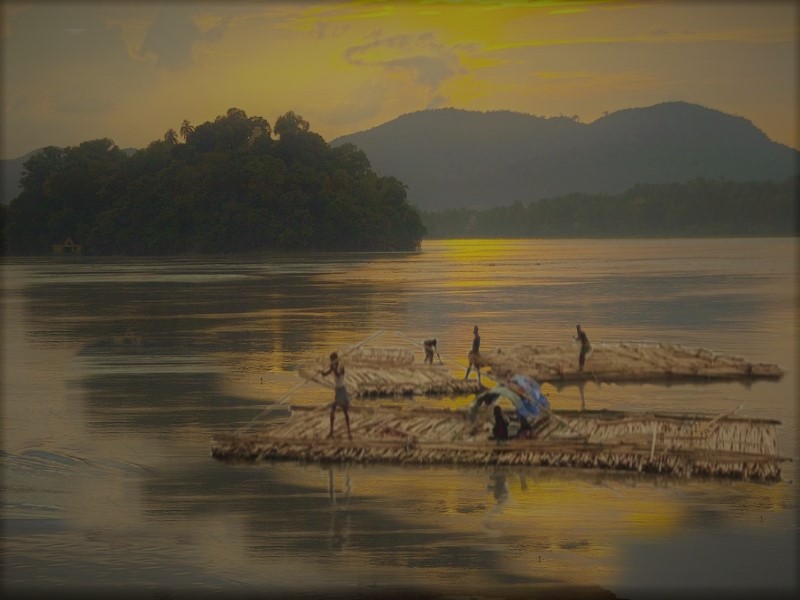
At sunset, the pilgrims swim desperately towards a fishing raft approaching on the stream closest to them. The INDIAN FISHERMAN steer the raft.
February 1201. Arriving at Chattogram on a fishing sail boat EXT.MORNING. BRAHMAPUTRA DELTA AT CHATTOGRAM
At sunrise, Baudolino, The Poet and Ardzrouni wake up on the fishing sail boat. Still sleepy, Baudolino watches the swarm of fishing boats and the shore of Chattogram; on it, some PEOPLE carry loads, others walk along or ride on elephants.
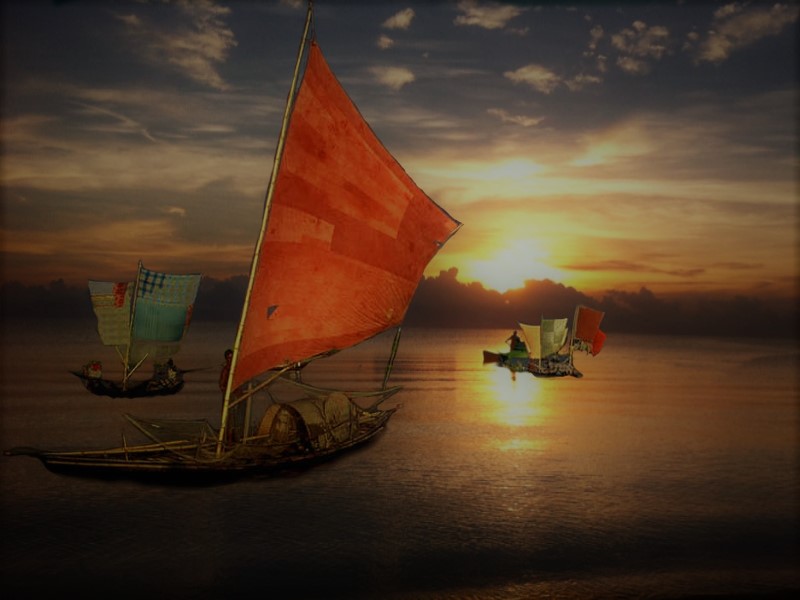
July 1201 Trading meteorite stones on a Chinese Junk boat
EXT.NOON. ANDAMAN SEA

The Chinese Junk boat is still. There is no wind, and the sea is flat; the sails, flags and banners are also still. The CHINESE CAPTAIN, on the deck by the tiller, scrutinizes the sky and the sea all around. A couple of CHINESE MERCHANTS fan the sweat off from under their hats. Baudolino and Ardzrouni lay down in the shade of the sail. The Poet, half way under the scorching sun wakes up and moves in the shade. “Who do I have to ask for the wind to blow?” he asks looking at the sky; then at Baudolino asking why did they have to sail South when home is somewhere in the North. Baudolino opens just one eye, “Captain said, best trade route and monsoon winds.” “And our precious stones to his coffers,” mocks Ardzrouni lazily.
December 1201. The Cog pitches and the spices smell
EXT.EVENING. ARABIAN SEA
The Cog ship yaws and pitches. The tempest’s waves flood the stern and drench the ARAB CAPTAIN; he grips on the steering wheel and yells orders to the crew. Baudolino and Ardzrouni are thrown from starboard to port, fall on the deck and crawl struggling to get under the quarterdeck. Baudolino helps Ardzrouni. Down in the cabin, Ardzrouni complains about the sea sickness. The Poet complains that the heavy smell of the spices gives him a terrible headache. “Inherited them from Kyot, I guess, may the Panotian woman cure him,” he says.
Ardzrouni and the Poet are asleep in their bunk. Baudolino, a stack of his parchments on the side, sits on the bed thinking about what to write. “…looking for unity in belief and found it in love…United myself with Hypatia, so much different and…alike? God teaching me something about the soul or mind?”
July 1202. The flying fish loses its scales
EXT.EVENING. ARABIAN SEA
On the deck of the Greek trading ship, Ardzrouni and The Poet sit crouched and argue with a Muslim and Venetian trader. Neither seem to be impressed by the meteorite stones. A BUDDHIST MONK next to them meditates impassible. Laying down on a rug, Baudolino turns his head away from the merchant’s group, annoyed. He watches a flapping banner for a while, his mind wandering from…Constantinople shining in the rising sun to …the setting sun behind the waterfall and the lake where he met Hypatia…He dozes off watching the banner flapping in the wind which …morphs into a flying fish jumping out and diving into the sea. The fish grows bigger and bigger while circling the ship closer and closer to Baudolino. Baudolino grabs one of the fish’s wings and jumps on his back.There is a long journey of flying day and night over the desert’s dunes. Under the scorching sun, the fish’s scales gradually fall off, and it loses altitude to Baudolino’s horror who……wakes up sweating and yelling. The merchants look at him startled. The Greek Captain shouts “Barbarikon on starboard,” and orders to the crew to lower some of the sails. The ship enters the harbor; farther inland, dwellings are clustered around the stone walls of a city and spread along the river bank.
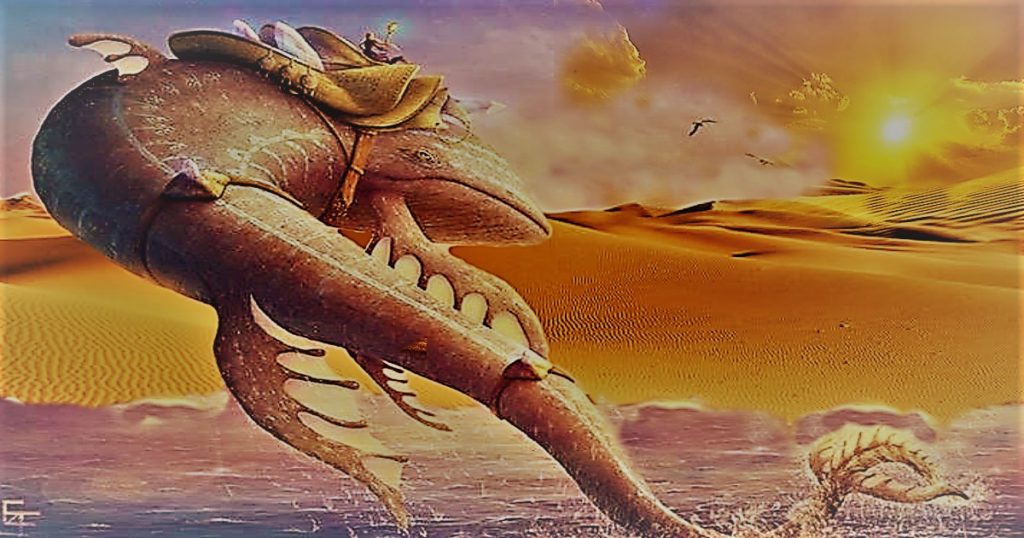
August 1202. Sand storm in Barbarikon
EXT.DAY. BARBARIKON MARKET
Makeshift food and merchandize stalls and tents border the narrow bazaar street. Their tarps flutter in the wind. Baudolino, Ardzrouni and The Poet elbow other people to advance in the crowd, at times stopping at stands. At some, white or black women or slaves are bargained for. One merchant stalks Baudolino grabbing his sleeve and showing off a coin: “Alexandros of Macedon,” the man keeps saying,” Punjab victory, Indus fleet victory!” The Poet looks quizzically at Baudolino: “You said that Alexander the Great got to Ganges!”. “Boron said that Ptolemy wrote that,” responds Baudolino defensively. The wind blows a gust of sand and the merchants wrap up scarfs around their heads. Some wrap up the tarps of the stalls. “The two of you, both, inflamed minds,” manages The Poet to yell, fighting the storm, taking the merchant’s coin and paying for it in a hurry.
INT.DAY. BARBARIKON HOUSE
The pilgrims dust themselves off. Ardzrouni points at a rudimentary map on the wall: “It may be quicker, but not easier. Better sail to Cairo, then on Mediterranean Sea to home,” he says. “I do not know what home is,” says Baudolino, sad, “maybe I’ll stop in Jerusalem, in memory of my father. Or settle in Constantinople.” “Constantinople it is, it’s richer than any city in Europa,” advocates the Poet.
December 1202. Sailing to Ain Sokhana, then traveling to Cairo
EXT.EVENING. BARBARIKON PORT
It rains heavily. The pilgrims make their way on the narrow plank onto the Arab ship. SLAVES carry loads to and from the ship. One slave slips, falls and pulls two others in the water. “Four month the get on this ship, and how many more to Cairo,” mutters The Poet from the deck, looking at the ropes thrown by the CREW MEN to save the slaves.
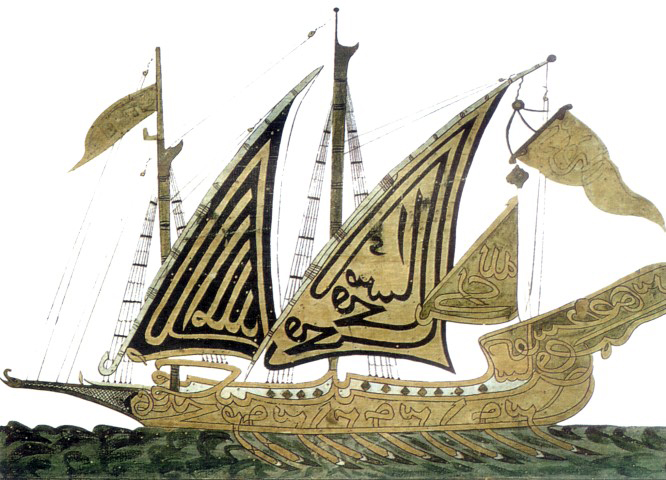
August 1203. The Nile Valley is flooded
EXT.AFTERNOON. NILE VALLEY
The caravan joined by the pilgrims advances through the flooded Nile Valley. The Sun setting between the pyramids glimmers on the surface of the water. Baudolino and Ardzrouni are fascinated by the view. The Poet is fed-up, “More water, water? I thought we’d be in the desert!”. They go by a group of COPTIC PRIESTS and WORSHIPERS chanting and throwing things in the water. In the distance, the walls of Salahuddin Ayyubi’s Citadel, its tall mosque turrets and cupolas’ shrines are projected against the soft light of the sunset. The colors of the sky blend in hues of blue to red, and the sparse, gray clouds, are lined up by orange and white. People and caravans travel to or come from the city.
September 1203. Cairo, the City of Saladin
EXT.AFTERNOON. CAIRO
Inside the Citadel, in a large courtyard, fabrics, copper pottery and various artifacts hang inside the richly decorated stalls and tents. PEOPLE and MERCHANTS bargain. The pilgrims and TWO ARABS sit crouched on a rug, under a tent. Small piles of jewelry and coins are in front of each. Ardzrouni and The Poet have their piles of meteorite stones. They drink from small cups replenished by TWO WOMEN with faces covered by niqabs. The Poet eyes them intently and invites them to pour more drinks. “But is it safe to travel to Jerusalem?” asks Baudolino. “It is a time of peace for us, your Queen Isabella of Jerusalem and her husband King of Cyprus have a truce with our sultan. It is good for trade, good for trade. Years of bad luck, bad earthquake and no floods, no water. Now all very good, very good,” emphasizes the merchant nodding. A VEILED WOMAN stops to look at the jewelry on the rug, then for a while at the Poet. The Poet catches on. The woman drops her head first, looks up at him again then leaves; the Poet watches her disappearing into the crowd. In the meanwhile, Ardzrouni keeps emphasizing the values of the stones of God, Tears of St. Lawrence from the sky, and inviting the merchants to look at the delicate pattern of shiny metal and amber light. The bargain continues while Baudolino stretches, lays down on the side of the rug and rests his head on a pillow, uninterested. He looks up at the oriental decoration on the tent’s cover: two griffins drinking from a flaming cup. The Egyptian woman who left earlier comes by again, looks at the Poet then leaves with a discrete, inviting sign to follow. The Poet stands up and leaves following her through the market crowd.
Baudolino dozes off while looking at the griffons…one of which flies off the tent’s cover and, after circling the courtyard, lowers itself by Baudolino who gets on its back. They fly over the Nile, desert land, the shore of Mediterranean, then inland. Baudolino rejoices at the sight of a fortress with tall towers and minarets and shouts at the griffon, “Down, down to Jerusalem!”
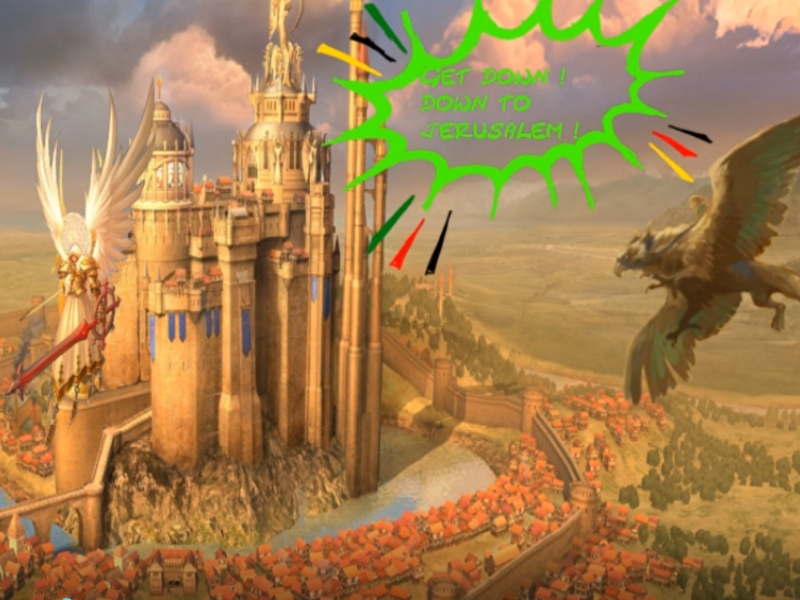
The big, golden statue of the angel defending the city morphs into an Archangel who flies up towards Baudolino and the griffon. She is Hypatia who, clad in a heavy armor and graciously flapping enormous wings, asks Baudolino: “Why do you want to see the things of heaven when you do not understand the things of earth? Go to Constantinople to learn.”
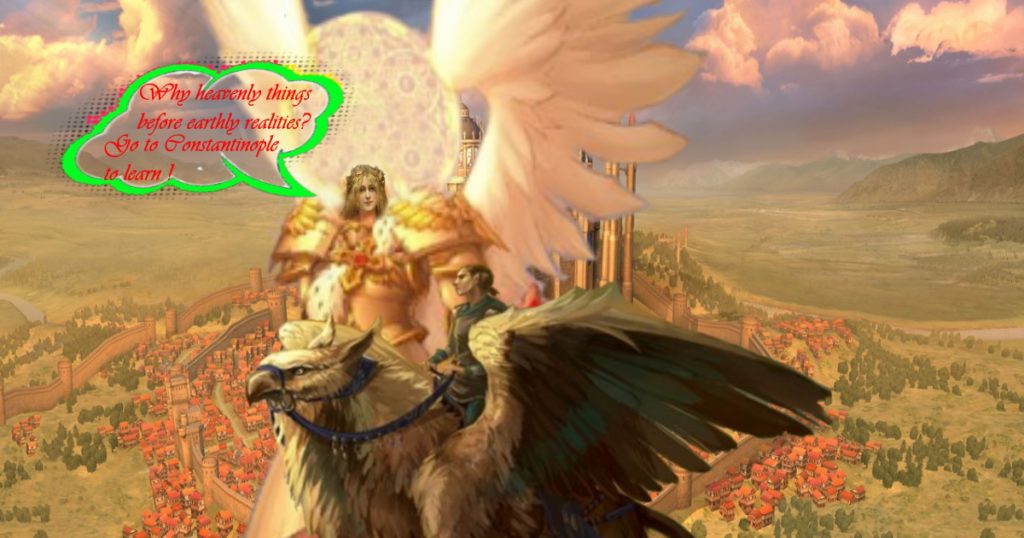
The griffon flies on and approaches Constantinople aflame under the Fourth Crusade attack by Venetian ships and Western Holy Roman Empire army. The griffon circles the walls of the city while Baudolino, horrified, looks down at the fierce fighting.
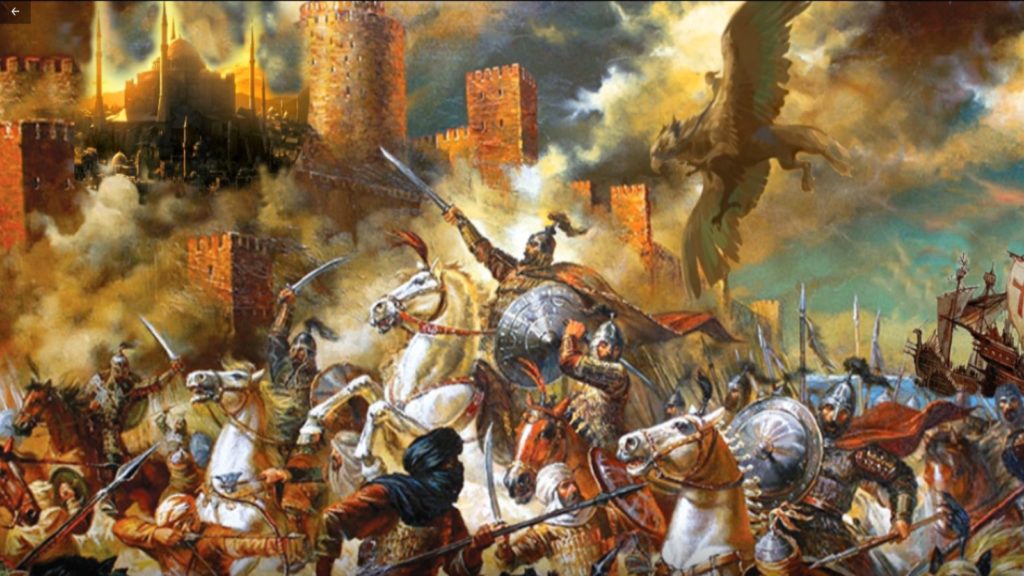
April 1204. The Fourth Crusade sacks Constantinople
EXT. MORNING. CONSTANTINOPLE
Baudolino writes facing the open window overlooking burned down houses, plumes of smoke, the broken tower of a minaret and the dome of the Saint Sophia church in the distance. The dome is gray under the heavy clouds covering the sky. He writes, “…arrived in Constantinople on April of 1204. Jerusalem, a land of religious tolerance, was spared by luck on the Third Crusade, Constantinople sacked by religious intolerance of the Fourth one. Or just by greed in the trade wars.” He stops writing and thinks:,“I imagined beautiful places, I see the horrible reality. The Archangel wanted me to see the reality. But should I consider the reality or my perception of it? Esse est percipi!” he concludes. As he pensively looks at the destroyed city, …a sunray breaks through the clouds and lights the dome of Saint Sophia, turning on its golden splendor. The burned down houses restore themselves to their white beauty adorned with flowers. The broken minaret tower rises back into the sky. On the road, a group of women draped in colorful dresses blown by the wind approaches the house. Hypatia walks in front of them smiling; a toddler, FOUR-YEAR-OLD BOY, jumps around barefoot on the cobblestone.
END
© 2016 Reelwindows, All Rights Reserved
Copyright © 2016 ithinkiam. All Rights Reserved.